

77 Positive and Inspiring Journey Quotes
Embark on a journey of a lifetime with these inspiring journey quotes. Life’s a thrilling ride, filled with ups and downs.
It’s about braving the storms and cherishing time spent with loved ones.
So whether your path is spiritual, an exciting travel adventure, or just starting something new in life, let these quotes fuel your spirit for exploration and discovery.
Journey quotes to begin your path towards greatness
1. “Never give up on your dreams, no matter how painful and difficult your journey is.” – Lisa
2. “The journey is never ending. There’s always gonna be growth, improvement, adversity; you just gotta take it all in and do what’s right, continue to grow, continue to live in the moment.” – Antonio Brown
3. “The journey of a thousand miles begins with one step.” – Lao Tzu
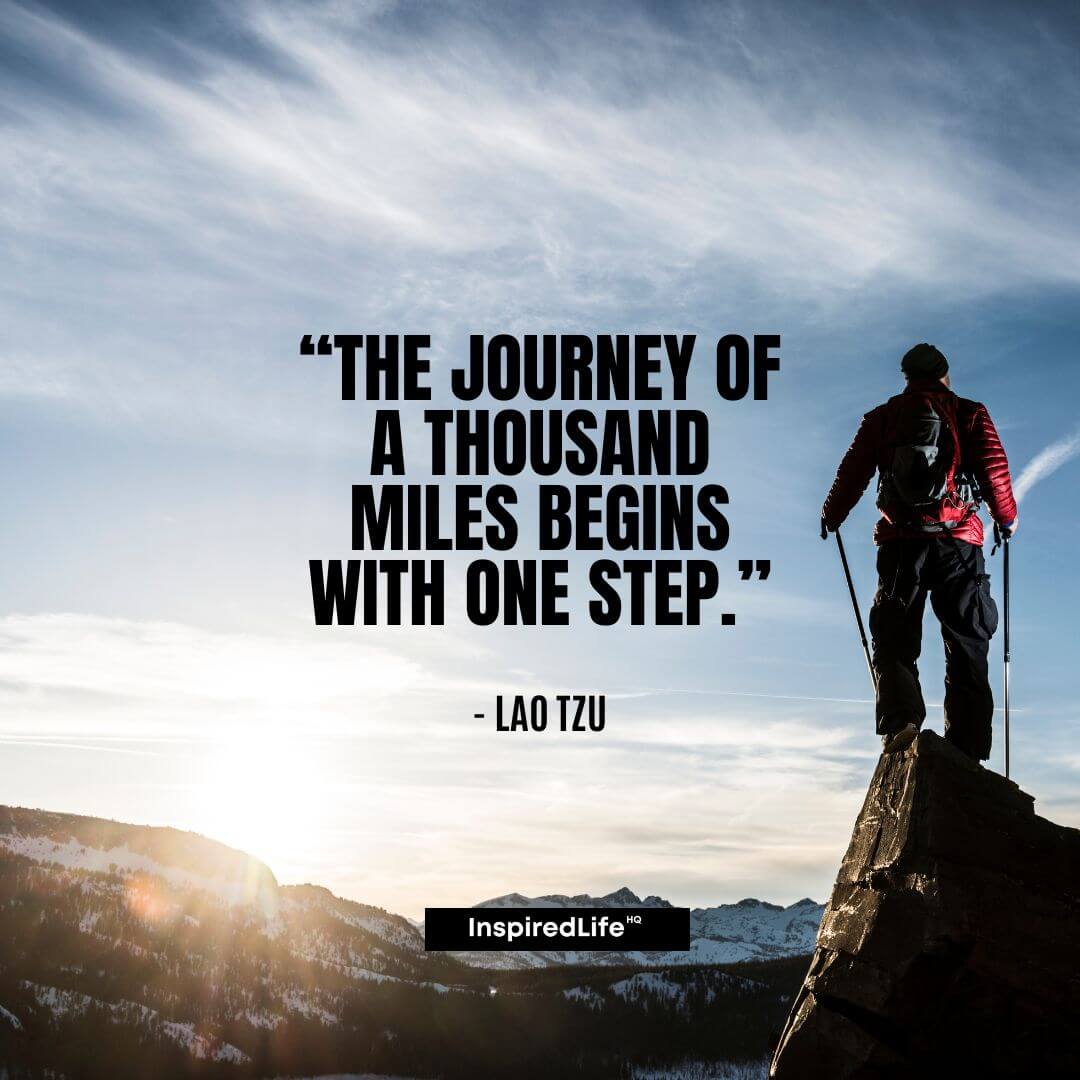
4. “Sometimes its more about the journey than the destination.” – Jamal Crawford
5. “Success is a journey, not a destination. The doing is often more important than the outcome.” – Arthur Ashe
6. “Focus on the journey, not the destination. Joy is found not in finishing an activity but in doing it.” – Greg Anderson
New journey quotes to inspire your success
7. “Not all those who wander are lost.” – J.R.R. Tolkien
8. “Sometimes it’s the journey that teaches you a lot about your destination.” – Drake
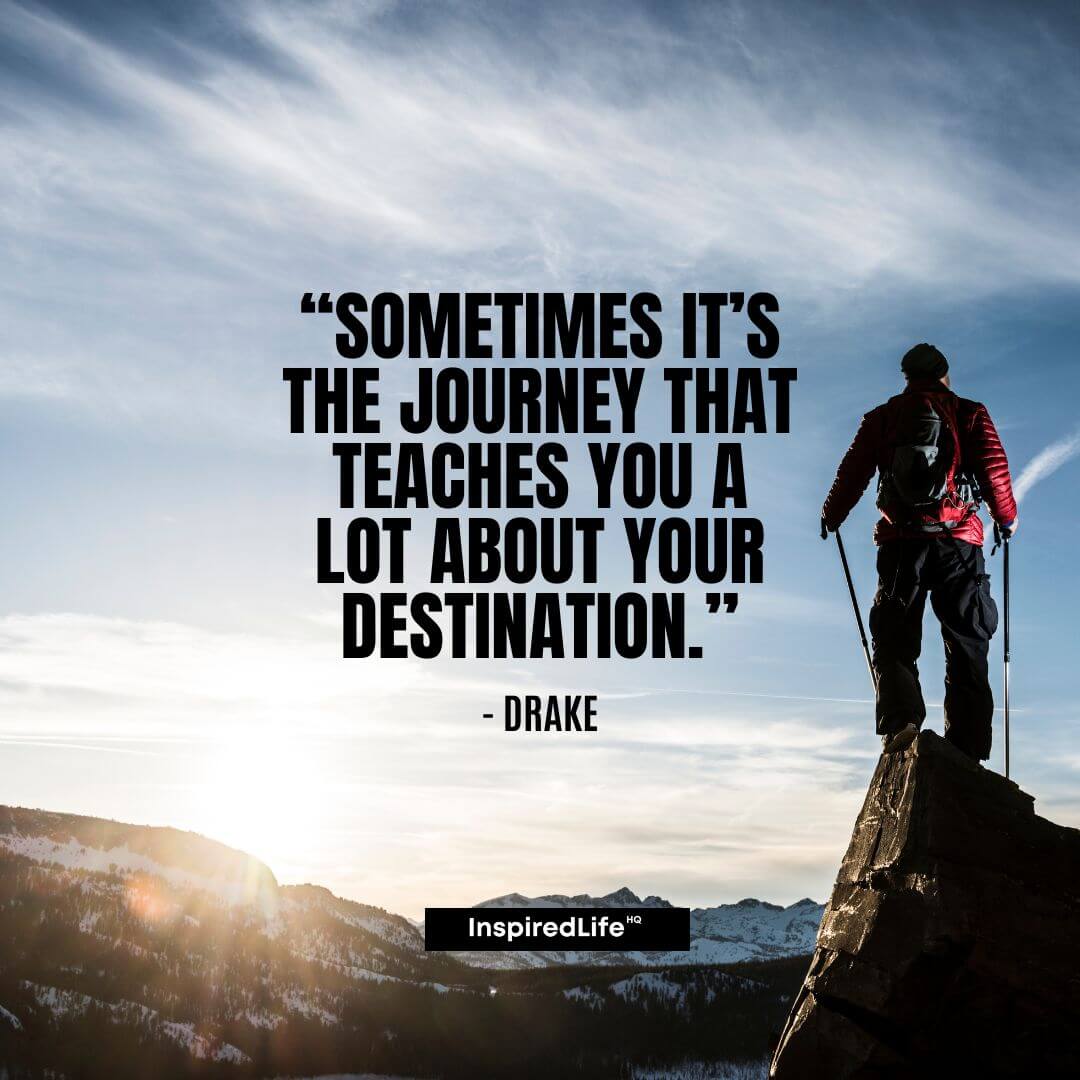
9. “Sometimes we make the process more complicated than we need to. We will never make a journey of a thousand miles by fretting about how long it will take or how hard it will be. We make the journey by taking each day step by step and then repeating it again and again until we reach our destination.” – Joseph B. Wirthlin
10. “Enjoy the journey and try to get better every day. And don’t lose the passion and the love for what you do.” – Nadia Comaneci
11. “Struggle teaches you a lot of things, and I am happy that I witnessed a roller coaster ride. The journey has improved me as a person and made me more matrure.” – Manoj Bajpayee
12. “Life is short and we have never too much time for gladdening the hearts of those who are traveling the dark journey with us. Oh be swift to love, make haste to be kind.” – Henri Frederic Amiel
Life is a journey quotes
13. “Life is a journey that must be traveled no matter how bad the roads and accommodations.” – Oliver Goldsmith
14. “Two roads diverged in a wood, and I took the one less traveled by, and that has made all the difference.” – Robert Frost
15. “Learn to trust the journey, even when you do not understand it.” – Lolly Daskal
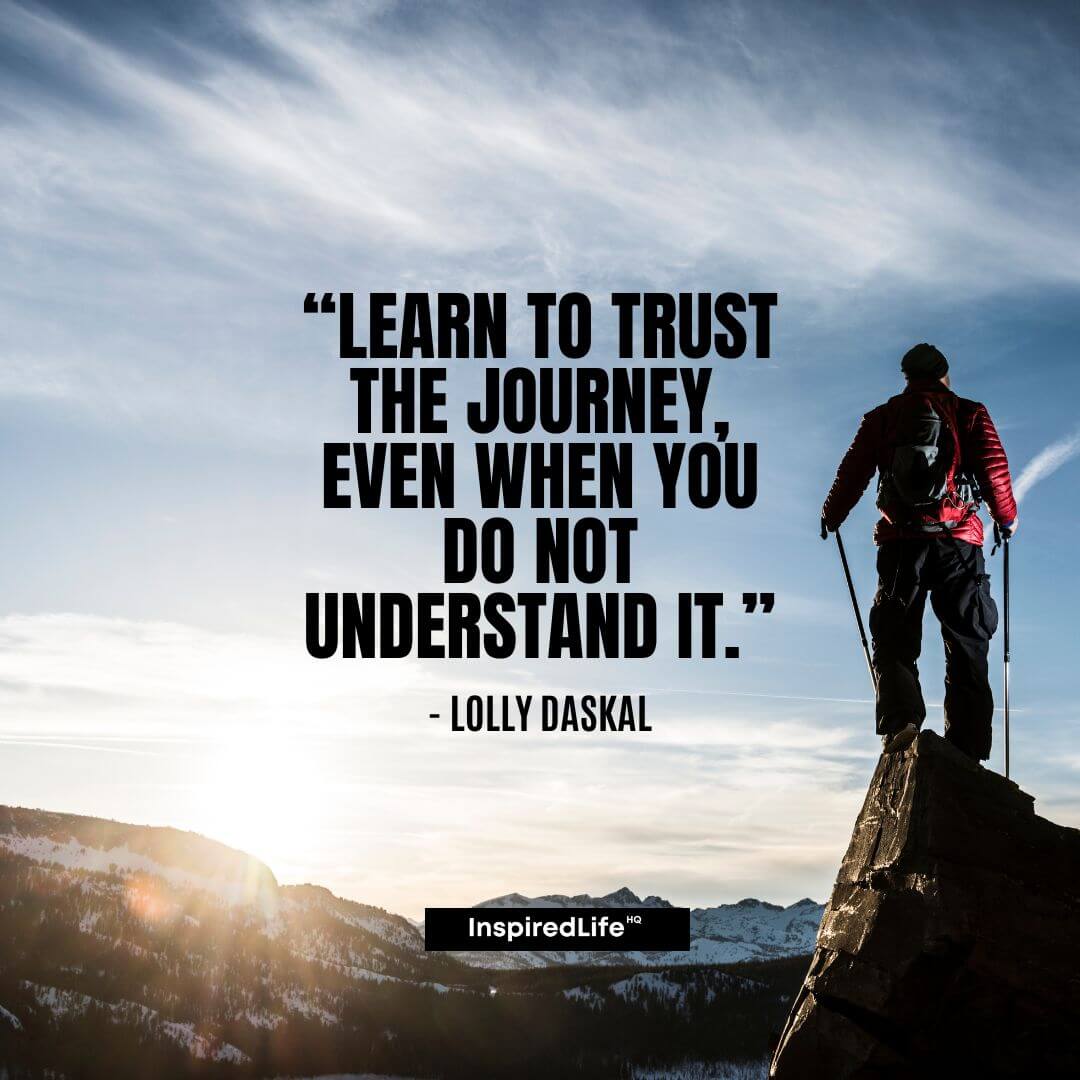
16. “Life is a journey that have a lot of different paths, but any path you choose, use it as your destiny.” – Unknown
17. “The beautiful journey of today can only begin when we learn to let go of yesterday.” – Steve Maraboli
Discover unique products that inspire at the InspiredLife Shop Wear Your Motivation. Inspire Your Space.
18. “Life is a journey, not a destination.” – Ralph Waldo Emerson
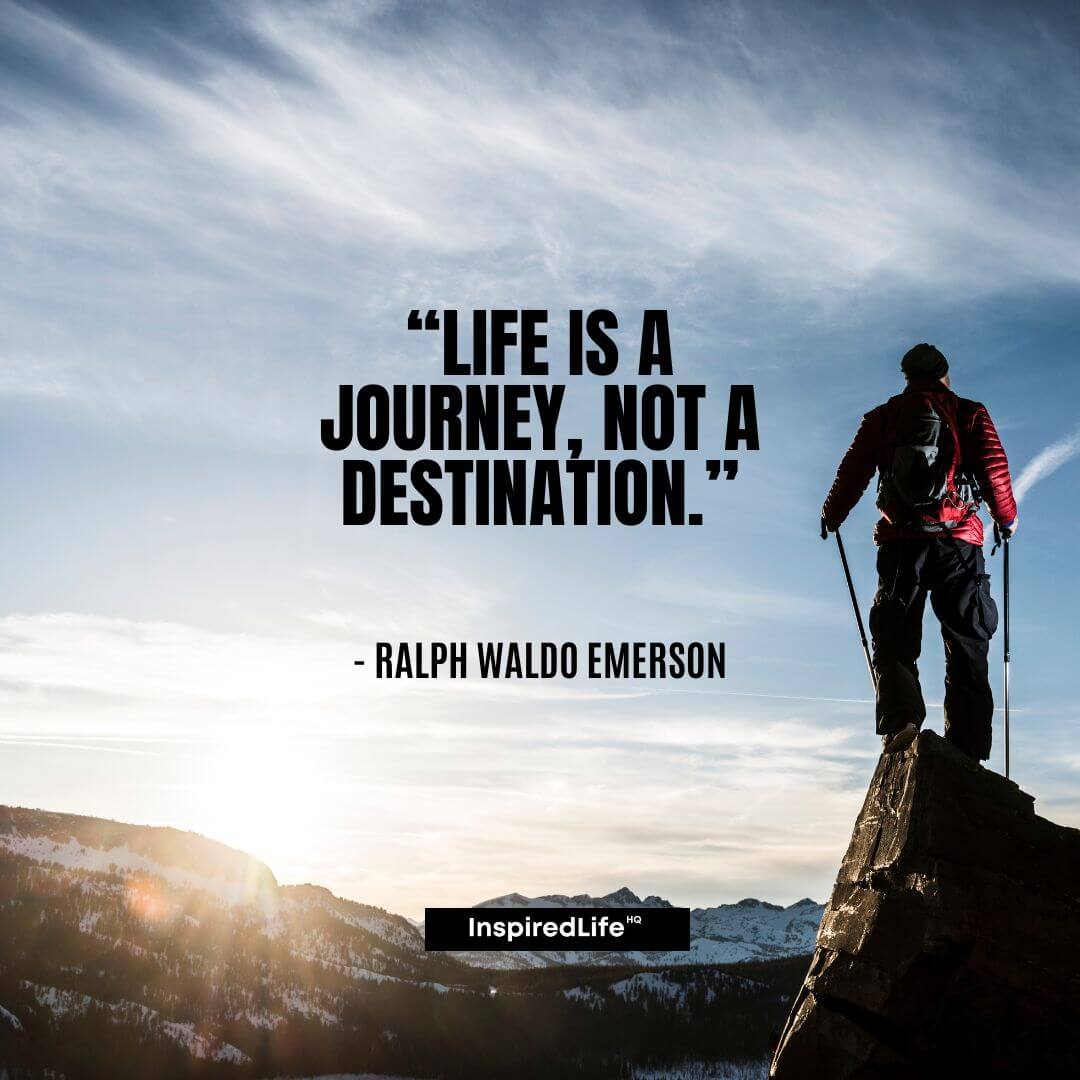
19. “Everyday you got a chance to make your journey more beautiful than yesterday.” – Nitin Namdeo
20. “Every day is a journey and the journey itself is home.” – Matsuo Basho
21. “Everybody has their own story; everything has their own journey.” – Thalia
Enjoy the journey quotes
22. “Enjoy the journey as much as the destination.” – Marshall Sylver
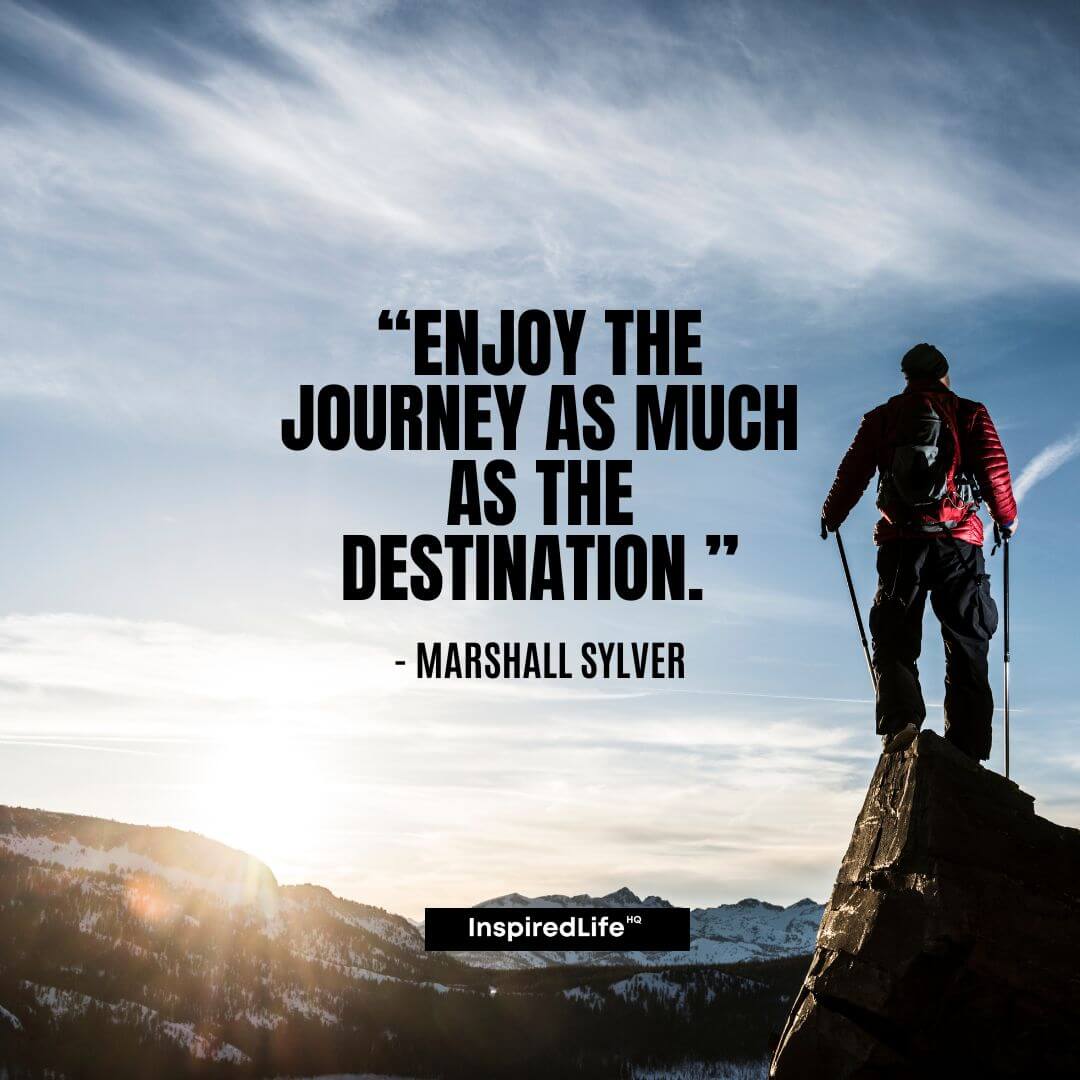
23. “Enjoy the journey of life and not just the endgame.” – Benedict Cumberbatch
24. “Enjoy the journey and try to get better everyday. And don’t lose the passion and the love for what you do.” – Nadia Comaneci
25. “Enjoy the journey, the destination will come.” – Verghese
26. “Don’t wait for everything to be perfect before you decide to enjoy your life.” – Joyce Meyer
27. “Dream big, stay positive, work hard, and enjoy the journey.” – Urijah Faber
28. “The key to realizing a dream is to focus not on success but significance, and then even the small steps and little victories along your path will take on greater meaning.” – Oprah Winfrey
29. “Aim for the sky, but move slowly, enjoying every step along the way. It is all those little steps that make the journey complete.” – Chanda Kochar
30. “Enjoy the journey, enjoy every moment, and quit worrying about winning and losing.” – Matt Biondi
31. “Stop worrying about the potholes in the road and enjoy the journey.” – Babs Hoffman
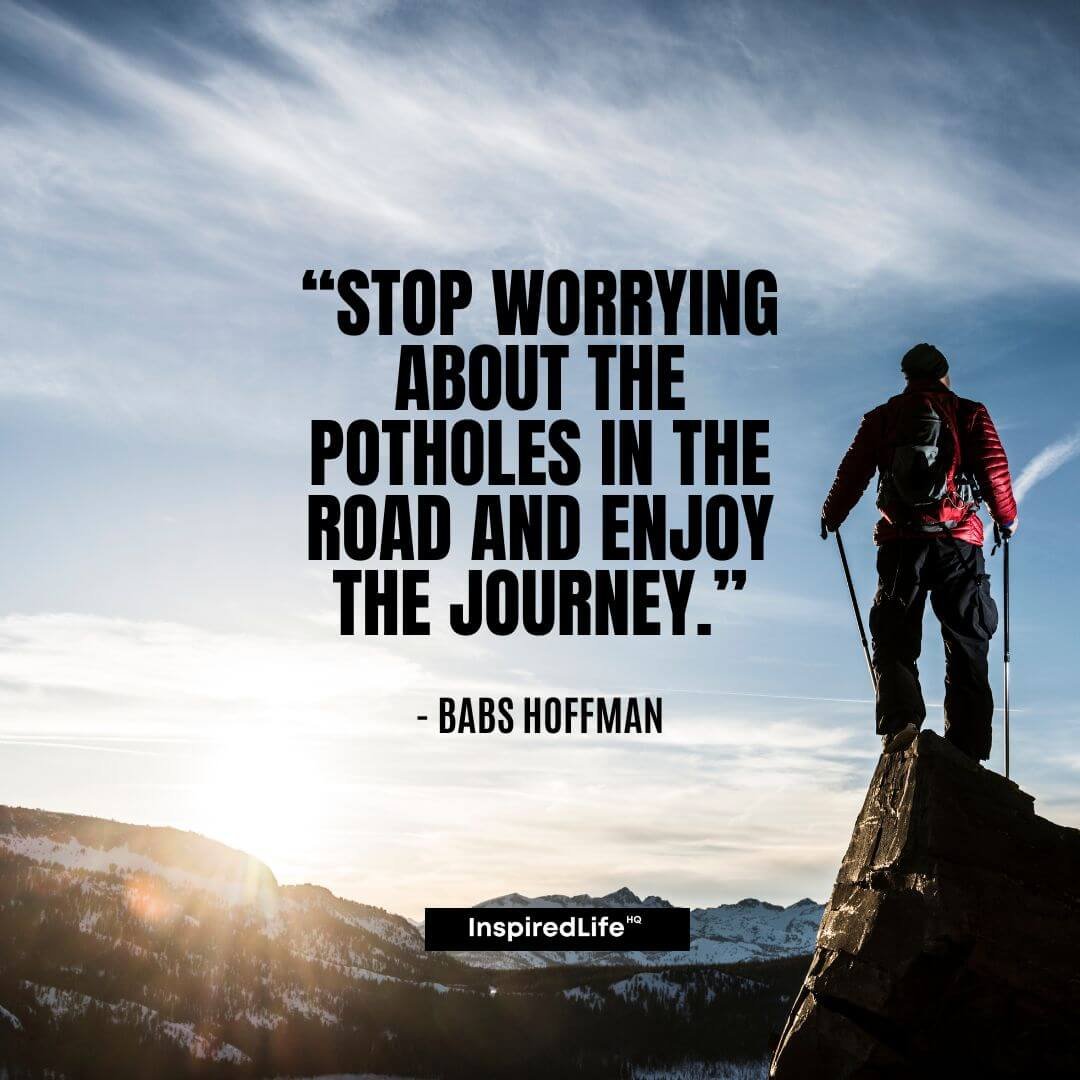
32. “I haven’t been everywhere but its on my list.” – Susan Sontag
33. “You must remain focused on your journey to greatness.” – Les Brown
Inspirational journey quotes
34. “You can never regret anything you do in life. You kind of have to learn the lesson from whatever the experience is and take it with you on your journey forward.” – Aubrey O’Day
35. “Life is a journey. When we stop, things don’t go right.” – Pope Francis
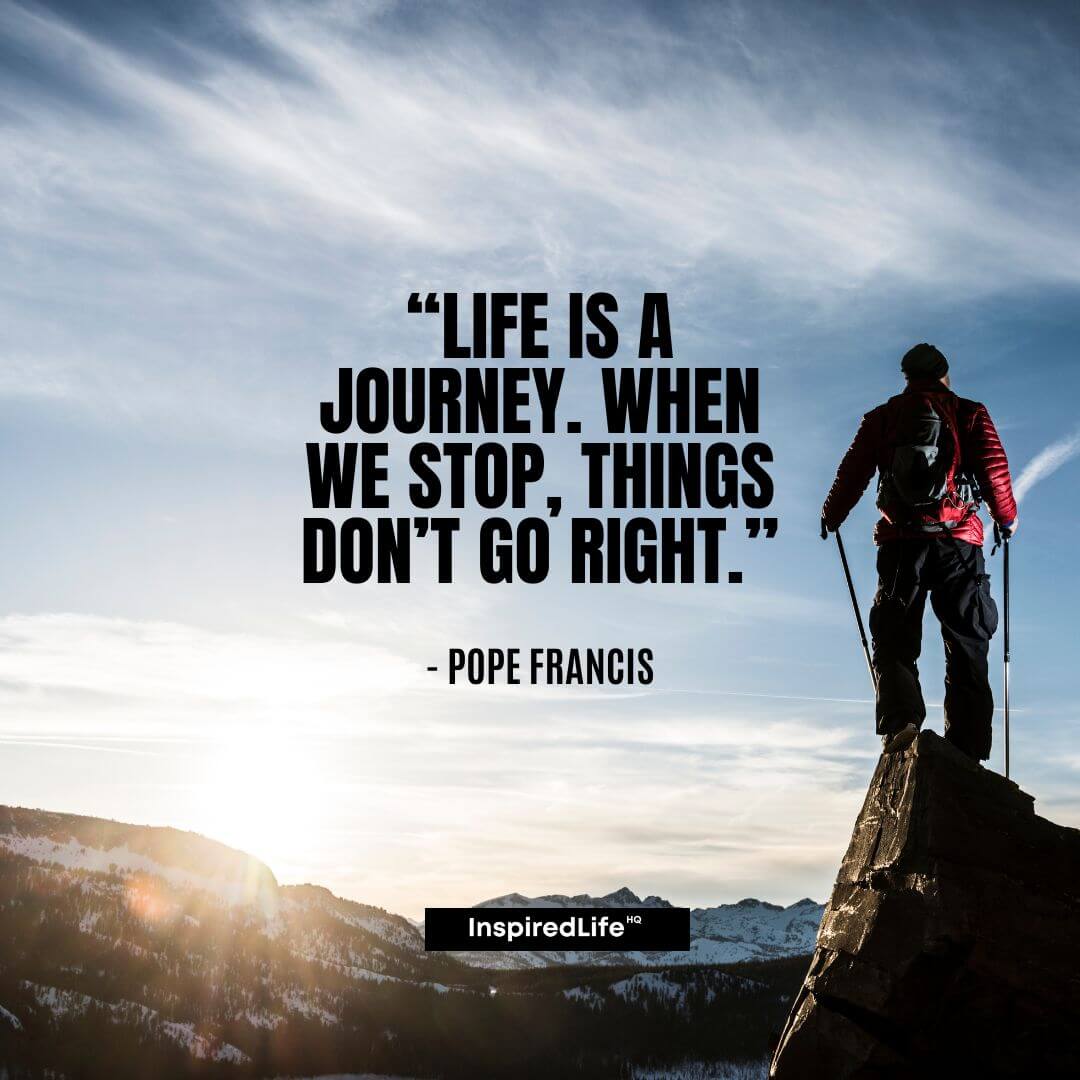
36. “There’s no map for you to follow and take your journey. You are Lewis and Clark. You are the mapmaker.” – Phillipa Soo
37. “I’m different than most people. When I cross the finish line of a big race, I see that people are ecstatic, but I’m thinking about what I’m going to do tomorrow. It’s as if my journey is everlasting, and there is no finish line.” – David Goggins
38. “We don’t receive wisdom; we must discover it for ourselves after a journey that no one can take for us or spare us.” – Marcel Proust
39. “Though the road’s been rocky it sure feels good to me.” – Bob Marley
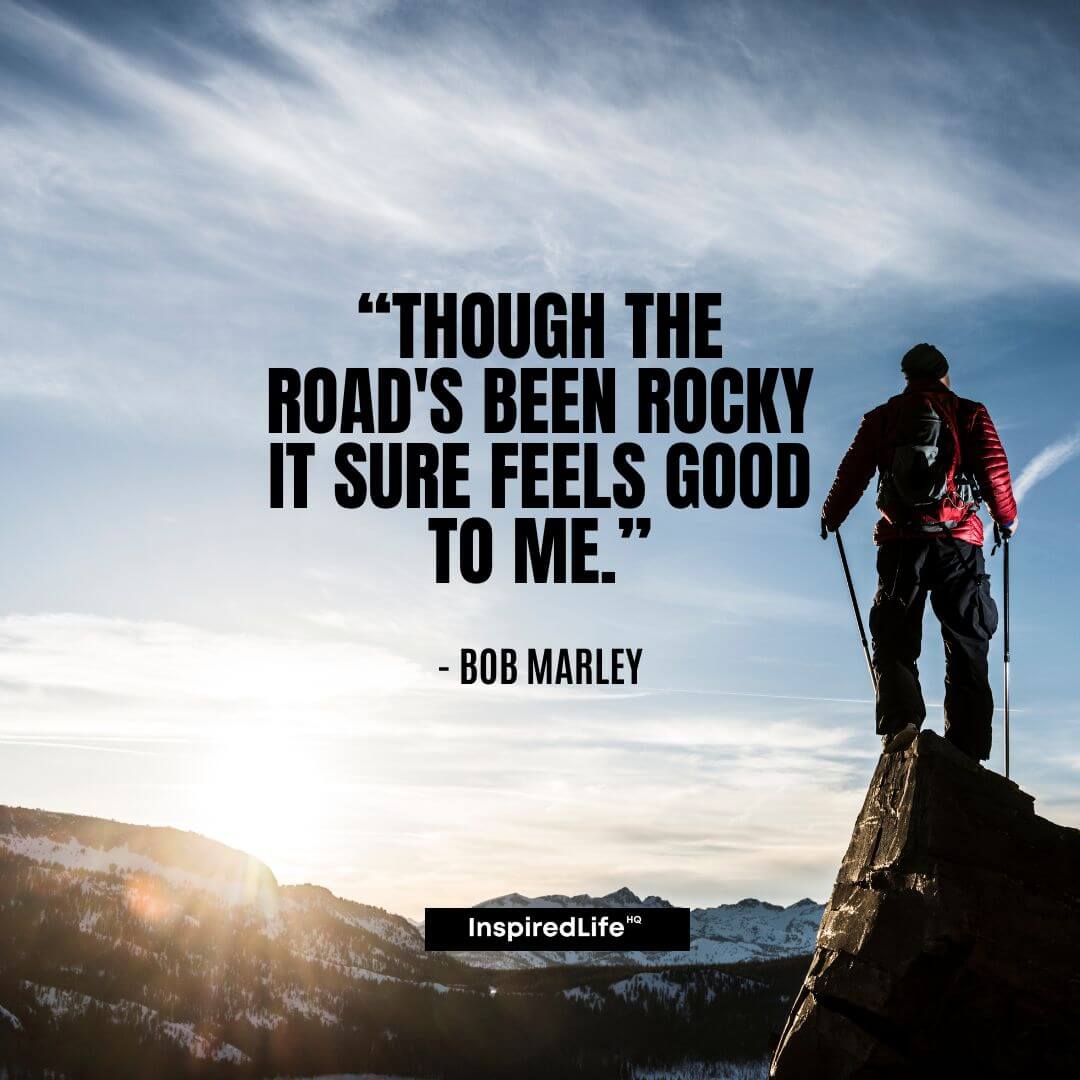
40. “We are at our very best, and we are happiest, when we are fully engaged in work we enjoy on the journey toward the goal we’ve established for ourselves. It gives meaning to our time off and comfort to our sleep. It makes everything else in life so wonderful, so worthwhile.” – Earl Nightingale
41. “Have the courage to follow your heart and intuition. They somehow already know what you truly want to become.” – Steve Jobs
42. “If my ship sails from sight, it doesn’t mean my journey ends, it simply means the river bends.” – Enoch Powell
Motivational journey quotes
43. “Make voyages. Attempt them. There’s nothing else.” – Tennessee Williams
44. “Gotta take that adventure in order to understand your journey.” – Jennifer Pierre
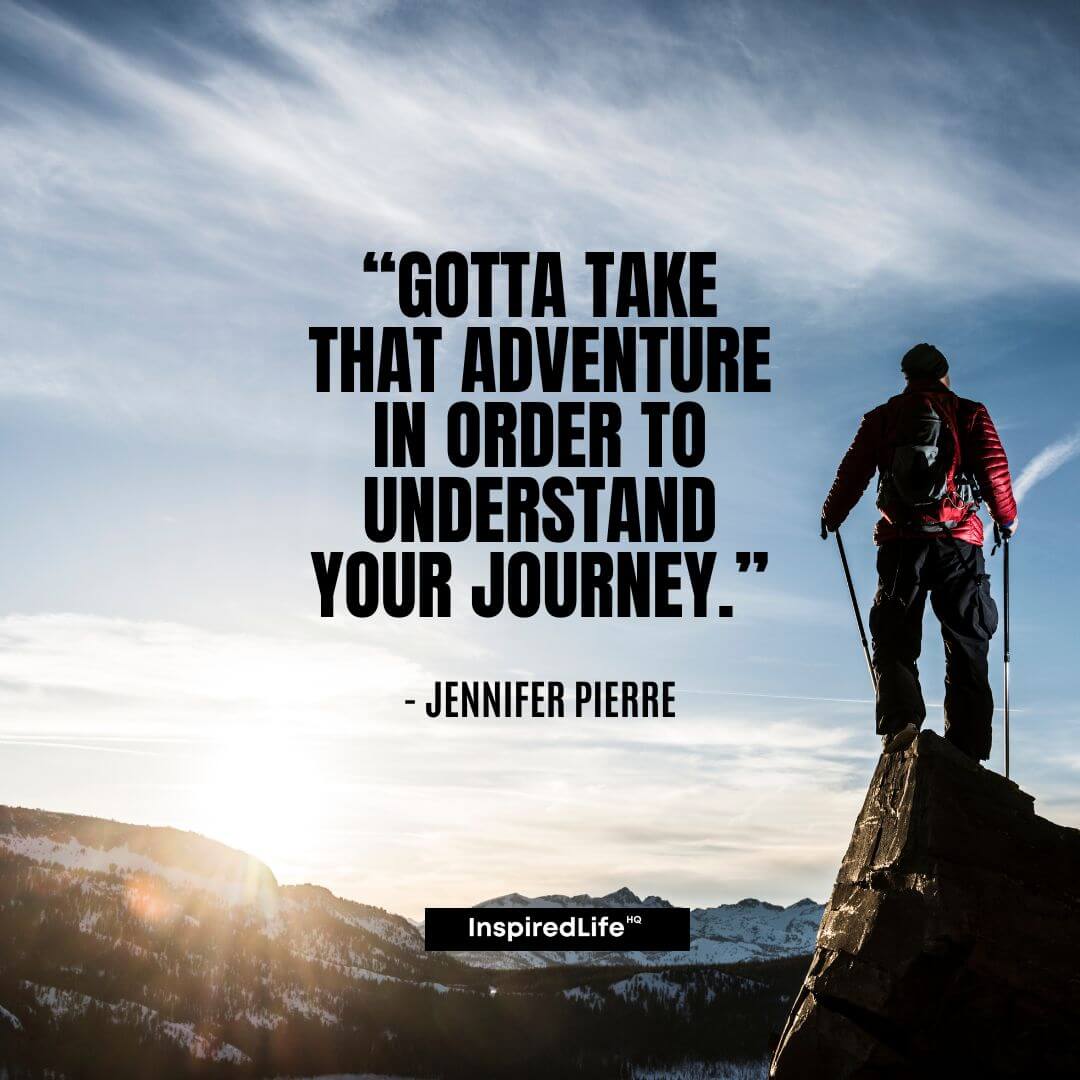
45. “Believe you can and you’re halfway there.” – Theodore Roosevelt
46. “The beauty of my journey is that it’s always been pretty unpredictable, so stay tuned.” – Andreja Pejic
47. “The journey not the arrival matters.” – T.S. Eliot
48. “The future depends on what you do today.” – Mahatma Gandhi
49. “The goal is to die with memories, not dreams.” – Unknown
50. “Never throughout history has a man who lived a life of ease left a name worth remembering.” – Theodore Roosevelt
51. “The harder you work from something, the greater you’ll feel when you achieve it.” – Sudhashree Acharya
52. “Once you have traveled, the voyage never ends, but is played out over and over again in the quietest chambers. The mind can never break off from the journey.” – Pat Conroy
53. “The only impossible journey is the one you never begin.” – ILHQ
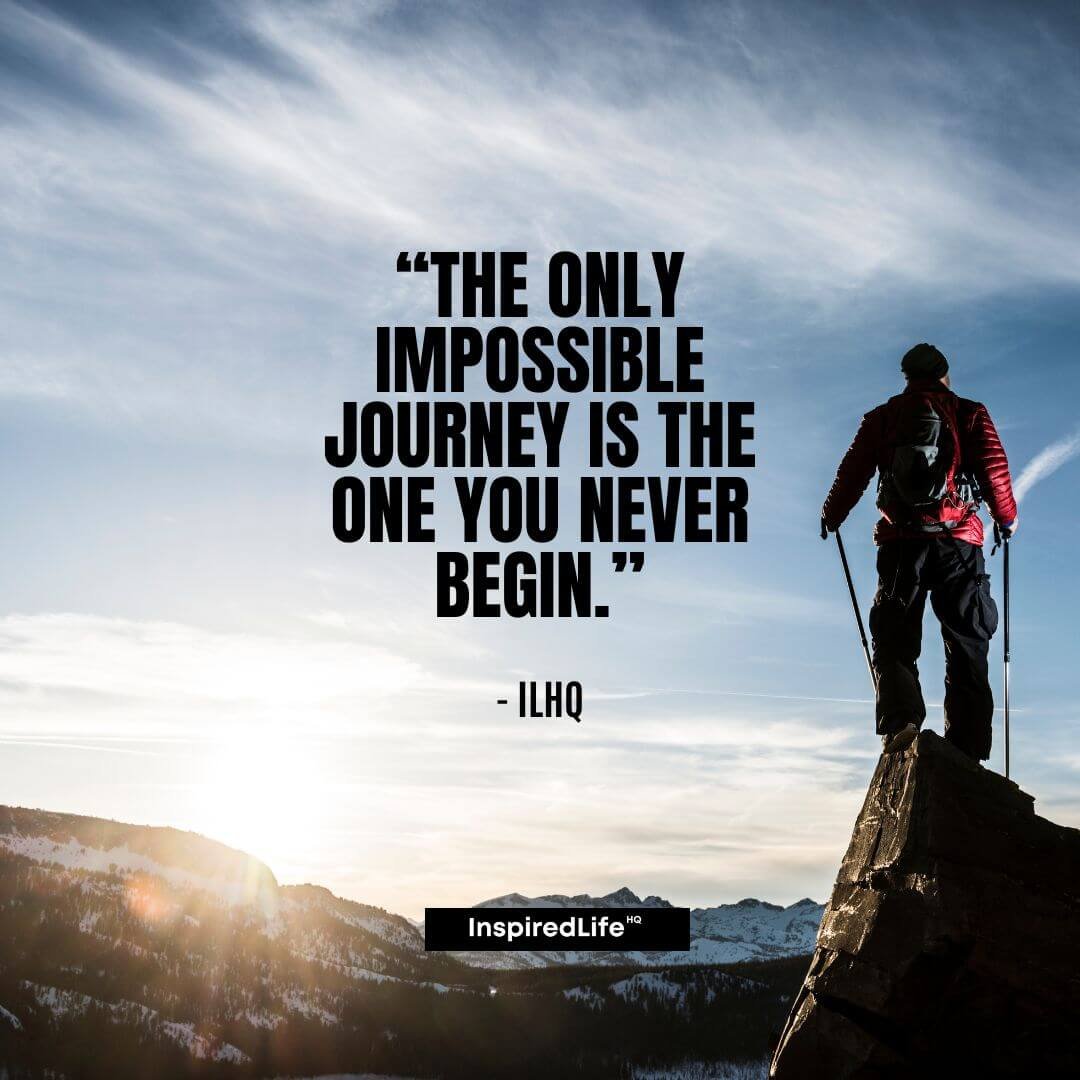
54. “When setting out on a journey do not seek advice from someone who never left home.” – Rumi
Positive journey quotes
55. “You may only live once, but if you do it right, once is enough.” – Mae West
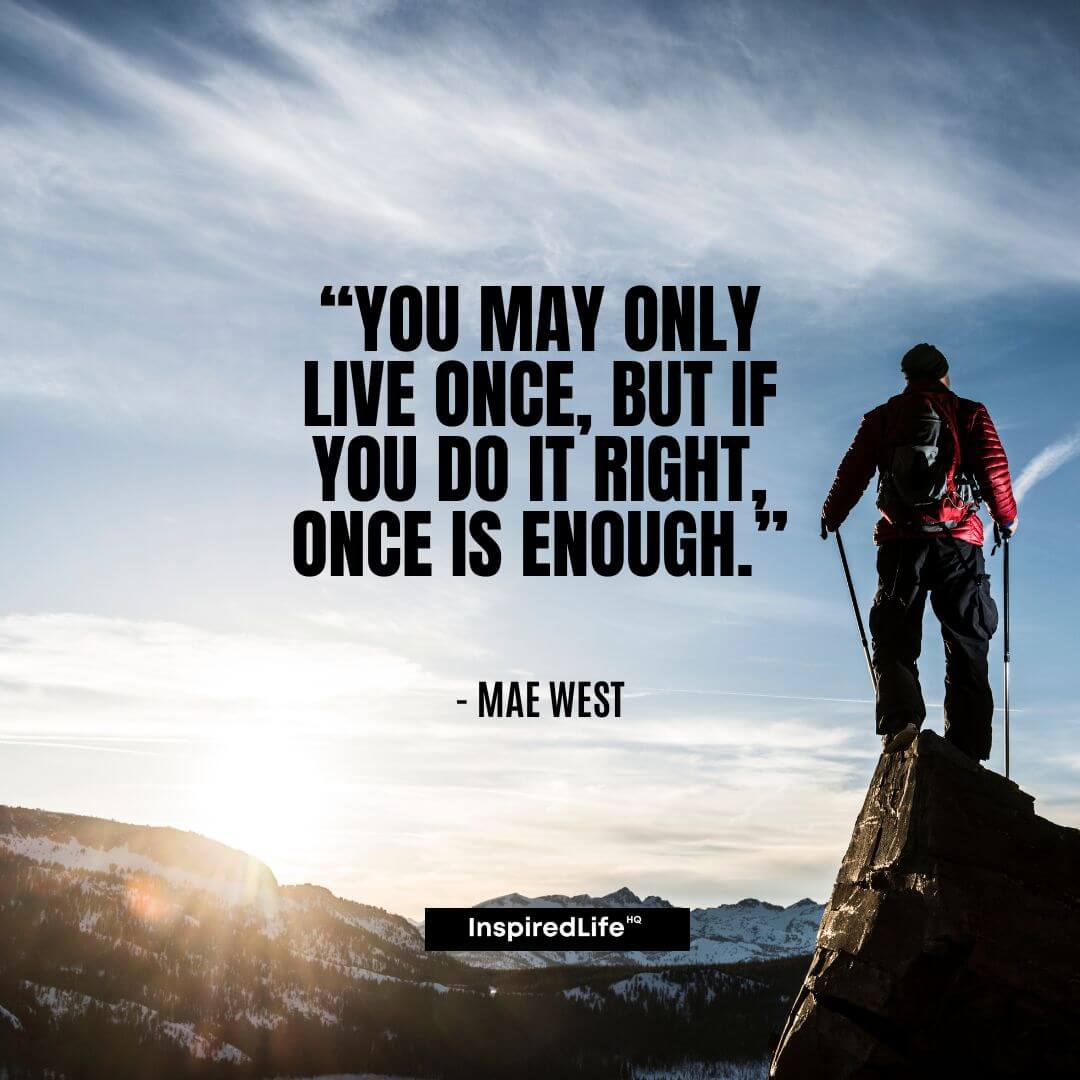
56. “Every day you got a chance to make your journey more beautiful than yesterday.” – Nitin Namdeo
57. “Stay positive. Better days are on their way.” – Unknown
58. “Your destiny is to fulfill those things upon which you focus most intently. So choose to keep your focus on that which is truly magnificent, beautiful, uplifting and joyful. Your life is always moving toward something.” – Ralph Marston
59. “You make a life out of what you have, not what you’re missing.” – Kate Morton
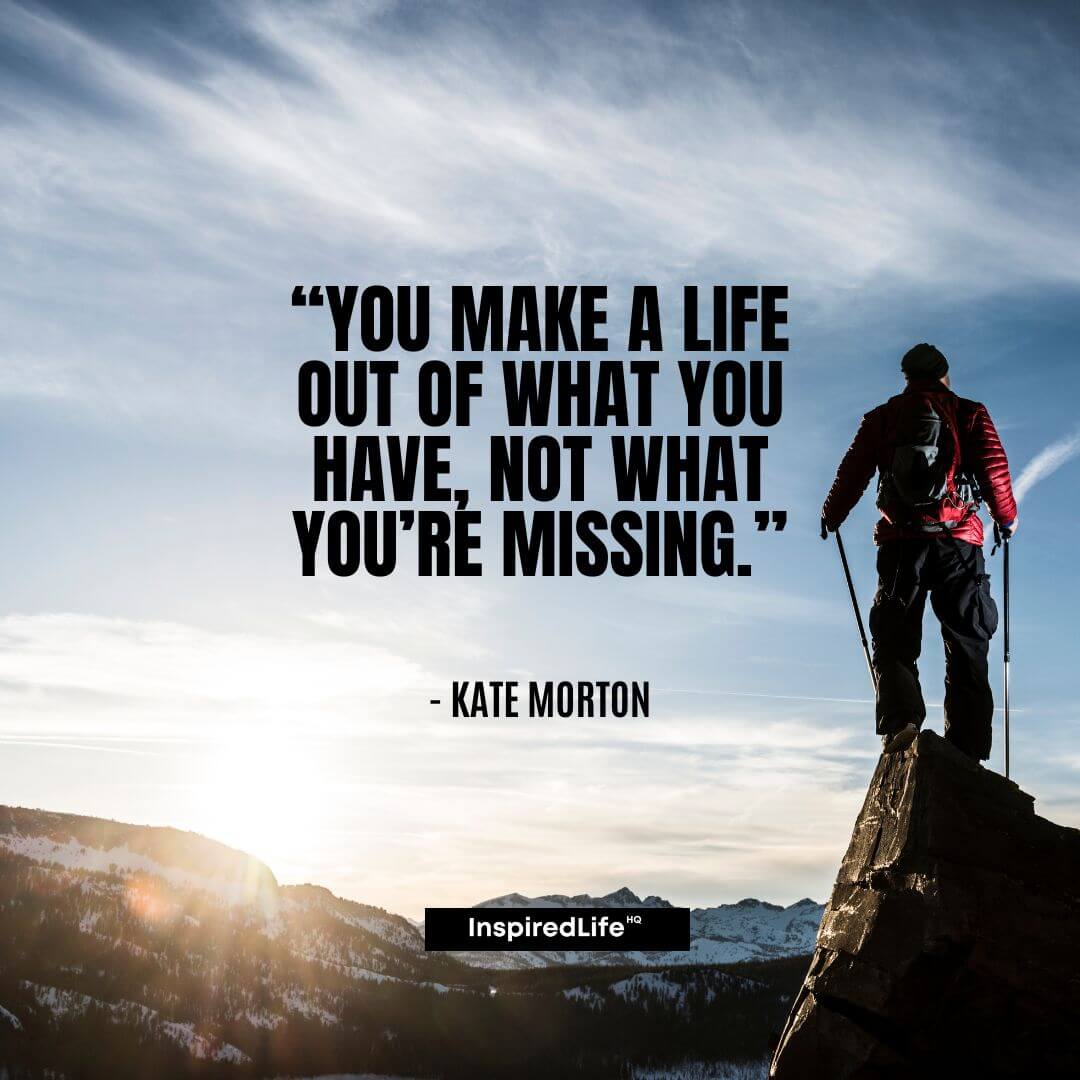
60. “Every sunset is an opportunity to reset. Every sunrise begins with new eyes.” – Richie Norton
61. “Life is very interesting. In the end, some of your greatest pains, become your greatest strengths.” – Drew Barrymore
62. “Your journey has molded you for your greater good, and it was exactly what it needed to be. Don’t think you’ve lost time. There is no short-cutting life. It took each and every situation you have encountered to bring you to the now. And now is right on time.” – Asha Tyson
63. “And suddenty you know…It’s time to start something new and trust the magic of beginnings.” – Meister Eckhart
64. “Find out who you are and do it on purpose.” – Dolly Parton
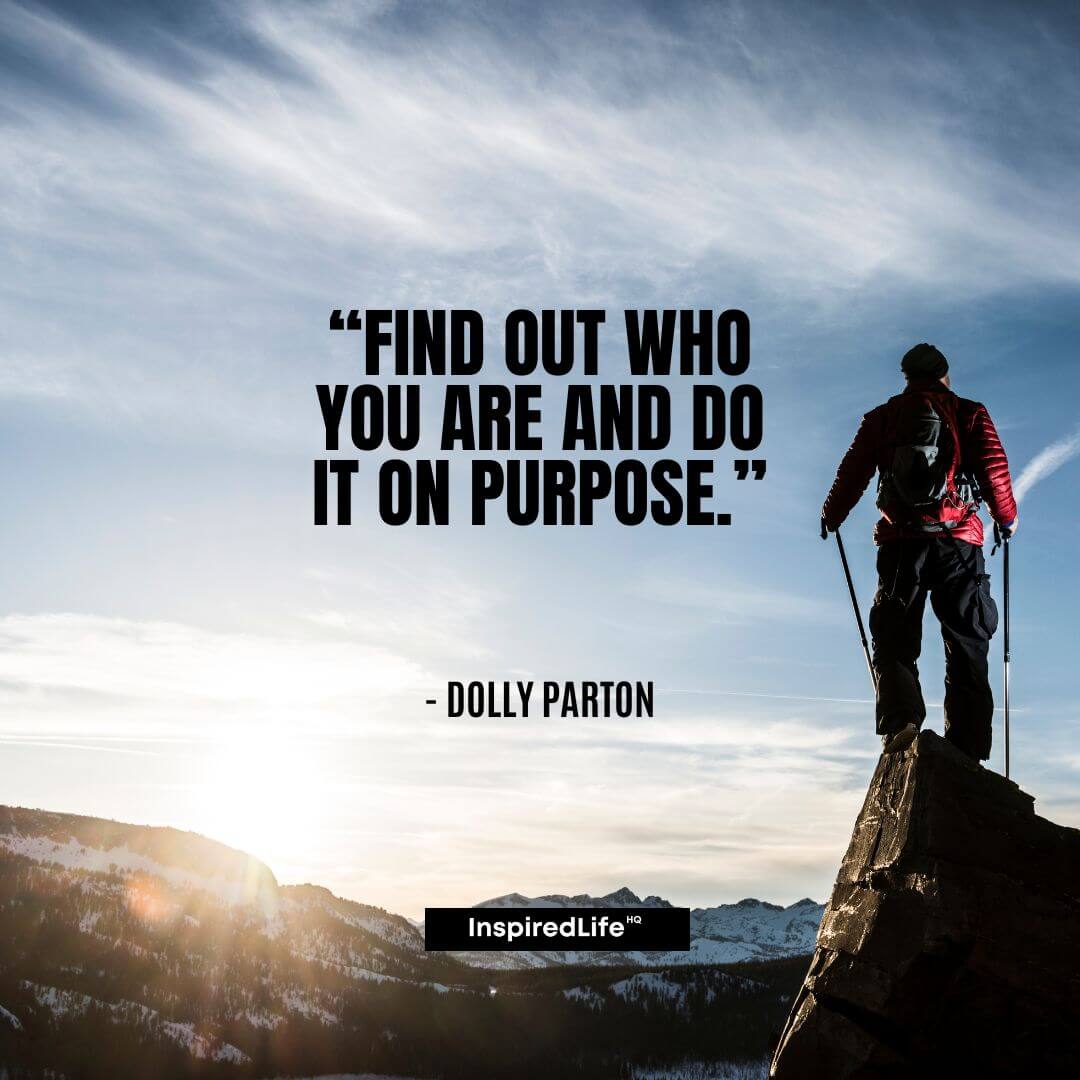
65. “Your success will be determined by your own confidence and fortitude.” – Michelle Obama
66. “Be yourself, everyone else is already taken.” – Oscar Wilde
67. “If you change the way you look at things, the things you look at change.” – Wayne Dyer
Journey of life quotes
68. “The only impossible journey is the one you never begin.” – Tony Robbins
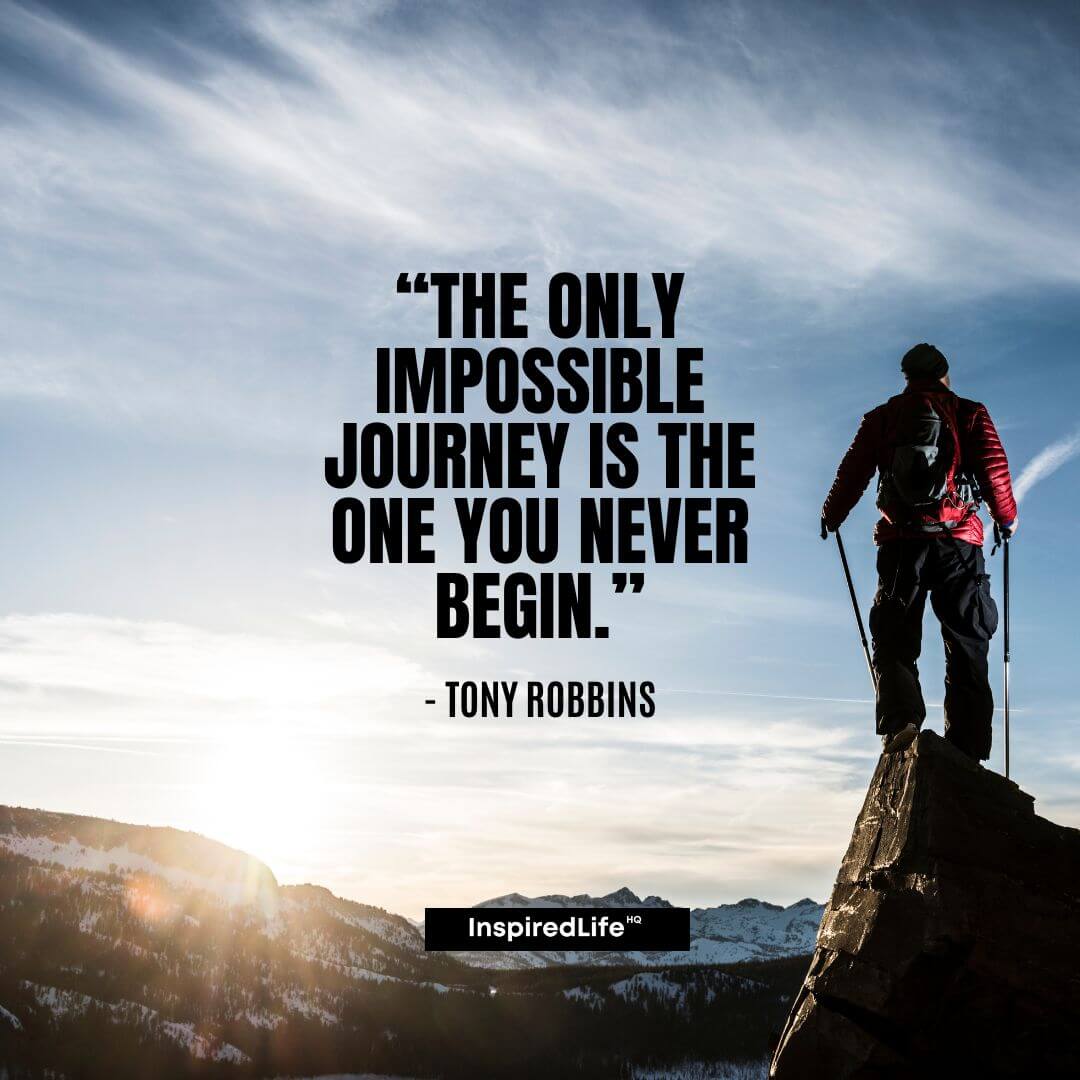
69. “When you have a dream, you’ve got to grab it and never let go.” – Carol Burnett
70. “Life is 10% of what happens to you and 90% how you react to it.” – Charles R. Swindoll
71. “You take your life in your own hands, and what happens? A terrible thing, no one to blame.” – Erica Jong
72. “If all difficulties were known at the outset of a long journey, most of us would never start out at all.” – Dan Rather
73. “It’s your reaction to adversity, not adversity itself that determines how your life’s story will develop.” – Dieter F. Uchtdorf
74. “Your Monday morning thoughts set the tone for your whole week. See yourself getting stronger, and living a fulfilling, happier & healthier life.” – Germany Kent
75. “Ability is what you’re capable of doing. Motivation determines what you do. Attitude determines how well you do it.” – Lou Holtz
76. “Our lives are the journey we take to find our true selves!” – Alyssa Gonzalez
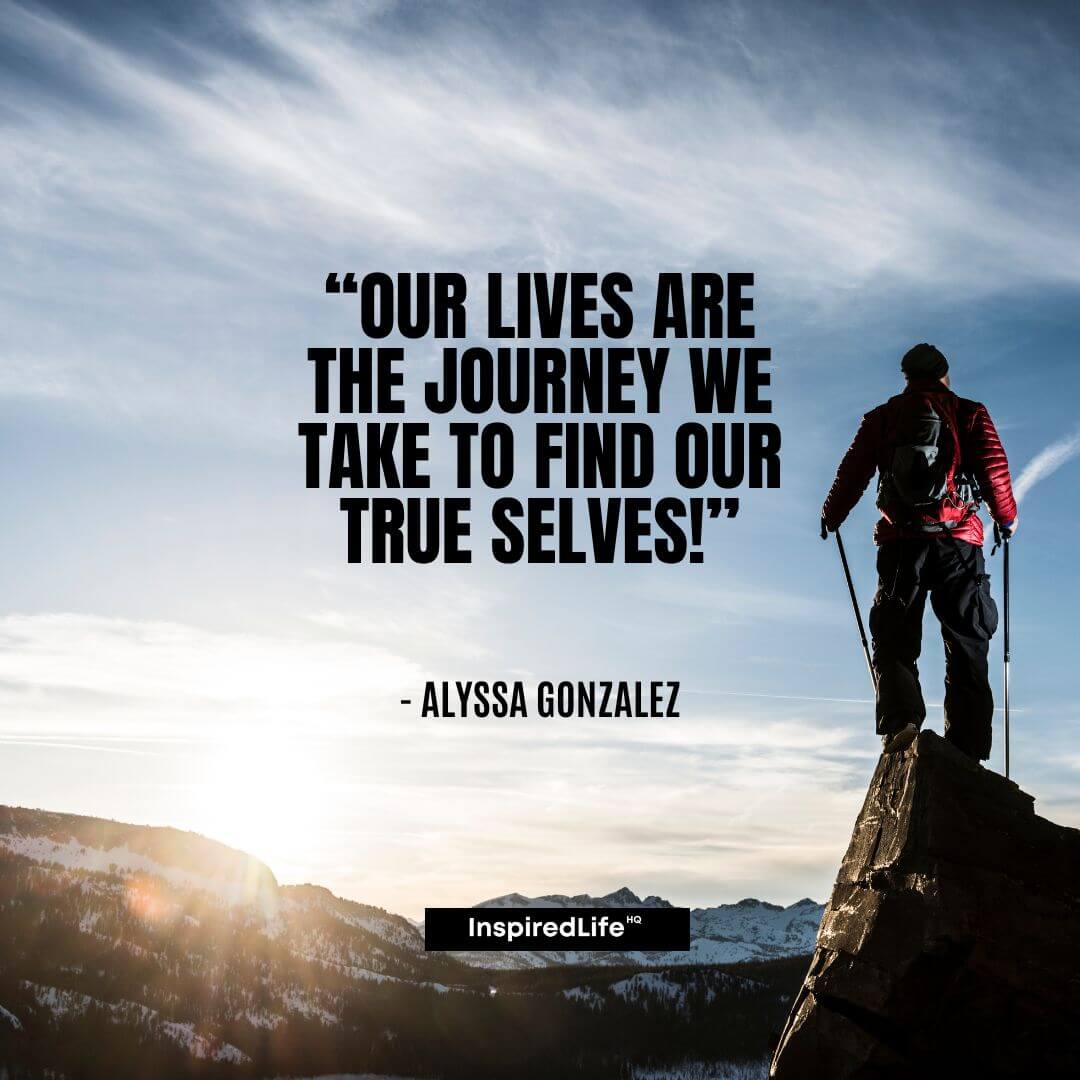
77. “Your braver than you believe, stronger that you seem, and smarter than you think.” – A.A. Milne
Which of these journey quotes were your favorites?
We all have the potential within us to be great.
But greatness isn’t about luck. It’s a choice.
We must choose to succeed and take steps towards it.
Remember, the path to success is a journey, not a quick leap.
Let these quotes inspire you to stay focused on your goals and dreams, no matter what obstacles get in your way along the path.

Helping people and eating tacos are my jam! This blog exists to help provide tips and resources that can help you achieve your goals and live a better life. Whether you’re looking for tips on personal growth, fitness, advice on starting a side hustle, or resources for working remotely, I’ve got you covered.

51 Meaningful Quotes About How Life is a Journey
There might be affiliate links on this page, which means we get a small commission of anything you buy. As an Amazon Associate we earn from qualifying purchases. Please do your own research before making any online purchase.
They say that life is about the journey and not the destination. But what does that really mean?
You’ve probably heard this line a million times before, but maybe you couldn’t quite understand what it was trying to illustrate.
The most successful people will tell you that the process of accomplishing something is far more valuable than the end result. You learn much more from all of your experiences and encounters than you do from arriving at the destination.
Ultimately, the process is the greatest reward. The sweetest moments come when you realize that you have attained the final goal because of everything you have experienced.
You look back on the mistakes, the challenges, and everything you had to endure—but you also celebrate the fact that you faced your problems head-on. Your journey through life is what makes you human.
In this article, we share with you a list of quotes about how life is a journey . We hope that, through these words, you’ll be able to enjoy everything that life has to offer. Even more so, we hope that they will inspire you to live a more meaningful and happier life .
But before we check out our list, let’s discuss how reading these quotes can get you motivated.
Table of Contents
Why Read Quotes About How Life Is a Journey?
Reading these quotes can inspire you to live a better and more fulfilling life.
They are, after all, from people who have found their journeys through life enjoyable and gratifying. There’s no better way to motivate yourself than to get inspiration from people who have already lived wonderful lives.
In the same vein, these quotes can help you appreciate the gift of life. They help you realize that you only live once, so you must relish the moments you have been given.
Finally, reading these quotes can encourage you to share your life with others. You will realize that, in order to be able to live your life to the fullest, you need someone to share both your joys and sorrows with. You require companions to fully live in the moment .
Now that you know why it’s important to read journey quotes, let us check out our list!
Meaningful Life is a Journey Quotes
- “If you can’t fly, then run. If you can’t run, then walk. If you can’t walk, then crawl. But by all means, keep moving.” – Martin Luther King, Jr.
- “Whatever you do, or dream you can, begin it. Boldness has genius and power and magic in it.” – Johann Wolfgang von Goethe
- “The only impossible journey is the one you never begin.” – Tony Robbins
- “The key to realizing a dream is to focus not on success but significance, and then even the small steps and little victories along your path will take on greater meaning.” – Oprah Winfrey
- “Don’t judge each day by the harvest you reap, but by the seeds that you plant.” – Robert Louis Stevenson
- “No man ever steps in the same river twice, for it's not the same river and he's not the same man.” – Heraclitus
- “Not I, nor anyone else can travel that road for you. You must travel it by yourself. It is not far. It is within reach. Perhaps you have been on it since you were born, and did not know. Perhaps it is everywhere – on water and land.” – Walt Whitman
- “The most important reason for going from one place to another is to see what's in between, and they took great pleasure in doing just that.” – Norton Juster
- “The beautiful journey of today can only begin when we learn to let go of yesterday.” – Steve Maraboli
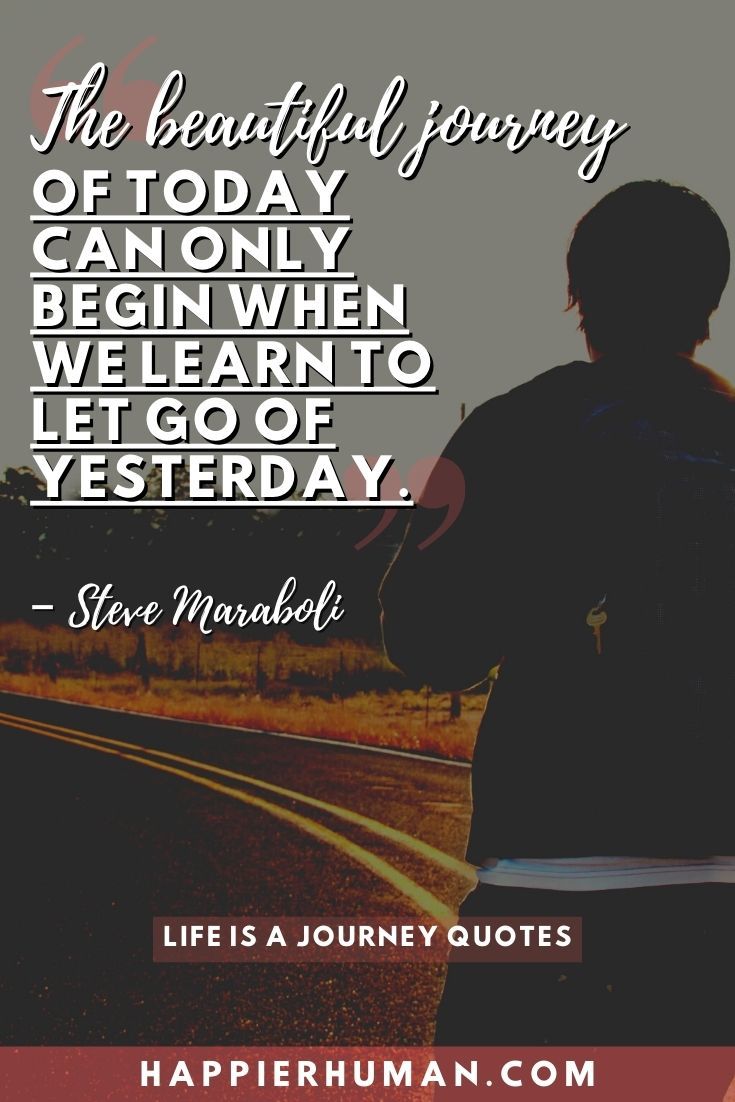
- “Some beautiful paths can't be discovered without getting lost.” – Erol Ozan
- “For me, becoming isn’t about arriving somewhere or achieving a certain aim. I see it instead as forward motion, a means of evolving, a way to reach continuously toward a better self. The journey doesn’t end.” – Michelle Obama
- “I am no longer afraid of becoming lost because the journey back always reveals something new, and that is ultimately good for the artist.” – Billy Joel
- “Once you have traveled, the voyage never ends but is played out over and over again in the quietest chambers. The mind can never break off from the journey.” – Pat Conroy
- “Never stop just because you feel defeated. The journey to the other side is attainable only after great suffering.” – Santosh Kalwar
- “There is a strange comfort in knowing that no matter what happens today, the Sun will rise again tomorrow.” – Aaron Lauritsen
- “Sometimes it’s the journey that teaches you a lot about your destination.” – Drake
- “ Transformation is a process , and as life happens there are tons of ups and downs. It’s a journey of discovery – there are moments on mountaintops and moments in deep valleys of despair.” – Rick Warren
- “The journey is never-ending. There’s always gonna be growth, improvement, and adversity; you just gotta take it all in and do what’s right, continue to grow, continue to live in the moment.” – Antonio Brown
- “Focus on the journey, not the destination. Joy is found not in finishing an activity but in doing it.” – Greg Anderson
- “On your journey, don’t forget to smell the flowers. Take time out to notice that you are alive. You can only live one day.” – Ray Fearon
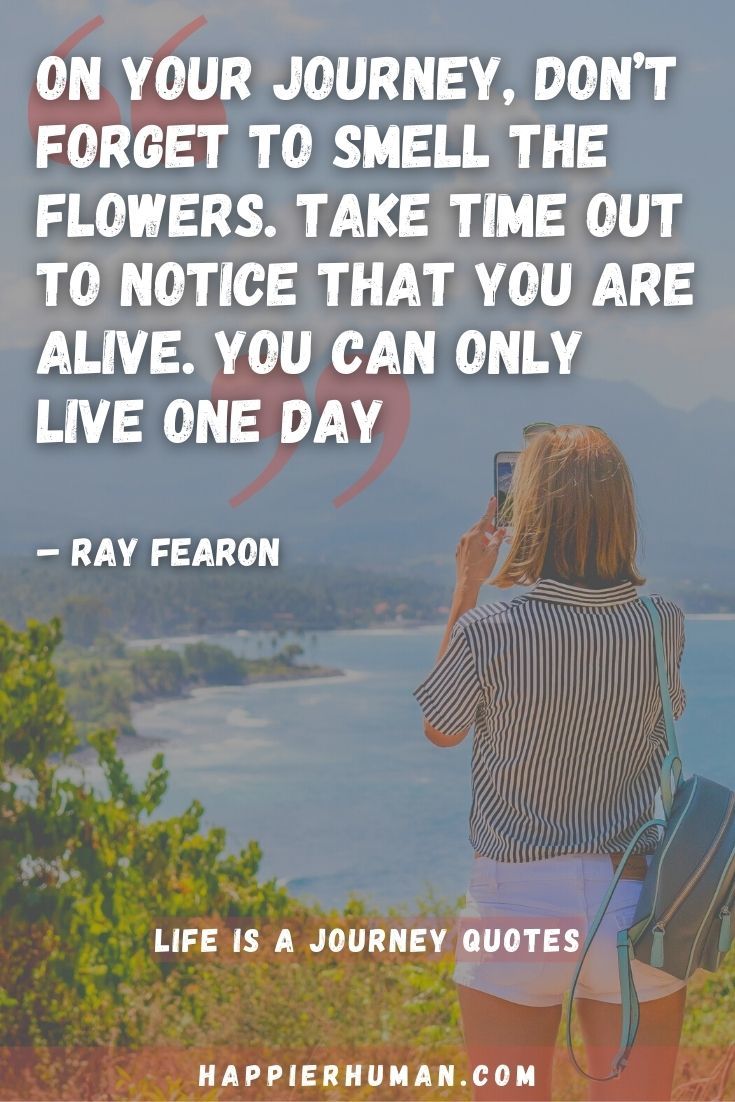
- “If my ship sails from sight, it doesn’t mean my journey ends. It simply means the river bends.” – Enoch Powell
- “It’s not an easy journey, to get to a place where you forgive people. But it is such a powerful place because it frees you.” – Tyler Perry
- “Aim for the sky, but move slowly, enjoying every step along the way. It is all those little steps that make the journey complete.” – Chanda Kochhar
- “Sometimes we make the process more complicated than we need to. We will never make a journey of a thousand miles by fretting about how long it will take or how hard it will be. We make the journey by taking each day step by step and then repeating it again and again until we reach our destination.” – Joseph B. Wirthlin
- “Your journey never ends. Life has a way of changing things in incredible ways.” – Alexander Volkov
- “Each one of us has our own evolution of life, and each one of us goes through different tests which are unique and challenging. But certain things are common. And we do learn things from each other's experiences. On a spiritual journey, we all have the same destination.” – A. R. Rahman
- “Going by my past journey, I am not certain where life will take me, what turns and twists will happen; nobody knows where they will end up. As life changes direction, I'll flow with it.” – Katrina Kaif
- “Enjoy the journey and try to get better every day. And don't lose the passion and the love for what you do.” – Nadia Comaneci

- “But it's a journey and the sad thing is you only learn from experience, so as much as someone can tell you things, you have to go out there and make your own mistakes in order to learn.” – Emma Watson
- “The seeker embarks on a journey to find what he wants and discovers, along the way, what he needs.” – Wally Lamb
- “Life is a journey that must be traveled no matter how bad the roads and accommodations.” – Oliver Goldsmith
- “The Sun will rise and set regardless. What we choose to do with the light while it's here is up to us. Journey wisely.” – Alexandra Elle
- “We may run, walk, stumble. drive, or fly, but let us never lose sight of the reason for the journey, or miss a chance to see a rainbow on the way.” – Gloria Gaither
- “Whole life is a search for beauty. But, when the beauty is found inside, the search ends and a beautiful journey begins.” – Harshit Walia
- “Not everyone will understand your journey. That's okay. You're here to live your life, not to make everyone understand .” – Banksy
- “I believe that life is a journey, often difficult and sometimes incredibly cruel, but we are well equipped for it if only we tap into our talents and gifts and allow them to blossom.” – Les Brown
- “It was being a runner that mattered, not how fast or how far I could run. The joy was in the act of running and in the journey, not in the destination.” – John Bingham
- “As you journey down the path, don't forget to be present moment-by-moment and absorb the beauty and richness of simply being alive.” – Cary David Richards
- “If all difficulties were known at the outset of a long journey, most of us would never start out at all.” – Dan Rather
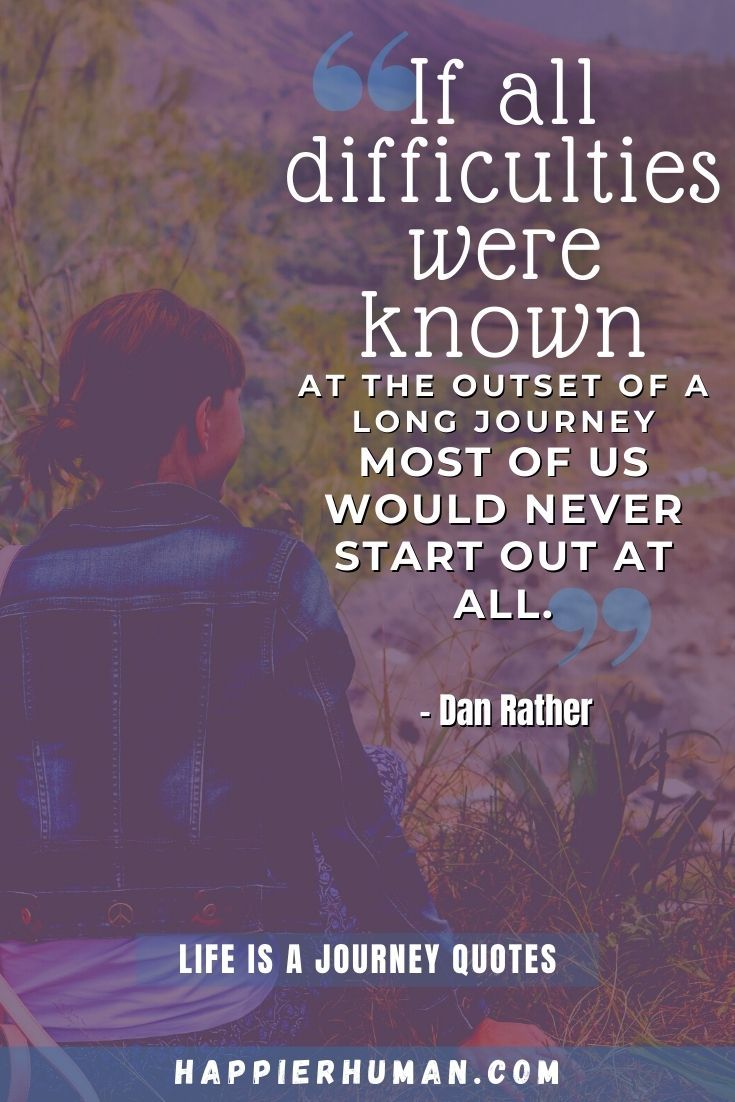
- “Life is a journey of either Fate or Destiny. Fate is the result of giving in to one's wounds and heartaches. Your Destiny unfolds when you rise above the challenges of your life and use them as Divine opportunities to move forward to unlock your higher potential.” – Caroline Myss
- “I know it can be tough to imagine how to get from where you are today to where you want to be tomorrow. But I’m here to tell you that change is possible if you enter into this journey with your eyes wide open, and with real intention.” – David Hauser
- “Part of the challenge that comes with striving for success is how the entire journey comes with its own fair share of failures and disappointments.” – Rupert Johnson
- “The only thing that is ultimately real about your journey is the step that you are taking at this moment. That's all there ever is.” – Alan Watts
- “Life is a journey and it's about growing and changing and coming to terms with who and what you are and loving who and what you are.” – Kelly McGillis
- “Time is a companion that goes with us on a journey. It reminds us to cherish each moment because it will never come again. What we leave behind is not as important as how we have lived.” – Captain Jean-Luc Picard
- “I just constantly tell myself that I should be the only one to define my worth and what I'm capable of and how I perceive myself. And that I should never source that worth from other people, especially strangers on social media. They don't know who I am, the length of my journey, who I am as a person.” – Catriona Gray
- “ You have learned a lot, but there are still lots of learning for you as you journey through life. Never stop learning.” – Kate Summers
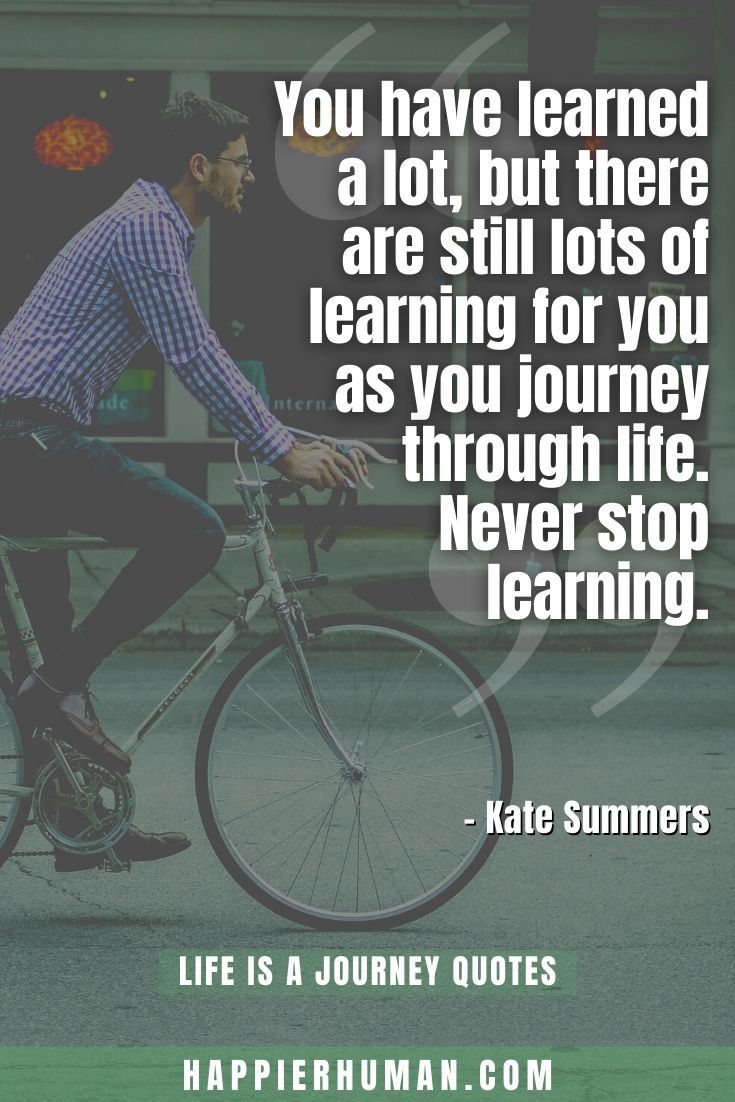
- “One of the most important things that I have learned in my 57 years is that life is all about choices. On every journey you take, you face choices. At every fork in the road, you make a choice. And it is those decisions that shape our lives.” – Mike DeWine
- “I'm different than most people. When I cross the finish line of a big race, I see that people are ecstatic, but I'm thinking about what I'm going to do tomorrow. It's as if my journey is everlasting, and there is no finish line.” – David Goggins
- “The journey matters as much as the destination. By engaging at the moment on set, I've stopped rushing and now find pleasure in the collaborative process – the characters, the costumes – rather than worrying about the finished product.” – Michelle Dockery
- “It's a life's journey of finding ourselves, finding our power, and living for yourself, not for everyone else.” – Mariska Hargitay
Final Thoughts on Life & Journey
Life is a journey, and we all take different paths.
There are those who take the road less traveled and enjoy unique accomplishments, while others go with the crowd but still end up loving the lives they’ve chosen as well. Regardless of our choices, we will all have the potential to become successful in the ways we personally define success.
We hope that these quotes inspired you to enjoy your life’s journey and make it more meaningful. Enjoy the moment and live happy!
And if you want more inspirational quotes, be sure to check out these blog posts:
- 63 Inspiring Walt Whitman Quotes About Life
- 51 Do What Makes You Happy Quotes for 2023
- 107 Quotes About Overcoming Adversity and Challenges in Your Life
Finally, if you want to use these quotes to make a lasting change to your life, then check out and recite these 57 affirmations for success .

101 Best Inspirational Quotes for Your Life Journey
Everyone has a unique journey in life, one that is filled with both challenges and triumphs. As we make our way through our individual paths, we can often find ourselves needing a bit of inspiration. Whether it’s a quote from a wise figure, a thought-provoking proverb, or a simple reminder of our own inner strength, inspirational quotes can be a powerful tool to help us stay focused and motivated on our life journey. In this blog post, we will explore some of the most powerful inspirational quotes for your life journey.
Table of Contents
Benefits of Incorporating Inspirational Quotes into Your Life
Are you feeling overwhelmed, stuck, or uninspired? Are you looking for that extra bit of motivation to make a change in your life? Incorporating inspiring quotes into your life can be just the thing you need to help you get back on track!
Inspirational quotes are words of wisdom that offer guidance and reassurance when you need it most. They can help you stay focused on your goals and keep you motivated to achieve them. Here are some of the benefits of incorporating uplifting quotes into your life.
Provide Clarity
When life feels uncertain or overwhelming, inspirational quotes can help you gain clarity and perspective. They can help you to see the bigger picture and provide the guidance you need to make the difficult decisions in life.
Help You Stay Focused
When you’re feeling lost or stuck, inspirational quotes can help you stay focused and motivated on achieving your goals. They can give you the courage to take the necessary steps to move you forward.
Provide Hope
In times of despair and discouragement, inspirational quotes can help you remain hopeful and energized. They remind you of the importance of having faith, no matter how dark things may seem.
Provide Encouragement
Life can be overwhelming and filled with challenges. When you’re feeling down and out, inspirational quotes can provide you with the encouragement and positivity you need to push through.
Provide Guidance
When you’re uncertain of which path to take, inspirational quotes can help you make the right decision. They can provide you with the guidance and wisdom you need to make the best choices and create a brighter future.
You May Also Like: 70 Empowering Inspirational Quotes to Transform Your Life!
Inspirational Quotes for Your Life Journey
Inspirational quotes can be a great source of motivation and guidance when life gets tough. They remind us to stay positive, to keep going even when times are tough, and to never give up. Whether it’s a quote from a great philosopher, a religious leader, or a celebrity, there’s always something inspiring to draw from.
1. “You have to get lost before you can be found.” – Jeff Rasley
2. “Don’t be scared to walk alone. Don’t be scared to like it .” – John Mayer
3. ”The journey of a thousand miles begins with one step.” – Lao Tzu
4. “There are some places in life where you can only go alone. Embrace the beauty of your solo journey.” – Mandy Hale
5. “Sometimes, reaching out and taking someone’s hand is the beginning of a journey”. – Vera Nazarian
6. “Previous journeys in search of treasure have taught me that a zigzag strategy is the best way to get ahead.” – Tahir Shah
7. “Sometimes the longest journey we make is the sixteen inches from our heads to our hearts.” – Elena Avila
8. “Sometimes it’s the journey that teaches you a lot about your destination.” – Drake
9. “Stop worrying about the potholes in the road and enjoy the journey.” – Babs Hoffman
10. “The end of all our exploring will be to arrive where we started.” – T. S. Eliot
11. “The best part of life is to decide to make the journey through life like a best selling book. Tell a fantastic story when you are ready to tell others how you did it. Make sure life the best story ever written through a journey filled with overcoming obstacles, taking risks, and continuing to develop.” – Catherine Pulsifer
You May Also Like: 115 Good Morning Sunday Inspirational Quotes To Jumpstart Your Day!
12. ”The only impossible journey is the one you never begin.” – Tony Robbins
13. “Life is an opportunity, seize the day, live each day to the fullest. Life is not a project, but a journey to be enjoyed.” – Catherine Pulsifer
14. ”Stop worrying about the potholes in the road and celebrate the journey.” – Fitzhugh Mullan
15. “In order to complete our amazing life journey successfully, it is vital that we turn each and every dark tear into a pearl of wisdom, and find the blessing in every curse.” – Anthon St. Maarten
16. “What you learn in tough times can be used in many ways to bless your personal life journey.” – Scott Gordon
17. “Embrace your life journey with gratitude, so that how you travel your path is more important than reaching your ultimate destination .” – Rosalene Glickman
18. “Accomplishments will prove to be a journey, not a destination .” – Dwight D. Eisenhower
19. “Do not follow where the path may lead. Go instead where there is no path and leave a trail.” – Ralph Waldo Emerson
20. ”Your journey has molded you for the greater good.” – Asha Tyson
21. “Life is not measured by the number of breaths you take but by the moments that take your breath away .” – Maya Angelou
You May Also Like: 75 Motivational Addiction Recovery Quotes to Find Inner Strength
Life is a Journey Quotes
Life is a journey, full of ups and downs and unexpected turns. As you embark on your life journey, take some time to be inspired by wise and uplifting words. Inspirational quotes can give you the strength and courage to tackle any challenge and to keep on going even when things get tough.
22. “Always the journey, never the destination.” – Simon Rattle
23. “Remember where you have been and know where you are going. Life is not a race, but a journey to be savored each step of the way.” – Nikita Koloff
24. “Life is a journey that must be traveled no matter how bad the roads and accommodations.” – Oliver Goldsmith
25. “In the middle of the journey of our life, I came to myself in the dark wood, where the direct way was lost”. – Dante Alighieri
26. “Life is a journey and it’s about growing and changing and coming to terms with who and what you are, and loving who and what you are.” – Kelly McGillis
27. “We are travellers on a cosmic journey, stardust, swirling and dancing in the eddies and whirlpools of infinity. Life is eternal. We have stopped for a moment to encounter each other, to meet, to love, to share. This is a precious moment. It is a little parenthesis in eternity.” – Paulo Coelho
28. “Beginnings are usually scary, and endings are usually sad, but its everything in between that makes it all worth living.” – Bob Marley
29. “Life is a journey filled with unexpected miracles” – Unknown
30. “Travel only with thy equals or thy betters; if there are none, travel alone.” – Buddha
31. “Life is a journey that has a lot different paths, but any path you choose use it as your destiny.” – Ryan Leonard
32. “I believe that life is a journey, often difficult and sometimes incredibly cruel, but we are well equipped for it if only we tap into our talents and gifts and allow them to blossom.” – Les Brown
33. “Winning and losing isn’t everything; sometimes, the journey is just as important as the outcome.” – Alex Morgan
You May Also Like: Celebrate with These Inspirational 40th Birthday Quotes!
Best Life Journey Quotes
It is important to remember that having quotes to guide you on your journey can make all the difference. Just as a map guides a traveler to a desired destination, so too can inspirational quotes help keep you focused and motivated along your life journey.
34. “The only journey is the one within.” – Rainer Maria Rilke
35. ”If you’re going through hell, keep going.” – Winston Churchill
36. “You are far from the end of your journey. The way is not in the sky. The way is in the heart. See how you love.” – Buddha
37. ”Take the first step in faith. You don’t have to see the whole staircase, just take the first step.” – Dr. Martin Luther King Jr.
38. “Life is short and we have never too much time for gladdening the hearts of those who are travelling the dark journey with us. Oh be swift to love, make haste to be kind.” – Henri Frederic Amiel
39. “The benefits of the accomplished journey cannot be weighed in terms of perfect moments but in terms of how this journey affects and changes our character.” – Ella Maillart
40. “We never know the journey another person has walked, so be kind to everyone .” – Lynette Mather
41. “The main thing that you have to remember on this journey is, just be nice to everyone and always smile .” – Ed Sheeran
42. “Life should not be a journey to the grave with the intention of arriving safely in a pretty and well-preserved body, but rather to skid in broadside in a cloud of smoke, thoroughly used up, totally worn out, and loudly proclaiming “Wow! What a Ride!” – Hunter S. Thompson
43. “In this journey of life, you will meet people who will make you feel alive!” – Avijeet Das
44. “Life is a journey to be experienced, not a problem to be solved”. – Winnie the Pooh
45. “One of the journeys in life is overcoming insecurity and learning to truly not give a shit.” – J.A. Konrath
46. “Let your mind start a journey thru a strange new world. Leave all thoughts of the world you knew before. Let your soul take you where you long to be…Close your eyes let your spirit start to soar, and you’ll live as you’ve never lived before.” – Erich Fromm
You May Also Like: 80 Good Morning Monday Inspirational Quotes to Start Your Week
Life is About the Journey Quotes
Life is about the journey quotes remind us to cherish the journey we are on and to not be so focused on the end result. Life is full of ups and downs and it is important to enjoy and learn from each step we take.
47. “Some beautiful paths can’t be discovered without getting lost”. – Erol Ozan
48. “To get through the hardest journey we need to take only one step at a time, but we must keep on stepping .” – Chinese Proverb
49. “It is good to have an end to journey toward; but it is the journey that matters, in the end.” – Ernest Hemingway
50. “I discovered that a fresh start is a process. A fresh start is a journey – a journey that requires a plan.” – Vivian Jokotade
51. “This thing we call life is not a destination with an end but a path down which we continue to journey as long as we can breathe. Life is to be lived not squandered or to give away waiting for the end to close upon us .” – Byron Pulsifer
52. “The only thing that is ultimately real about your journey is the step that you are taking at this moment. That’s all there ever is.” – Alan Watts
53. “Aim for the sky, but move slowly, enjoying every step along the way. It is all those little steps that make the journey complete. “– Chanda Kochhar
54. “Focus on the journey, not the destination. Joy is found not in finishing an activity but in doing it.” – Greg Anderson
55. “There’s no destination. The journey is all that there is, and it can be very, very joyful”. – Srikumar Rao
56. “Life to me is a journey – you never know what may be your next destination.” – David Russell
57. “What I like is the journey, the year-round struggle to improve.” – Dorian Yates
You May Also Like: 85 Inspirational Good Night Quotes to End Your Day with a Smile!
Every Day is a Journey Quotes
Every day is a journey and every moment is a lesson. We have the opportunity to learn something new and to grow with each experience. Every day is an opportunity to make a positive change in our lives. These quotes about every day being a journey remind us to stay in the present moment and to appreciate the journey that we are on.
58. “Find the journey’s end in every step.” – Ralph Waldo Emerson
59. “Learn to trust the journey, even when you do not understand it .” – Lolly Daskal
60. “Always remember life is a learning journey. Keep filling your mind with all that is worthy.” – Catherine Pulsifer
61. “It’s the ‘everyday’ experiences we encounter along the journey to who we wanna be that will define who we are when we get there.” — Aaron Lauritsen
62. “I have traveled many roads in my life. Some were imbued with pain and I needed to avert my gaze. Others were so beautiful that I would have remained there forever. But always, at some point in these routes, I reached a place where I encountered myself .” – Pablo Holmberg
63. “See, life is a journey and every chapter is very interesting.” – Zeenat Aman
64. ”Remember to celebrate milestones as you prepare for the road ahead.” – Nelson Mandela
65. “On your journey, don’t forget to smell the flowers. Take time out to notice that you’re alive. You can only live in one day.” – Ray Fearon
66. ”You will never truly know yourself, or the strength of your relationships, until both have been tested by adversity.” – J.K. Rowling
67. “Sometimes we make the process more complicated than we need to. We will never make a journey of a thousand miles by fretting about how long it will take or how hard it will be. We make the journey by taking each day step by step and then repeating it again and again until we reach our destination.” – Joseph B. Wirthlin
68. “Peace is a journey of a thousand miles and it must be taken one step at a time.” – Lyndon B. Johnson
69. “Your journey never ends. Life has a way of changing things in incredible ways.” – Alexander Volkov
You May Also Like: Words of Encouragement to a Friend Feeling Down Quotes – 75 Ideas
Enjoy the Journey Quotes
Enjoy the journey quotes are words of motivation to appreciate and savor the experiences of life’s journey. Life is a gift, and it’s important to take the time to enjoy and appreciate each moment, no matter how small or seemingly insignificant.
70. “The journey is the reward .” – Tao Expression
71. “The journey between what you once were and who you are now becoming is now where the dance of life really takes place.” – Barbara de Angelis
72. “And at the end of the day, there is nothing but the journey. Because destination is pure illusion.” – Rich Roll
73. “Good company in a journey makes the way seem shorter.” – Izaak Walton
75. “It is not the destination where you end up but the mishaps and memories you create along the way !” – Penelope Riley
75. “Enjoy the journey and try to get better every day. And don’t lose the passion and the love for what you do.” – Nadia Comaneci
76. “A journey taken in vain is not a wasted journey if you have learnt something .” – Anthony T. Hincks
77. “If ever there was a metaphor to illustrate the importance of the journey over the destination, it is life itself. For everyone who departs from birth is destined for death, so the journey is life. Savor it!” – Michele Jennae
78. ”A ship in the harbor is safe, but that is not what ships are built for.”- John A. Shedd
79. “Let your joy be in your journey – not in some distant goal.” – Tim Cook
80. “Sometimes it’s more about the journey than the destination.” – Jamal Crawford
81. “Everybody has their own story; everybody has their own journey.” – Thalia
82. “The journey matters as much as the goal.” – Kalpana Chawla
83. “Enjoy the journey of life and not just the endgame.” – Benedict Cumberbatch
You May Also Like: 60 You Are Amazing Motivational Quotes to Empower You and Your Loved Ones
Journey Quotes to Inspire Success
Journey quotes are a great way to inspire success and motivate yourself to keep pushing forward. They remind us to stay focused on our goals, no matter how hard the journey may be. They remind us that success is a long road and that we have to take it one step at a time. They urge us to never give up and to keep striving towards our dreams.
84. “Success is a journey, not a destination.” – Ben Sweetland
85. ”Don’t be discouraged if the people around you don’t see what you see in your dream. Most great people were doubted in the beginning of their journey to greatness.” ― Edmond Mbiaka
86. ”Success is a journey, not a destination. The doing is often more important than the outcome.”- Arthur Ashe
87. “You can’t go back and change the beginning, but you can start where you are and change the ending”. – C.S. Lewis
88. “The woman who follows the crowd will usually go no further than the crowd. The woman who walks alone is likely to find herself in places no one has ever been before.” – Albert Einstein
89. “The man who goes alone can start today; but he who travels with another must wait till that other is ready.” – Henry David Thoreau
90. “No one can decide the road that inspires us to kick-start a journey better than the one embarking on the path. We may find others joining our journey, but we have to take the first step alone to reach our destination.” – Dr. Prem Jagyasi
91. “I discovered that a fresh start is a process. A fresh start is a journey – a journey that requires a plan”. – Vivian Jokotad
92. “It has been a long journey, but if you dream and have the ambition and want to work hard, then you can achieve.” – Mo Farah
You May Also Like: 85 Morning Inspirational Quotes for Him: Start the Day with Love
93. ”You must remain focused on your journey to greatness.” – Les Brown
94. ”Ambition is the path to success. Persistence is the vehicle you arrive in.” – Bill Bradley
95. ”If you can’t fly, then run, if you can’t walk run, then walk, if you can’t walk, then crawl, but by all means keep moving.” – Martin Luther King Jr.
96. ”The key to realizing a dream is to focus not on success but significance, and then even the small steps and little victories along your path will take on greater meaning.” – Oprah Winfrey
97. ”If you want to achieve excellence, you can get there today. As of this second, quit doing less-than-excellent work.”—Thomas J. Watson
98. “Not everyone will understand your journey. That’s okay. You’re here to live your life, not to make everyone understand.” – Banksy
99. “Never give up on your dreams, no matter how painful and difficult your journey is.”- Lisa
100. “Humility is the true key to success. Successful people lose their way at times. They often embrace and overindulge from the fruits of success. Humility halts this arrogance and self-indulging trap. Humble people share the credit and wealth, remaining focused and hungry to continue the journey of success.” – Rick Pitino
101. “It’s a long journey to become successful, and you learn to grow with it. You grow with the small steps you take.” – Benson Henderson
Subscribe and get more posts fresh off the press!
You have successfully joined our subscriber list.
Good Luck on Your Journey
In life, it is important to stay inspired and motivated to keep pushing forward. Inspirational quotes can provide us with the wisdom and encouragement to stay focused on our life journey. Whether it is finding success, experiencing joy, or overcoming adversity, inspirational quotes can be the perfect reminder to keep striving for the best version of ourselves. As we journey through life, let us remember these motivational words and use them to find strength and courage every step of the way.
Related Posts
60 good morning thursday inspirational quotes to brighten your day, 75 incredible sexy inspirational quotes that will fire you up, inspirational birthday quotes for son – 95 ideas, leave a comment cancel reply.
Your email address will not be published. Required fields are marked *
Save my name, email, and website in this browser for the next time I comment.
This website uses cookies to improve your experience. We'll assume you're ok with this, but you can opt-out if you wish. Read More
Sharing is Caring
Help spread the word. You're awesome for doing it!
Realizing Your Meaning: 5 Ways to Live a Meaningful Life

If you have ever had this thought, then take comfort that you are not alone. There is ample anecdotal evidence that people are looking for ways to live a more meaningful life.
Living a meaningful life and deciding what is meaningful are age-old questions (e.g., Marcus Aurelius wrestled with this question when he was Emperor of Rome from 161 to 180 AD).
If you are reading this article, then living a meaningful life must be of interest to you. You might be wondering what we mean by ‘meaningful,’ and whether there are any benefits to striving toward such a way of living. Are there any practical suggestions for how to achieve a meaningful life?
Here we will summarize the existing psychological research that examines this question and provide you with a starting point on your journey.
Before we get to the practical suggestions about how to live a meaningful life, we first define what ‘meaningful’ means, explore why living a meaningful life is worthwhile, and detail the benefits that are associated with this type of experience.
Before you continue, we thought you might like to download our three Meaning and Valued Living Exercises for free . These creative, science-based exercises will help you learn more about your values, motivations, and goals and will give you the tools to inspire a sense of meaning in the lives of your clients, students, or employees.
This Article Contains:
The big questions: how to find meaning in life, a psychological take, 5 ways to realize your meaning, finding meaning as you age, 9 inspiring quotes about finding meaning, positivepsychology.com resources, a take-home message.
The question of finding meaning in life has its roots in two fields: philosophy and psychology.
The philosophical question is aimed at understanding the meaning of life in general, as well as our role in that meaning. For the purposes of this article, we’re putting the philosophical perspective on this issue to the side. As psychologists, we can’t contribute to this answer.
However, the second variation of this question – how we find meaning in life – is psychological and of more interest to us.
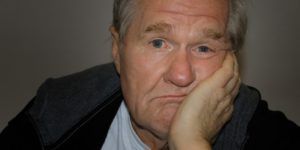
- Why am I doing this?
- Do I want to do this?
- What do I want to do?
These questions are also repackaged in popular psychology and leadership self-help books, such as Find Your Why (Sinek, Mead, & Docker, 2017) and How to Find Your Passion and Purpose (Gaisford, 2017).
Observant readers might comment that these are questions typically asked about our vocations or professional activities. However, people who are unemployed or employed part time also ask questions such as these and seek a meaningful life. These questions are easily repurposed for other spheres of our lives.
Before we can answer the question of how to find meaning, we first need to consider what is meant by ‘meaning.’
Psychological researchers conduct research and measure psychological constructs such as happiness, depression, and intelligence. However, constructs first need to be defined before they can be measured.
Although ‘meaningfulness’ is often confounded with other constructs such as purpose, coherence, and happiness, some researchers argue that these constructs are not interchangeable, but instead form a complex relationship and exist separately.
For example, Steger, Frazier, Oishi, and Kaler (2006) posit that meaning consists of two separate dimensions: coherence and purpose. Coherence refers to how we understand our life, whereas purpose relates to the goals that we have for our life.
Reker and Wong (1988) argue that meaningfulness is better explained and understood using a three-dimensional model consisting of coherence, purpose, and a third construct: significance. Significance refers to the sense that our life is worth living and that life has inherent value. Together, these three constructs contribute to a sense of meaningfulness.
In some research, coherence, purpose, and significance have been reframed as motivational and cognitive processes. Specifically, Heintzelman and King (2014) suggest a model with three components: goal direction, mattering, and one’s life making sense.
Goal direction and mattering are both motivational components and synonymous with purpose and significance, respectively. The third component – one’s life making sense – is a cognitive component, akin to significance.
Together, these three components – coherence, purpose, and significance – result in feelings of meaningfulness. Knowing that meaningfulness is derived from three distinct fields, let’s look at ways in which we can find our meaning.
Finding something to live and die for – Einzelganger
How can we go about finding our meaning? First, there is no single panacea to the sense of living without meaning. Finding meaning is ultimately a personal journey. What brings me meaning might not bring you meaning. However, this doesn’t mean that the techniques used to find meaning won’t be helpful. Viktor Frankl (1959, p. 99) supported the notion that finding meaning is a unique journey when he wrote in Man’s Search for Meaning :
Man’s search for meaning is the primary motivation in his life and not a “secondary rationalization” of instinctual drives. This meaning is unique and specific in that it must and can be fulfilled by him alone; only then does it achieve a significance that will satisfy his own will to meaning.
With this mind, consider the following suggestions in your quest to find meaning:
1. Foster a passion (purpose)
Vallerand (2012) argues that either motivation or passion drives our desire and interest in activities.
Motivation is useful for activities that are considered dull (e.g., washing the dishes), whereas passion is the driving force for activities that have significance for us.
Passion can be negative or positive, however. Negative passions, referred to as obsessive passions, are maladaptive and lead to unhealthy behaviors; these types of passions should be avoided. On the other hand, positive, harmonious passions improve our behavior and lead to optimal functioning.
Vallerand (2012) found that people who had more harmonious relationships with their passions also had stronger relationships with the people who shared their passions.
2. Develop and foster social relationships (purpose, significance)
Making connections with other individuals and maintaining these relationships are reliable ways to develop a sense of meaningfulness (Heintzelman & King, 2014).

Download 3 Meaning & Valued Living Exercises (PDF)
These detailed, science-based exercises will equip you or your clients with tools to find meaning in life help and pursue directions that are in alignment with values.
Download 3 Free Meaning Tools Pack (PDF)
By filling out your name and email address below.
3. Relationships that increase your sense of belonging (significance)
Although social connections are important, not all social relationships are equal. Make sure to focus on relationships that make you feel like you ‘belong’ (Lambert et al., 2013), where you feel like you fit in with the members of that group, and where there is group identification.
Participants who were asked to think of people with whom they felt that they belonged reported higher ratings of meaningfulness compared to participants who remembered instances when they received help or support, or instances when they received positive compliments or statements of high social value (Lambert et al., 2013).
These findings also tie in with the negative impact of ostracism on the sense of meaning (Williams, 2007). If you feel like you don’t belong, then you have a lower sense of meaningfulness.
4. Monitor your mood (coherence)
Experimental laboratory studies have demonstrated a temporal relationship between positive mood and sense of meaning. Inducing a positive mood results in higher reports of meaning (for a review, see Heintzelman & King, 2014).
Managing your mood can be difficult. However, there are some techniques that you can use; for example, make time for interests and hobbies, get enough sleep, exercise regularly, eat healthily, and consider developing a mindfulness practice (e.g., through meditation).
5. Take control of your environment (coherence)
A cognitively coherent environment can boost ratings of meaningfulness (Heintzelman & King, 2014).
Heintzelman and King (2014) suggest that routines, patterns (which could refer to your behavior and the behavior of your family), time blocking, and clean environments can all contribute to an increased ability to make sense of one’s environment, which in turn can lead to an increased sense of meaningfulness.
Simple ways to induce a cognitively coherent environment would be to implement a fixed routine, schedule time for unexpected tasks (e.g., “emergencies” delivered via email), formally schedule downtime for exercise and passions, and maintain a tidy environment (in other words, your desk is not the place for all those dirty coffee mugs).
However, do not be unreasonable with your expectations of your environment. Unexpected challenges will pop up. Your child might have a meltdown, or you might drop a box of eggs on the floor, but these experiences will have less of a negative impact if you already have a sense of control over your environment.

We are also likely to experience multiple losses as we age. We may lose our parents, our partners, face layoffs, or develop an illness. The stereotypical concept of an older adult is of someone who is frail and requires care; however, older age is not synonymous with a less meaningful or valuable life.
In fact, many older adults live incredibly long, busy lives, and their positive psychological profiles act as a buttress against illness, loneliness, and depression. There is vast evidence that centenarians have very positive attitudes and psychological traits and few negative personality traits.
Centenarians are more relaxed and easygoing (Samuelsson et al., 1997), place a great deal of importance on social relationships and events (Wong et al., 2014), have a more positive life attitude in general (Wong et al., 2014), and report low anxiety (Samuelsson et al., 1997).
These positive aging traits and attitudes, coupled with the few negative traits, act as a protective buffer against depression, illness, and loneliness (Jopp, Park, Lehrfeld, & Paggi, 2016; Keyes, 2000), and contribute to the longevity of centenarians.
It is difficult to change your personality traits suddenly; however, it is possible to change your thinking patterns by working with a therapist trained in Cognitive-Behavioral Therapy. Your therapist can help you identify and change negative patterns of thinking and behavior, and help you to adopt a positive pattern of thinking.
Centenarians greatly value their social experiences and are actively involved in social events (Wong et al., 2014).
It can be difficult for older adults to make new social connections, especially after retirement, because the ‘natural environment’ for meeting new people, such as the workplace, is removed. However, this doesn’t mean that there aren’t ways for older adults to meet new people and form new relationships.
With retirement comes more free time and possibly an opportunity to develop a new hobby or passion. And as we previously mentioned, finding a passion is one way to develop meaning. Vallerand (2012) provides an excellent summary of the role that motivation plays in developing passion and how passion leads to a meaningful life.
If you are an older adult, then perhaps this is good time in your life to start. Remember that positive (rather than negative/obsessive/maladaptive) passions are born from the positive association made with particular activities (Vallerand, 2012). These passions are activities that we find time for, that we invest in, and that we embody.
For example, if you have a passion for painting, you will carve out time to paint, experience a great deal of happiness when you complete the activity, and may embody that passion in your understanding of your identity (e.g., you may consider yourself a ‘painter’). Embodying the activity into your understanding of your self-concept is one of the first steps toward laying habits (Clear, 2018).
Harmonious passions (Vallerand, 2012) play a vital role in how we find meaning in our lives.
These positive passions are worth developing. Not only do they help us find meaning in our lives, but older adults who do have a ‘passion’ also score higher on measures of psychological wellbeing. They report higher life satisfaction, better health, more meaning in their lives, and lower anxiety and lower depression than adults without a passion (Rosseau & Vallerand, 2003, as cited in Vallerand, 2012).
To summarize, it appears that centenarians adopt a positive mindset and psychological traits and value their social relationships. These factors may contribute to a longer, more meaningful life and protect against illness and depression. Fostering interests and hobbies is another way to find meaning in your life, buttressing against negative feelings and thoughts.
So, what can you do to find meaning in your life as you age? The following list can give you some guidance:
1. Make time for friends, family, and social events
It’s easy to neglect social relationships in favor of alone time (which is also important) or work deadlines, but promoting these relationships will have a more positive impact in the long term. If you are the type of person who forgets to see friends or family, add a reminder to your calendar.
2. Start now to develop a new hobby or interest
Carve out some time for your own interest and commit to that time. If you have a partner, ask your partner to shoulder other responsibilities during that time so that you can indulge your interests.
3. Express what makes you happy
If you’re in the early stages of developing a new hobby, it might help to express what you enjoy about the hobby. Consider writing a journal entry about what you enjoyed or tell your partner/friends/family members about your new hobby.
Expressing why you enjoy the hobby helps to build and strengthen positive associations with the hobby.
4. Share your hobby
Try to find a group of like-minded individuals who enjoy the same interest that you do. If you like painting, consider joining an art class.
Or perhaps you want to learn a new language. Try to find people who are also learning this language and watch a film in that language together.
5. Aim to engage and invest in your community
Simple acts such as greeting and chatting to your neighbors, talking to the vendors at your local stores and neighborhood markets, and participating in neighborhood events will help you to develop relationships with your community members.
With time, these relationships will deepen and become more meaningful. Furthermore, recognize that as an older adult, you can offer a great deal to your community. You have lived through numerous life experiences, career/professional/vocational decisions, and family decisions. You have a wealth of knowledge that you can share with your community.
Older adults who regularly engage in their favorite pastimes and who have a healthy, positive relationship with their favorite activity have better psychological functioning.
Each of us must become impassioned, finding meaning and self-fulfillment in our own life’s journey.
Alexandra Stoddard
Life is difficult. Not just for me or other ALS patients. Life is difficult for everyone. Finding ways to make life meaningful and purposeful and rewarding, doing the activities that you love and spending time with the people that you love – I think that’s the meaning of this human experience.
Steve Gleason
For the meaning of life differs from man to man, from day to day and from hour to hour. What matters, therefore, is not the meaning of life in general but rather the specific meaning of a person’s life at a given moment.
Viktor E. Frankl
I don’t like work – no man does – but I like what is in the work – the chance to find yourself. Your own reality – for yourself not for others – what no other man can ever know. They can only see the mere show, and never can tell what it really means.
Joseph Conrad
There is something infantile in the presumption that somebody else has a responsibility to give your life meaning and point… The truly adult view, by contrast, is that our life is as meaningful, as full and as wonderful as we choose to make it.
Richard Dawkins
Old friends pass away, new friends appear. It is just like the days. An old day passes, a new day arrives. The important thing is to make it meaningful: a meaningful friend – or a meaningful day.
Dalai Lama XIV
I believe that I am not responsible for the meaningfulness or meaninglessness of life, but that I am responsible for what I do with the life I’ve got.
Hermann Hesse
It’s not how much money we make that ultimately makes us happy between nine and five. It’s whether or not our work fulfills us. Being a teacher is meaningful.
Malcolm Gladwell
My mission in life is not merely to survive, but to thrive; and to do so with some passion, some compassion, some humor, and some style.
Maya Angelou

World’s Largest Positive Psychology Resource
The Positive Psychology Toolkit© is a groundbreaking practitioner resource containing over 500 science-based exercises , activities, interventions, questionnaires, and assessments created by experts using the latest positive psychology research.
Updated monthly. 100% Science-based.
“The best positive psychology resource out there!” — Emiliya Zhivotovskaya , Flourishing Center CEO
We have different types of resources that you will find useful in helping you live a meaningful life:
1. From Our Worksheet Library
In Japanese culture, to find meaning and purpose in life is to find one’s ikigai . We have a fantastic and in-depth exercise called Identifying Your Ikigai , which takes you through a series of steps to assess and help you find your fulfilling meaning in life.
Living a life with meaning and value can make you happier, more content, more resilient through hard times, and more likely to influence the lives of others.
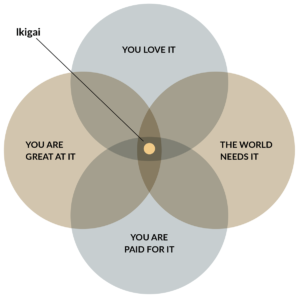
If you are filled with questions about what you should do with your life and what really matters, then the Uncover Your Purpose worksheet is for you. It has several tough questions, but if you can answer them honestly and comprehensively, it will shine a light on the path you are meant to follow.
2. 17 Meaning & Valued Living Exercises
If you’re looking for more science-based ways to help others discover meaning, this collection contains 17 validated meaning tools for practitioners. Use them to help others choose directions for their lives in alignment with what is truly important to them.
Finding meaning in life is a journey that could start with something as simple as a pen and paper, deep reflection, and one of our tools mentioned above. Or your journey could start by stepping out the door and connecting with a neighbor, making a newfound friend, or starting a hobby you have wanted to explore but never got around to.
During your journey, you might that having meaning in life is not about yourself, but serving others.
Selfless service is often discovered to be the ultimate pinnacle of having a meaningful life, and many intriguing conversations with service workers, nurses, aid workers, and volunteers illustrate how they enjoy a meaningful life by serving others.
We hope that after reading this article you will also embark on this journey to find meaning in your life. We shared many different strategies you can implement when looking for that ultimate answer, and we sincerely hope that when you have found your ikigai , you will make changes to actively live that life of meaning. If some of the strategies do not work for you, try another suggestion from the list.
Most important is to find a meaning that makes sense to you and recognize that this meaning might change as you go through different stages of your life.
We hope you enjoyed reading this article. Don’t forget to download our three Meaning and Valued Living Exercises for free .
- Clear, J. (2018). Atomic habits: An easy & proven way to build good habits & break bad ones. Random House.
- Frankl, V. (1959). Man’s search for meaning . Beacon Press.
- Gaisford, C. (2017). How to find your passion and purpose: Four easy steps to discover a job you want and live the life you love (The art of living) . Blue Giraffe Publishing.
- Heintzelman, S. J., & King, L. A. (2014). Life is pretty meaningful. American Psychologist , 69 (6), 561–574.
- Jopp, D. S., Park, M. K. S., Lehrfeld, J., & Paggi, M. E. (2016). Physical, cognitive, social, and mental health in near-centenarians and centenarians living in New York City: Findings from the Fordham Centenarian Study. BMC Geriatrics , 16 .
- Keyes, C. L. M. (2000). Promoting and protecting mental health as flourishing: A complementary strategy for improving national mental health. American Psychology, 62 (2), 92–108.
- Lambert, N. M., Stillman, T. F., Hicks, J. A., Kamble, S., Baumeister, R. F., & Fincham, F. D. (2013). To belong is to matter: Sense of belonging enhances meaning in life. Personality and Social Psychology Bulletin, 39 (11), 1418–1427.
- Reker, G. T., & Wong, P. T. P. (1988). Aging as an individual process: Toward a theory of personal meaning. In J. E. Birren & V. L. Bengston (Eds.), Emerging theories of aging (pp. 214–246). Springer.
- Samuelsson, S. M., Alfredson, B. B., Hagberg, B., Samuelsson, G., Nordbeck, B., Brun, A., … Risberg, J. (1997). The Swedish centenarian study: A multidisciplinary study of five consecutive cohorts at the age of 100. International Journal of Aging and Human Development, 45 (3), 223–253.
- Sinek, S., Mead, D., & Docker, P. (2017). Find your why: A practical guide for discovering purpose for you and your team. Portfolio.
- Steger, M. F., Frazier, P., Oishi, S., & Kahler, M. (2006). The meaning in life questionnaire: Assessing the presence of and search for meaning in life. Journal of Counseling Psychology , 53 , 80–93.
- Vallerand, R. J. (2012). From motivation to passion: In search of the motivational processes involved in a meaningful life. Canadian Psychology/ Psychologie Canadienne, 51 (1), 42–52.
- Williams, K. D. (2007). Ostracism. Annual Review of Psychology, 58 , 425–452.
- Wong, W. C., Lau, H. P., Kwok, C. F., Leung, Y. M, Chan, M. Y., & Cheung, S. L. (2014). The well-being of community-dwelling near-centenarians and centenarians in Hong Kong: A qualitative study. BMC Geriatrics, 14 (63), 1–8.
Share this article:
Article feedback
What our readers think.
This post was truly worthwhile to read. I wanted to say thank you for the key points you have pointed out as they are enlightening.
As an elder stateman I congratulate you all on a job well done.
God Bless you all. Yours Sincerely Thomas A Mc Henry (Ret ‘d) ( Yesterday’s Man)
This concept of Ikigai is the best. It set apart this article from others that just say “Find something you like” and gave a visual representation of what finding meaning is. I recently discovered something I am passionate about, am good at in some ways (although I need professional training and knowledge), and would like to work in as a career. In fact, this site led me to the realization that I would like to pursue that occupation. There’s an endless goldmine of useful information on this site.
Really great article thank you. As an Occupational Therapist in mental health ‘meaningful occupation ‘ is at the core of my philosophy. Your article puts the concept very concisely and has some excellent quotes and explanations to illustrate a meaningful life that so many people struggle to comprehend.
Please correct the dates of Marcus Aurelius’ reign. Thank you for the article. Agape
Hi Agape, Good spotting! We’ll pass this onto our editing team. Kind regards, Nicole
Thank you! This is a very informative article. Here are very detailed steps to identify your calling, your life purpose. Unfortunately, life can’t be that simple, and to realize your meaning, you need to gain and comprehend life experience. I can’t rationally think things over when I don’t feel it emotionally. I hope you know what I mean. I can’t find my calling because I don’t feel that’s what I want to do. And I can’t answer the rest of the questions at the beginning of this article unambiguously. Well, it turns out I have a lot of work to do on myself…
Hey mate 🙂 , How are you ? Spinoza states something like that : “to realize your meaning, you need to gain and comprehend life experience.” Check out this guy Spinoza, Ethics ” For the meaning of life differs from man to man, from day to day and from hour to hour. What matters, therefore, is not the meaning of life in general but rather the specific meaning of a person’s life at a given moment. ” I guess the point is to try doing things to find out what makes you happy and your life meaningfull: “I believe that I am not responsible for the meaningfulness or meaninglessness of life, but that I am responsible for what I do with the life I’ve got.” So if u want to know more about it u can search for SPINOZAS theory
I have the same work I need to do myself. This has opened up alot of questions that I don’t have easy answers to. I will take steps, small steps but I must fulfill this in my life in some way. I believe this will help me in great ways.
Let us know your thoughts Cancel reply
Your email address will not be published.
Save my name, email, and website in this browser for the next time I comment.
Related articles

Existential Crisis: How to Cope With Meaninglessness
Recent statistics suggest that over a quarter of UK nationals feel a deep sense of meaninglessness (Dinic, 2021). In the wake of multiple global economic, [...]

9 Powerful Existential Therapy Techniques for Your Sessions
While not easily defined, existential therapy builds on ideas taken from philosophy, helping clients to understand and clarify the life they would like to lead [...]

15 Values Worksheets to Enrich Clients’ Lives (+ Inventory)
It’s not always easy to align our actions with our values. And yet, by identifying and exploring what we find meaningful, we can learn to [...]
Read other articles by their category
- Body & Brain (50)
- Coaching & Application (58)
- Compassion (25)
- Counseling (51)
- Emotional Intelligence (23)
- Gratitude (18)
- Grief & Bereavement (21)
- Happiness & SWB (40)
- Meaning & Values (26)
- Meditation (20)
- Mindfulness (44)
- Motivation & Goals (45)
- Optimism & Mindset (34)
- Positive CBT (30)
- Positive Communication (22)
- Positive Education (47)
- Positive Emotions (32)
- Positive Leadership (19)
- Positive Parenting (16)
- Positive Psychology (34)
- Positive Workplace (37)
- Productivity (18)
- Relationships (44)
- Resilience & Coping (39)
- Self Awareness (21)
- Self Esteem (38)
- Strengths & Virtues (32)
- Stress & Burnout Prevention (34)
- Theory & Books (46)
- Therapy Exercises (37)
- Types of Therapy (64)
3 Meaning Exercises Pack (PDF)
- Không đỡ nổi
- Câu nói hay
- Đổi cuộc đời
- Lòng trắc ẩn
- Nguyễn Quỳnh Anh
- Vương Minh Thu
- Vũ Thu Phương
- Nguyễn Ngọc Hồng Nhung
- Lê Phương Bảo Châu
- Nguyễn Thanh Thanh
- Nguyễn Yến My
- Nguyễn Bích Nhàn
- Trần Ngọc Lân

"Họa từ miệng mà ra" đó ạ!. Photo by krakenimages on Unsplash "Drop a brick/clanger" có drop là tình cờ thốt ra/nói ra,...

Poker face. Photo courtesy: Gianni Giatilis "Keep a stiff upper lip" có từ "stiff" là cứng rắn, kiên quyết = giữ ...

"Trump chỉ nói mà không làm." Photo by Christian Pierret "All hat and no cattle" = đều đội mũ và không có gia súc...

Thổi đi rồi hẵng ăn -_- Photo by: Thanh Tran on Unsplash "Hold a candle to" = giữ cây nến -> dùng để so sánh, có nghĩa ...

Photo by Anna King “Pour with rain” -> nghĩa là mưa như trút nước. Ví dụ Unfortunately this bout of good weather will be ...

The historic Tamworth Castle in Tamworth, Staffordshire. Dates from the 11th century (rebuild by the Normans). Was home of the Mercian kin...

Chán các bạn quá!! Photo by: Nathan Cowley on Pexels "Push someone's buttons" = bấm nút của ai -> nghĩa là làm nhữn...

Ngoài kia còn biết bao thứ bổ ích!!! Photo by Vladyslav Tobolenko on Unsplash "Touch some grass" -> câu nói khuyên ai đó nên r...

Âm mưu thao túng giá dầu gây ra 27% tổng mức tăng lạm phát năm 2021 đơn khiếu nại từ công ty luật khởi kiện tập thể ở Kansas City, Sharp Law...

toàn cầu hóa không chỉ là thương mại, còn cả trung gian tài chính... _____ Phát triển đòi hỏi giúp được người nghèo tìm đường từ nông trại đ...

vô hình và thấy khó hơn nhưng vẫn là những lựa chọn _____ Những lựa chọn có chủ ý và được chú ý thì rõ ràng. “Vani hay sô-cô-la?” Nhưng hầu ...

Khi chính quyền Trump quyết định vào năm 2018 áp đặt mức thuế 25% lên tất cả loại thép nhập khẩu, những đánh đổi về việc làm đã xuất hiện......

Dow Jones lại “lật mặt” tăng mạnh sau khi PCE công bố trùng dự báo khiến kỳ vọng Fed giảm lãi suất tăng lên PCE - Personal Consumption Expen...

phỏng vấn ứng viên marketing toàn thể ban lãnh đạo, team biên tập, sales của timesbiz cùng tham gia phỏng vấn ứng viên hoàng minh đức cho vị...

Anh đã lỗ 400 triệu đô khi đầu tư vào Netflix như thế nào? "We are long term investor". Bắt đáy, tuyên bố mình đầu tư dài hạn, nó ...

ngày hôm nay, 30.5, chúng ta cùng thống nhất với nhau rằng: thực học là nền tảng của thành công, tiền phải được tạo ra từ lao động ~ mr. hoà...

vinh dự được gặp và nghe anh hoàng nam tiến chia sẻ về trải nghiệm khách hàng xuất sắc trong kỷ nguyên "sóng thần công nghệ"...^.^...

15 mẹo đọc sách từ những nhân vật lớn cùng lời bình của Mao Tôn Cương, 😉 1. Elon Musk - Đọc có mục tiêu cụ thể: Musk thường đặt ra mục tiêu...

photo courtesy: nikhita s Nếu khó khăn đừng đổ cho số phận Nhìn lại mình có cố gắng không thôi Sống làm người ..phải giữ lấy cái tôi Bùn dướ...

qua thăm showroom mới mở của ông bạn ptth hà nội 94-97, rộng rãi, khoáng đạt, sạch sẽ, tinh tươm... ko thể chê ở điểm nào phần trưng bày sản...

🔻 Một bài điểm sách của Bill Gates về cuốn Sapiens - Lược sử Loài người rất công phu, với những thảo luận mang tính xây dựng dù lẽ ra nên m...

trong 4 năm qua, các sách mới do dịch giả Linh Hoang Vu dịch và "bà đỡ mát tay" Vu Trong Dai phát hành đã "cháy hàng" vớ...

Lừa cãi Hổ: - "Cỏ có màu xanh biển". Hổ đáp: - "Không, cỏ xanh lá." Cãi nhau mãi không xong; cả hai đi gặp sư tử, Vua rừ...

... Theo mình, vấn đề và trách nhiệm lớn hơn thuộc về quản lý của chính quyền. Nghe nói năm trước sau vụ cháy chung cư mini 54 người chết (v...

photo credit: ntdvn Sự xuất hiện của thầy Minh Tuệ sẽ không làm tăng số lượng “Phật tử” ở Việt Nam. Ngược lại, sẽ làm giảm đáng kể những ngư...

Nhiều năm trước, khi xuất bản một cuốn sách về lịch sử Do Thái, lúc duyệt bản in cuối, tôi thấy sốc khi đọc đoạn mô tả về gia tộc Rothschild...

photo courtesy: stefan johnson Bác Murthy là người rất chú ý đến sự rạch ròi minh bạch trong corporate governance. Chính bác là người đề xuấ...

77 Beautiful Journey Quotes & Captions To Inspire An Inner Awakening
Searching for some words to accompany your own journey? I’ve compiled the best list out there of the most beautiful journey quotes to inspire and uplift you…
Maybe the most famous quote about journeys that millions across the globe know is from Lao Tzu. The ancient Chinese philosopher once said, “a journey of a thousand miles begins with a single step.” And since then, adventurers, journeyers and wanderers have passed on their own journey inspiration.
Whether your journey is a metaphorical or literal one, you will love my list of the best journey quotes that are guaranteed to lift you up and propel you forward.
These are the 77 best journey quotes.

The Best Journey Quotes
You may recognize a number of these quotes about journeys, as they come from the minds of some of the greatest individuals throughout history. These writers, leaders, musicians and adventurers understand the power of a life changing journey.
1) “If you can’t fly, then run, if you can’t walk run, then walk, if you can’t walk, then crawl, but by all means keep moving.” – Martin Luther King Jr.
2) “the road of life twists and turns and no two directions are ever the same. yet our lessons come from the journey, not the destination.” – don williams, jr., 3) “the best part of life is to decide to make the journey through life like a best selling book. tell a fantastic story when you are ready to tell others how you did it. make sure life the best story ever written through a journey filled with overcoming obstacles, taking risks, and continuing to develop.” – catherine pulsifer, 4) “we are travelers on a cosmic journey, stardust, swirling and dancing in the eddies and whirlpools of infinity. life is eternal. we have stopped for a moment to encounter each other, to meet, to love, to share. this is a precious moment. it is a little parenthesis in eternity.” – paulo coelho.

5) “If ever there was a metaphor to illustrate the importance of the journey over the destination, it is life itself. For everyone who departs from birth is destined for death, so the journey IS life. Savor it!” – Michele Jennae
6) “life is a journey, and if you fall in love with the journey, you will be in love forever.” – peter hagerty, 7) “the secret of getting ahead is getting started. the secret of getting started is breaking your complex, overwhelming tasks into small manageable tasks, and then starting on the first one.” – mark twain, 8) “it is good to have an end to journey toward; but it is the journey that matters, in the end.” – ernest hemingway.

9) “To finish the moment, to find the journey’s end in every step of the road, to live the greatest number of good hours, is wisdom.” – Ralph Waldo Emerson
10) “our battered suitcases were piled on the sidewalk again; we had longer ways to go. but no matter, the road is life.” ― jack kerouac, 11) “in order to complete our amazing life journey successfully, it is vital that we turn each and every dark tear into a pearl of wisdom, and find the blessing in every curse.” – anthon st. maarten, 12) “this thing we call life is not a destination with an end but a path down which we continue to journey as long as we can breath. life is to be lived not squandered or to give away waiting for the end to close upon us.” – byron pulsifer.

13) “Don’t judge each day by the harvest you reap, but by the seeds that you plant.” – Robert Louis Stevenson
14) “life should not be a journey to the grave with the intention of arriving safely in a pretty and well preserved body, but rather to skid in broadside in a cloud of smoke, thoroughly used up, totally worn out, and loudly proclaiming “wow what a ride”” – hunter s. thompson, 15) “sooner or later we must realize there is no station, no one place to arrive at once and for all. the true joy of life is the trip.” — robert j. hastings.

Short Journey Quotes
Quotes don’t have to be lengthy to capture the spirit of what they are trying to convey. These short journey quotes say so much with so little words.
16) “A journey of a thousand miles begins with a single step.” – Lao Tzu
17) “learn to trust the journey, even when you do not understand it.” – lolly daskal, 18) “a journey is time suspended.” – louis l’amour, 19) “take voyages. attempt them. there’s nothing else.” ― tennessee williams.

20) “I’m an idealist. I don’t know where I’m going, but I’m on my way.” — Carl Sandburg
21) “stop worrying about the potholes in the road and celebrate the journey.” – fitzhugh mullan, 22) “life’s a journey, not a race.” – unknown, 23) “life is a journey. when we stop, things don’t go right.” – pope francis.

24) “It is good to have an end to journey toward, but it is the journey that matters in the end.” ― Ursula K. Le Guin
25) “you must remain focused on your journey to greatness.” – les brown, 26) “i tramp a perpetual journey.” ― walt whitman, 27) “the real voyage of discovery consists not in seeking new landscapes, but in having new eyes.” – marcel proust.
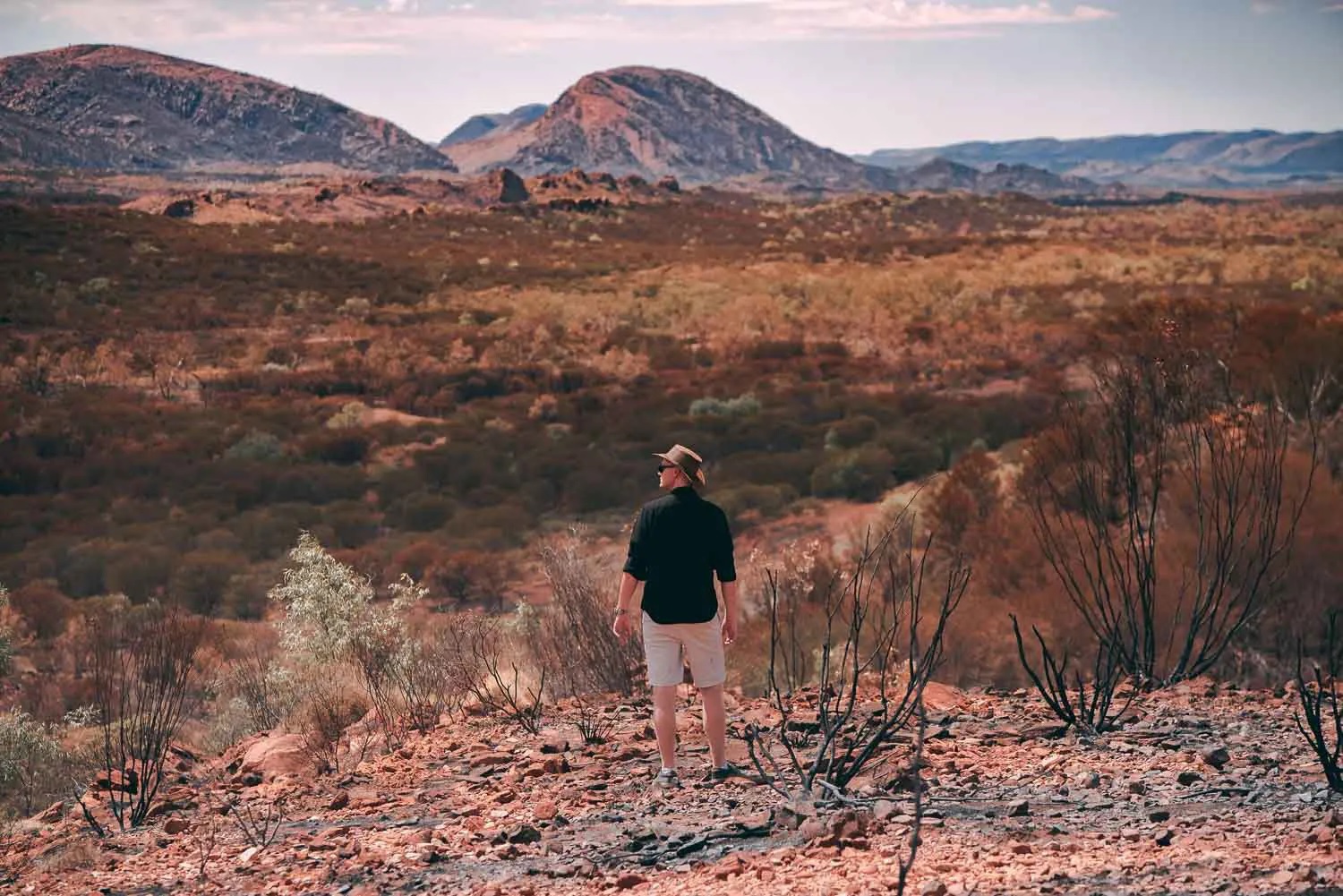
28) “It’s not the years in your life that count. It’s the life in your years.” – Abraham Lincoln
29) “life is about waking up. it is a journey of discovery and you’ve already bought the ticket and are sitting on the train.” – michael sheridan,, 30) “the only impossible journey is the one you never begin.” – tony robbins, 31) “without music, life is a journey through a desert.” – pat conroy.

32) “What you learn in tough times can be used in many ways to bless your personal life journey.” – Scott Gordon
33) “accomplishments will prove to be a journey, not a destination.” – dwight d. eisenhower.

Inspiring Journey Quotes
Searching for the courage to take the first steps on your own journey? These inspiring journey quotes will light a fire under you, guaranteed to give you the courage you seek.
34) “I discovered that a fresh start is a process. A fresh start is a journey – a journey that requires a plan.” – Vivian Jokotade
35) “if you do what you’ve always done, you’ll get what you’ve always gotten.” – unknown, 36) “you don’t have to understand my journey. you just need to respect it.” – izey victoria odiase, 37) “when setting out on a journey do not seek advice from someone who never left home.” – rumi, 38) “to get through the hardest journey we need take only one step at a time, but we must keep on stepping.” – chinese proverb, 39) “you have learned a lot, but there are still lots of learning for you as you journey through life. never stop learning.” – kate summers, 40) “when you’re on a journey and you come to a wall, always throw your pack over first, because then you will be sure to follow.” – yongey mingyur rinpoche, 41) “ big things have small beginnings.” – prometheus.

42) “Life is a journey that have a lot different paths, but any path you choose use it as your destiny.” ― Ryan Leonard
43) “this is your journey, your body, your mind, and your spirit. dig deep, own it, and start doing things for you and by you.” – unknown author, 44) “as you journey down the path, don’t forget to be present moment-by-moment and absorb the beauty and richness of simply being alive.” – cary david richards, 45) “life is a journey of either fate or destiny. fate is the result of giving in to one’s wounds and heartaches. your destiny unfolds when you rise above the challenges of your life and use them as divine opportunities to move forward to unlock your higher potential.” – caroline myss.

46) “Temporary setbacks create opportunities for fresh commitment and renewal. There are seasons of sunshine as well as rain.” – T. D. Jakes,
47) “i believe that life is a journey, often difficult and sometimes incredibly cruel, but we are well equipped for it if only we tap into our talents and gifts and allow them to blossom.” – les brown, 48) “to find your confidence, get out of your comfort zone, overcome your fears, and begin the journey to discover and accomplish what you want to do with your life.” – doretha dingler.

Journey Instagram Quotes & Captions
Need a fantastic quote about journeys to accompany your own inspiring Instagram upload? These Instagram journey captions and quotes say so much in just the right amount of characters.
49) “Good company in a journey makes the way seem shorter.” – Izaak Walton
50) “always say yes to new adventures.”, 51) “it is better to travel well than to arrive.” – arthur c. custance, 52) “always take the scenic route.”.

53) “Travel is the only thing you buy that makes you richer.”
54) “don’t listen to what they say, go and see it for yourself.”, 55) “what’s on my bucket list everywhere.”, 56) “on a hard jungle journey, nothing is so important as having a team you can trust.” – tahir shah.

57) “Travel not to find yourself, but to remember where you have been all long.”
58) “don’t spend your money on things. spend it on experiences”, 59) “leap and the net will appear.” – zen proverb, 60) “all journeys have secret destinations of which the traveler is unaware.” ― martin buber, 61) “life is journey, travel it well.” – unknown.

Funny Journey Quotes
These funny quotes about journeys are short, punchy and shine a humorous light on some of the many obstacles a journey may come up against.
62) “Before you embark on a journey of revenge, dig two graves.” – Confucius
63) “me: “i want to travel more”, the bank account: “”like, to the park”, 64) “i have panicked unnecessarily in all four corners of the globe.” – jon ronson, 65) “good things come to those, who book flights.”.

66) “A journey is like marriage. The certain way to be wrong is to think you control it.” – John Steinbeck
67) “i crossed a time zone and i feel younger already. if i keep traveling west, i can become immortal” – jarod kintz, 68) “sometimes the road less traveled is less traveled for a reason.” – jerry seinfeld.

Celebrity Journey Quotes
Actors, entrepreneurs, musicians and more are the minds behind these poignant celebrity journey quotes that are sure to inspire and make you smile.
69) “The key to realizing a dream is to focus not on success but significance, and then even the small steps and little victories along your path will take on greater meaning.” – Oprah Winfrey
70) “sometimes it’s the journey that teaches you a lot about your destination.” – drake, 71) “you can handle just about anything that comes at you out on the road with a believable grin, common sense and whiskey.”– bill murray, 72) “you can’t connect the dots looking forward; you can only connect them looking backward. so you have to trust that the dots will somehow connect in your future. you have to trust in something; your gut, destiny, life, karma, whatever. this approach has never let me down, and it has made all the difference in my life.” – steve jobs.

73) “The main thing that you have to remember on this journey is, just be Nice to everyone and always smile.” – Ed Sheeran
74) “you take people, you put them on a journey, you give them peril, you find out who they really are.” – joss whedon, 75) “if all difficulties were known at the outset of a long journey, most of us would never start out at all.” – dan rather, 76. “every day is a new journey for me, and i feel like, in my lifetime, i’ve been blessed to experience such a lot.” – bindi irwin, 77) “not everyone will understand your journey. that’s okay. you’re here to live your life, not to make everyone understand.” – banksy.

Did I miss any great journey quotes?
Is there a journey quote I missed off my list that is one of your personal faves and that you want to share? Reach out to me with the quote, and I’ll see if I can add it to the my list of the best quotes about journeys!

Looking for inspiration for your next travel journey?
The quotes that made my list could really sum up so many journeys travelers take every day across the world. I’m a travel blogger who has traveled across the globe, and as a result my site has a huge variety of inspiring travel content. Accommodation guides, music festival guides, itineraries, city guides and so much more await you. Get started with some of my most popular travel content.
- 37 California Music Festivals That’ll Keep You Dancing All Year Long
- The ULTIMATE Bali Itinerary | How to Plan the Perfect Bali Vacation
- 30 Music Festivals in Europe to Experience Before You Die
- Thailand Itinerary 10 Days | How to Spend the Perfect 10 Days in Thailand
- 16 Amazing Japan “Off the Beaten Path” Destinations & Hidden Gems
- EDM FESTIVALS | The 20 Best Electronic Music Festivals in the USA
- The Ultimate 2 Days in Barcelona Itinerary & Travel Guide
- The Ultimate 2 Days in Kuala Lumpur Itinerary & Travel Guide
- The Ultimate 4 Days in Paris Itinerary & Travel Guide
- 51 Fun & Inspirational Sunset Quotes To Inspire Your Next Adventure

What’s your favorite journey quote?
Share this list with your journey travel crew, leave a reply, leave a reply cancel reply.
Your email address will not be published. Required fields are marked *
Save my name, email, and website in this browser for the next time I comment.
Photography Gear
Work With Me
Privacy Policy
Destinations
Music Festivals
Travel Itineraries
Inspiration
Travel Gifts
Southeast Asia
Embark on a Journey of Life: Exploring the Pathway’s Prose

In our journey through life, we navigate a complex and ever-changing pathway, encountering diverse experiences, challenges, and moments of joy. It is a journey marked by significant milestones, lessons, and the pursuit of meaning and fulfillment. Along the way, we ponder the meaning of life, seek our purpose, and grapple with the obstacles that come our way. How do we grow and evolve as we encounter these challenges, and where do we find happiness and contentment? These questions shape our understanding of the journey of life and the legacy we hope to leave behind.
Join us as we explore the pathways of life, the lessons we learn, and the moments that shape us in our quest for happiness and fulfillment.
Key Takeaways:
- Life is a journey filled with different paths, challenges, and lessons.
- Finding our purpose and overcoming obstacles are key to achieving fulfillment in life.
- By leaving a positive impact and finding joy, we can create a meaningful legacy on our journey of life.
10 Amazing Poems About The Journey of Life
1. pathways unfold.
In life’s journey, a path winds and bends, A story that twists, turns, and extends. Each step, a tale of dreams and fears, Years of laughter, joy, and tears.
We walk in the light, and sometimes in the dark, Marking our trail with an indelible mark. Life’s road with its highs and lows, Shows us where the heart truly goes.
Through forests of doubt and fields of hope, We cope, finding ways to adapt and cope. In every journey, a lesson learned, Earned in the miles we’ve traversed and turned.
Life, a journey of endless scope, In every step, a chance to grow, to cope. A path unique, with stories untold, Bold in its unfolding, a sight to behold.
Did You Know? The longest walking route on Earth is the proposed Transglobal Highway, a network of roads and ferries that would connect most of the continents on Earth. This remarkable journey would span approximately 33,000 kilometers (20,500 miles), offering a unique way to experience diverse cultures and landscapes. More about this epic journey can be explored through the Transglobal Highway project .
2. River of Time
Life flows like a river, steady and true, Through new and old, through the past and new. Its current strong, with moments swift, Adrift in time’s unceasing shift.
In the waters of life, we find our way, Day by day, in the flow and sway. Through calm streams and turbulent tide, We ride, with time as our guide.
Each bend brings a new sight, unseen, A scene of what has been and what will be. In the river of time, we learn to navigate, Celebrate each twist of fate.
Life, a journey on time’s endless stream, A dream, where past and future gleam. In the flow of years, moments shine bright, Light in the river’s dynamic flight.
3. Mountain Ascent
Life’s journey, an ascent of a mountain high, Sky-reaching peaks, under the open sky. Each step, an effort, a climb toward the peak, Seeking the summit, the answers we seek.
The path is steep, rugged, and long, Strong is the heart that sings the mountain’s song. With each rise and fall, with each testing bend, We mend, growing stronger with each ascend.
The view from the top, a sight so grand, A land of dreams, where we understand. In life’s climb, challenges we face, Embrace each step with courage and grace.
The journey of life, a mountain’s tale, A trail of triumphs, where we prevail. In the climb, we find our spirit’s might, In the height of life’s challenging flight.
Did You Know? Mount Everest, the highest mountain on Earth, has been a symbol of life’s challenges and achievements. It stands at a staggering height of 8,848 meters (29,029 feet). The journey to its summit is not just a physical challenge, but also a mental and spiritual one, much like the journey of life. Discover more about Everest and its climbers at the Himalayan Database .
4. Desert Crossing
Across life’s desert, vast and wide, We stride, under the sun’s scorching guide. A land of extremes, of heat and cold, Bold are the stories in this landscape told.
Each grain of sand, a moment in time, Sublime in its simplicity, yet profound and prime. In the desert’s expanse, we find our strength, Length of resilience, measured at length.
The journey through life’s arid ground, Found in the silence, a profound sound. Mirages of hope, oases of dreams, Seems life is more than what it seems.
In the desert of life, we learn to endure, Pure in our quest, our intentions sure. A passage of self, of discovery and test, In the quest of life’s arid, challenging quest.
5. Sea Voyage
Life, a voyage across the vast sea, Free, where the waves dictate where we’ll be. A journey of depths, of storms and calm, A balm of experiences, a healing psalm.
The ocean’s expanse, wide and deep, A leap into the unknown, a giant sweep. In the tides and currents, we find our way, Day by day, in the play of spray.
Navigating life’s high seas, Sees us through joys and heartache’s freeze. In the ebb and flow of time’s tide, We ride, with hope as our guide.
Life’s journey, a sea adventure, wide and vast, A cast of moments, memories that last. In the voyage of life, on the ocean’s crest, We quest, in our search for life’s best.
Did You Know? The Mariana Trench is the deepest part of the world’s oceans, reaching a depth of about 10,984 meters (36,037 feet). Exploring this part of the ocean is as challenging as exploring outer space, symbolizing the depths and mysteries of life’s journey. The trench’s deepest point, known as Challenger Deep, can be explored further through the National Oceanic and Atmospheric Administration’s website .
6. Forest Trail
Through the forest of life, a trail winds, Finds its way through the trees, the binds. A journey of shadows and dappled light, A sight of nature’s strength and might.
In the woodland’s embrace, paths diverge, Emerge new routes, as our lives surge. Twists and turns, in the forest deep, Keep us seeking, in life’s game of hide and seek.
Among the trees, we find our peace, Cease the noise, let the quiet increase. In the forest of life, lessons are learned, Earned in the tranquility for which we yearned.
Life, a journey through a forest’s maze, A gaze into nature’s mysterious ways. In the woods, we wander and explore, More of life’s secrets, in its core.
7. Urban Odyssey
In the city of life, an odyssey unfolds, Holds a tale of the new and the old. Skyscrapers of dreams, streets of fate, A state of constant change, at a rapid rate.
The urban jungle, alive and loud, Proud in its diversity, a cosmopolitan crowd. In the hustle and bustle, we find our beat, A feat of survival, in the city’s heat.
Life’s journey through the urban sprawl, A call to adapt, to stand tall. In the maze of streets, lessons to learn, Earn our place, at every turn.
The city of life, a journey of discovery, A story of humanity, in all its glory. In the urban odyssey, we find our way, Day by day, in the city’s lively play.
Did You Know? Tokyo, Japan, is one of the largest and most populous cities in the world, symbolizing the complexity and excitement of urban life. With a population of over 37 million in the greater metropolitan area, Tokyo is a prime example of urban expansion, blending ancient traditions with modern innovations. Explore Tokyo’s unique blend of the old and new at Tokyo’s Official Travel Guide .
8. Country Road
Down life’s country road, a journey so serene, Seen in the rolling hills, the landscape green. A path of simplicity, of quiet and calm, A balm of nature’s soothing palm.
The countryside, with its tranquil charm, A farm of life’s experiences, a place to disarm. In the rhythm of the rural pace, A space to breathe, to embrace grace.
Along the country road, life unwinds, Finds its rhythm in the fields and pines. A journey of peace, of slow and steady, Ready to enjoy the scenic beauty.
Life, a country road, a path less trodden, A cotton of quiet, where worries are forgotten. In the countryside, life’s journey is clear, Near to nature’s heart, close and dear.
9. Stairway to Dreams
Life’s journey, a stairway to our dreams, Seems to rise to infinite schemes. Each step, a climb towards our goal, A role in the play of the soul.
The staircase of life, steep and tall, Calls us to rise, to face it all. With each rise, a new level reached, Teached by the steps life has breached.
The ascent, a challenge of heart and mind, Find our strength, our unique kind. In the climb, dreams come into sight, A light at the top, shining bright.
Life, a stairway of hopes and fears, Years of climbing towards our frontiers. In the journey up life’s stairway, A play of dreams, day by day.
10. Galactic Trek
Life, a galactic trek through space and time, A climb through the cosmos, a journey sublime. In the vastness of the universe, we find our way, A play of stars and galaxies in display.
Through the Milky Way, our life’s path weaves, Believes in the journey of cosmic leaves. Astronauts of existence, in the space we roam, Home in the infinite, where stars foam.
The journey of life, a voyage so grand, A band of experiences, in the cosmic land. In the galaxy of existence, we explore, More of life’s mysteries, in its core.
Life’s trek through the stars, a celestial quest, A test of our spirit, in the cosmic zest. In the galactic journey of life, we sail, A tale of adventure, on an epic scale.
What Is the Journey of Life?
The journey of life is a remarkable odyssey filled with diverse experiences, profound emotions, and the pursuit of self-discovery and growth. It is an adventure that encompasses the myriad paths we tread, the love we encounter, and the reflections that shape our perspectives.
Every step taken, every challenge overcome, adds a unique hue to the canvas of our existence, creating a masterpiece like no other. As time unfolds, we navigate through the ebbs and flows, tasting the sweetness of triumph and feeling the sting of loss. Love , whether tender or tumultuous, adds splendor to this journey, infusing our hearts with a kaleidoscope of emotions, teaching us the depths of vulnerability and the heights of joy.
Self-discovery unfolds like the blooming of a flower, revealing layers of our being we never knew existed. It is a profound exploration, echoing whispers of growth and resilience as we confront our fears and embrace our strengths. Each twist and turn is an opportunity to learn, awaken, and evolve, painting our lives with hues of wisdom and understanding.
What Are the Different Paths We Take in Life?
Life presents a multitude of paths, each adorned with unique experiences, challenges, and opportunities for growth. These paths are akin to verses in a poem, weaving together our experiences and perspectives into a tapestry of existence.
Some paths lead through verdant meadows, where the soft petals of opportunity glisten with the morning dew, while others navigate the rugged terrain of adversity, sculpting resilience from every rock and thorn. Each footfall, a syllable in the grand composition of life’s journey, carries the rhythm of our stories.
From the bustling city streets to the tranquil whispers of nature’s embrace, the diverse landscapes we traverse mirror the intricacies of our own inner landscapes, shaping our perceptions and aspirations. As we thread through the ebbs and flows, our paths intertwine, forming the interconnected verses of human existence, each imbued with the poetic essence of our shared humanity.
What Is the Meaning of Life?
The meaning of life resides in the profound exploration of purpose , the relentless pursuit of self-discovery , and the ceaseless quest for inspiration and lessons that enrich our existence. It is a tapestry woven from the threads of love, growth, and the enigmatic dance of success and failure.
Life’s complexities unfold as we navigate through the ebb and flow of experiences, each moment a brushstroke painting the canvas of our journey. Through introspection, we unravel purpose’s elusive tendrils, seeking to grasp its essence amidst the tumultuous winds of uncertainty. In the pursuit of self-discovery, we embark on an odyssey, looking into the depths of our being, uncovering hidden facets that shape our understanding of existence. These revelations spur inspiration, nurturing the germination of possibilities and expansiveness in our perception of the world. From each adversity, we glean profound lessons, forging resilience and the temerity to embrace change. Life’s enigmatic harmony emanates from this intertwining tapestry of experiences, weaving a mosaic of growth and enlightenment.
How Do We Find Our Purpose in Life?
Discovering our purpose in life entails navigating through the labyrinth of challenges, embracing the winds of change, and seeking inspiration from the wisdom of Rumi. It is a journey of self-discovery and growth, a dance with the unknown to unravel the purpose that ignites our souls.
In the pursuit of purpose, we are called to explore the depths of our being, to venture into the uncharted territories of our hearts. Through the chaos and tranquility, we find that every challenge is a stepping stone, every setback a lesson, and every joy a reminder of our inner calling. Rumi’s words resonate, guiding us to look inward, to connect with our essence , and to embrace the journey, knowing that the answers lie within.
What Are the Challenges We Face in Life?
Life presents an array of challenges, each akin to a mountain waiting to be conquered or a river to be crossed . These obstacles are the crucibles in which our growth is forged, and the mirrors that reflect the kaleidoscope of our emotions and reflections.
As we navigate through these intricate labyrinths, we find ourselves confronting the depths of our fears and the heights of our aspirations. The journey molds us, chiseling away the rough edges of our character, imbuing us with resilience and wisdom.
How Do We Overcome Obstacles in Our Journey?
Overcoming the obstacles that punctuate our journey requires unwavering perseverance , akin to summiting the formidable peaks of Mount Everest. It is a testament to the human spirit’s resilience and the relentless pursuit of success amidst the labyrinth of challenges.
Embracing the mindset of a valiant mountaineer, one must cultivate grit to navigate the treacherous terrain, and a steadfast determination to conquer the insurmountable. Fear must be confronted, for it is often the shadow that looms large, obscuring the path ahead.
The summit of Mount Everest beckons each individual to redefine their limits – pushing beyond what was previously thought attainable, and embracing the fortitude necessary to withstand the howling winds of adversity.
What Are the Lessons We Learn Along the Way?
The journey of life bestows upon us a trove of invaluable lessons , each intricately woven into the fabric of our growth and transformation. These lessons serve as beacons of inspiration, illuminating our path through the labyrinth of challenges and triumphs.
Through the ebb and flow of life’s tapestry, we come to understand that lessons are not confined to classrooms or books but are an integral part of our daily experiences, shaping us in profound ways. The wisdom gained from overcoming adversities and celebrating victories etches a profound resilience within us, enableing us to endure and thrive.
As we reflect on the invaluable lessons imprinted on our souls, we recognize how they have sculpted our character, fostering empathy, wisdom, and gratitude.
How Do We Grow and Evolve on Our Journey?
The journey of life is a crucible for growth and evolution , akin to the transformative odyssey portrayed by Dante Alighieri. It is a symphony of self-discovery, a kaleidoscope of lessons, and a tapestry woven from the diverse perspectives that shape our existence.
In the labyrinth of our experiences, we encounter the challenges that shape our character and propel us toward growth. As we traverse through the circles of our personal inferno and face the shadows of our own making, we deepen our understanding of ourselves and the world.
Each trial and triumph serves as a crucible in which our resilience and resolve are forged, refining our spirit as we ascend towards enlightenment.
From the depths of our abyss , we emerge stronger, enlightened by the wisdom gained from our encounters with the divine and the mundane .
What Are the Milestones in Our Journey of Life?
The journey of life is adorned with an array of milestones , each marking the culmination of profound experiences, exponential growth, and introspective reflections. These milestones are the tapestries that adorn the grand narrative of our existence, signifying the evolution and transformation we undergo.
As we traverse the expansive terrain of existence, these milestones stand as the emblems of perseverance and accomplishment, testifying to our resilience and fortitude. They serve as beacons of progress, guiding us through the labyrinth of challenges and triumphs.
Each milestone etches a story into the fabric of time, capturing the moments of triumph, perseverance, and self-discovery.
What Are the Significant Moments That Shape Us?
Life’s journey is punctuated by significant moments, akin to the poignant verses of Morri Life , which etch themselves into the tapestry of our emotions and the saga of love. These moments become the crucibles that shape our essence, imbuing our journey with depth and meaning.
It is within these moments that we find ourselves facing the intricate dance of joy and sorrow, hope and despair, serenity and chaos. Just as Morri Life encapsulates the raw emotions of the human experience, so too do these impactful moments ripple through our souls, leaving an indelible mark. They are the crescendos and diminuendos in the symphony of our lives, resonating with the essence of love and growth.
How Do We Find Happiness and Fulfillment on Our Journey?
The pursuit of happiness and fulfillment on life’s journey is akin to a lyrical dance of love , self-discovery, and the perpetual quest for inspiration. It is an odyssey that resonates with the echoes of joy, the tapestries of love, and the kaleidoscope of self-discovery that imbue our existence with meaning.
Every step in this dance is adorned with the intricate patterns of emotions, each movement revealing the depths of our desires and dreams. The rhythm of love intertwines with the melody of self-discovery, creating a harmonious symphony that guides us through the labyrinth of experiences.
Through this captivating choreography, we unravel the layers of our soul, embracing our vulnerabilities, and finding strength in our inspiration to pursue the uncharted paths of our aspirations.
What Brings Us Joy and Contentment in Life?
The tapestries of joy and contentment in life are akin to the resonating verses of Margaret Fishback Powers, weaving together the essence of love, diverse perspectives , and the kaleidoscope of happiness . They form the lyrical symphony that enriches our journey with meaning and purpose.
Just as a tapestry is formed by weaving together myriad threads, joy and contentment in life stem from the intertwining of love, acceptance , and gratitude . Each thread represents a unique experience, a diverse perspective that adds depth and richness to the fabric of our existence.
The tapestries of joy are not uniform; rather, they are a patchwork of moments, emotions, and connections that create a beautiful mosaic. It is through embracing the variety of experiences and perspectives that we can truly appreciate the intricate beauty of our own unique tapestries of joy.

What Is the Legacy We Leave Behind on Our Journey?
The legacy we leave behind on life’s journey is an indelible imprint of our impact, a testament to our growth, and a reflection of our profound self-discovery. It is a tapestry woven from the threads of inspiration, the echoes of love, and the transformative essence of our existence.
Every action, every word spoken, every choice made contributes to this tapestry of legacy . Our impact ripples through the lives we touch, shaping the world in both subtle and grand ways. As we traverse through the labyrinth of life, our legacy becomes a roadmap for those who walk in our footsteps, guiding them to navigate their own journey with wisdom and empathy.
It is the echo of our voice, the warmth of our embrace, and the wisdom of our experiences that linger, becoming a source of inspiration for generations to come.
How Do We Make a Positive Impact on Others?
Making a positive impact on others during life’s journey is akin to crafting a symphony of inspiration and resilience, echoing the narratives of Vidya. It is a testament to our ability to transcend challenges, inspire others, and weave a tapestry of hope and compassion within the grand narrative of existence.
When we draw inspiration from the narratives of Vidya, we tap into the profound wellspring of compassion that underpins her remarkable story. Like Vidya, each step we take in the pursuit of spreading positivity and resilience contributes to the sublime harmony of human existence.
The ripples of our actions, no matter how small, resonate with the indomitable spirit that Vidya embodies, enriching the collective symphony of human experience. Through empathy and supportive gestures, we can uplift others amidst their struggles, manifesting inspiration and fortitude in everyday interactions.
Related Posts

11 Mindfulness Poems: Reflections on the Present Moment

7 Poems About Eating Disorders: Words of Hope and Healing

- Privacy Policy

SanFair Newsletter

- Table of Contents
- Random Entry
- Chronological
- Editorial Information
- About the SEP
- Editorial Board
- How to Cite the SEP
- Special Characters
- Advanced Tools
- Support the SEP
- PDFs for SEP Friends
- Make a Donation
- SEPIA for Libraries
- Entry Contents
Bibliography
Academic tools.
- Friends PDF Preview
- Author and Citation Info
- Back to Top
The Meaning of Life
Many major historical figures in philosophy have provided an answer to the question of what, if anything, makes life meaningful, although they typically have not put it in these terms (with such talk having arisen only in the past 250 years or so, on which see Landau 1997). Consider, for instance, Aristotle on the human function, Aquinas on the beatific vision, and Kant on the highest good. Relatedly, think about Koheleth, the presumed author of the Biblical book Ecclesiastes, describing life as “futility” and akin to “the pursuit of wind,” Nietzsche on nihilism, as well as Schopenhauer when he remarks that whenever we reach a goal we have longed for we discover “how vain and empty it is.” While these concepts have some bearing on happiness and virtue (and their opposites), they are straightforwardly construed (roughly) as accounts of which highly ranked purposes a person ought to realize that would make her life significant (if any would).
Despite the venerable pedigree, it is only since the 1980s or so that a distinct field of the meaning of life has been established in Anglo-American-Australasian philosophy, on which this survey focuses, and it is only in the past 20 years that debate with real depth and intricacy has appeared. Two decades ago analytic reflection on life’s meaning was described as a “backwater” compared to that on well-being or good character, and it was possible to cite nearly all the literature in a given critical discussion of the field (Metz 2002). Neither is true any longer. Anglo-American-Australasian philosophy of life’s meaning has become vibrant, such that there is now way too much literature to be able to cite comprehensively in this survey. To obtain focus, it tends to discuss books, influential essays, and more recent works, and it leaves aside contributions from other philosophical traditions (such as the Continental or African) and from non-philosophical fields (e.g., psychology or literature). This survey’s central aim is to acquaint the reader with current analytic approaches to life’s meaning, sketching major debates and pointing out neglected topics that merit further consideration.
When the topic of the meaning of life comes up, people tend to pose one of three questions: “What are you talking about?”, “What is the meaning of life?”, and “Is life in fact meaningful?”. The literature on life's meaning composed by those working in the analytic tradition (on which this entry focuses) can be usefully organized according to which question it seeks to answer. This survey starts off with recent work that addresses the first, abstract (or “meta”) question regarding the sense of talk of “life’s meaning,” i.e., that aims to clarify what we have in mind when inquiring into the meaning of life (section 1). Afterward, it considers texts that provide answers to the more substantive question about the nature of meaningfulness (sections 2–3). There is in the making a sub-field of applied meaning that parallels applied ethics, in which meaningfulness is considered in the context of particular cases or specific themes. Examples include downshifting (Levy 2005), implementing genetic enhancements (Agar 2013), making achievements (Bradford 2015), getting an education (Schinkel et al. 2015), interacting with research participants (Olson 2016), automating labor (Danaher 2017), and creating children (Ferracioli 2018). In contrast, this survey focuses nearly exclusively on contemporary normative-theoretical approaches to life’s meanining, that is, attempts to capture in a single, general principle all the variegated conditions that could confer meaning on life. Finally, this survey examines fresh arguments for the nihilist view that the conditions necessary for a meaningful life do not obtain for any of us, i.e., that all our lives are meaningless (section 4).
1. The Meaning of “Meaning”
2.1. god-centered views, 2.2. soul-centered views, 3.1. subjectivism, 3.2. objectivism, 3.3. rejecting god and a soul, 4. nihilism, works cited, classic works, collections, books for the general reader, other internet resources, related entries.
One of the field's aims consists of the systematic attempt to identify what people (essentially or characteristically) have in mind when they think about the topic of life’s meaning. For many in the field, terms such as “importance” and “significance” are synonyms of “meaningfulness” and so are insufficiently revealing, but there are those who draw a distinction between meaningfulness and significance (Singer 1996, 112–18; Belliotti 2019, 145–50, 186). There is also debate about how the concept of a meaningless life relates to the ideas of a life that is absurd (Nagel 1970, 1986, 214–23; Feinberg 1980; Belliotti 2019), futile (Trisel 2002), and not worth living (Landau 2017, 12–15; Matheson 2017).
A useful way to begin to get clear about what thinking about life’s meaning involves is to specify the bearer. Which life does the inquirer have in mind? A standard distinction to draw is between the meaning “in” life, where a human person is what can exhibit meaning, and the meaning “of” life in a narrow sense, where the human species as a whole is what can be meaningful or not. There has also been a bit of recent consideration of whether animals or human infants can have meaning in their lives, with most rejecting that possibility (e.g., Wong 2008, 131, 147; Fischer 2019, 1–24), but a handful of others beginning to make a case for it (Purves and Delon 2018; Thomas 2018). Also under-explored is the issue of whether groups, such as a people or an organization, can be bearers of meaning, and, if so, under what conditions.
Most analytic philosophers have been interested in meaning in life, that is, in the meaningfulness that a person’s life could exhibit, with comparatively few these days addressing the meaning of life in the narrow sense. Even those who believe that God is or would be central to life’s meaning have lately addressed how an individual’s life might be meaningful in virtue of God more often than how the human race might be. Although some have argued that the meaningfulness of human life as such merits inquiry to no less a degree (if not more) than the meaning in a life (Seachris 2013; Tartaglia 2015; cf. Trisel 2016), a large majority of the field has instead been interested in whether their lives as individual persons (and the lives of those they care about) are meaningful and how they could become more so.
Focusing on meaning in life, it is quite common to maintain that it is conceptually something good for its own sake or, relatedly, something that provides a basic reason for action (on which see Visak 2017). There are a few who have recently suggested otherwise, maintaining that there can be neutral or even undesirable kinds of meaning in a person’s life (e.g., Mawson 2016, 90, 193; Thomas 2018, 291, 294). However, these are outliers, with most analytic philosophers, and presumably laypeople, instead wanting to know when an individual’s life exhibits a certain kind of final value (or non-instrumental reason for action).
Another claim about which there is substantial consensus is that meaningfulness is not all or nothing and instead comes in degrees, such that some periods of life are more meaningful than others and that some lives as a whole are more meaningful than others. Note that one can coherently hold the view that some people’s lives are less meaningful (or even in a certain sense less “important”) than others, or are even meaningless (unimportant), and still maintain that people have an equal standing from a moral point of view. Consider a consequentialist moral principle according to which each individual counts for one in virtue of having a capacity for a meaningful life, or a Kantian approach according to which all people have a dignity in virtue of their capacity for autonomous decision-making, where meaning is a function of the exercise of this capacity. For both moral outlooks, we could be required to help people with relatively meaningless lives.
Yet another relatively uncontroversial element of the concept of meaningfulness in respect of individual persons is that it is logically distinct from happiness or rightness (emphasized in Wolf 2010, 2016). First, to ask whether someone’s life is meaningful is not one and the same as asking whether her life is pleasant or she is subjectively well off. A life in an experience machine or virtual reality device would surely be a happy one, but very few take it to be a prima facie candidate for meaningfulness (Nozick 1974: 42–45). Indeed, a number would say that one’s life logically could become meaningful precisely by sacrificing one’s well-being, e.g., by helping others at the expense of one’s self-interest. Second, asking whether a person’s existence over time is meaningful is not identical to considering whether she has been morally upright; there are intuitively ways to enhance meaning that have nothing to do with right action or moral virtue, such as making a scientific discovery or becoming an excellent dancer. Now, one might argue that a life would be meaningless if, or even because, it were unhappy or immoral, but that would be to posit a synthetic, substantive relationship between the concepts, far from indicating that speaking of “meaningfulness” is analytically a matter of connoting ideas regarding happiness or rightness. The question of what (if anything) makes a person’s life meaningful is conceptually distinct from the questions of what makes a life happy or moral, although it could turn out that the best answer to the former question appeals to an answer to one of the latter questions.
Supposing, then, that talk of “meaning in life” connotes something good for its own sake that can come in degrees and that is not analytically equivalent to happiness or rightness, what else does it involve? What more can we say about this final value, by definition? Most contemporary analytic philosophers would say that the relevant value is absent from spending time in an experience machine (but see Goetz 2012 for a different view) or living akin to Sisyphus, the mythic figure doomed by the Greek gods to roll a stone up a hill for eternity (famously discussed by Albert Camus and Taylor 1970). In addition, many would say that the relevant value is typified by the classic triad of “the good, the true, and the beautiful” (or would be under certain conditions). These terms are not to be taken literally, but instead are rough catchwords for beneficent relationships (love, collegiality, morality), intellectual reflection (wisdom, education, discoveries), and creativity (particularly the arts, but also potentially things like humor or gardening).
Pressing further, is there something that the values of the good, the true, the beautiful, and any other logically possible sources of meaning involve? There is as yet no consensus in the field. One salient view is that the concept of meaning in life is a cluster or amalgam of overlapping ideas, such as fulfilling higher-order purposes, meriting substantial esteem or admiration, having a noteworthy impact, transcending one’s animal nature, making sense, or exhibiting a compelling life-story (Markus 2003; Thomson 2003; Metz 2013, 24–35; Seachris 2013, 3–4; Mawson 2016). However, there are philosophers who maintain that something much more monistic is true of the concept, so that (nearly) all thought about meaningfulness in a person’s life is essentially about a single property. Suggestions include being devoted to or in awe of qualitatively superior goods (Taylor 1989, 3–24), transcending one’s limits (Levy 2005), or making a contribution (Martela 2016).
Recently there has been something of an “interpretive turn” in the field, one instance of which is the strong view that meaning-talk is logically about whether and how a life is intelligible within a wider frame of reference (Goldman 2018, 116–29; Seachris 2019; Thomas 2019; cf. Repp 2018). According to this approach, inquiring into life’s meaning is nothing other than seeking out sense-making information, perhaps a narrative about life or an explanation of its source and destiny. This analysis has the advantage of promising to unify a wide array of uses of the term “meaning.” However, it has the disadvantages of being unable to capture the intuitions that meaning in life is essentially good for its own sake (Landau 2017, 12–15), that it is not logically contradictory to maintain that an ineffable condition is what confers meaning on life (as per Cooper 2003, 126–42; Bennett-Hunter 2014; Waghorn 2014), and that often human actions themselves (as distinct from an interpretation of them), such as rescuing a child from a burning building, are what bear meaning.
Some thinkers have suggested that a complete analysis of the concept of life’s meaning should include what has been called “anti-matter” (Metz 2002, 805–07, 2013, 63–65, 71–73) or “anti-meaning” (Campbell and Nyholm 2015; Egerstrom 2015), conditions that reduce the meaningfulness of a life. The thought is that meaning is well represented by a bipolar scale, where there is a dimension of not merely positive conditions, but also negative ones. Gratuitous cruelty or destructiveness are prima facie candidates for actions that not merely fail to add meaning, but also subtract from any meaning one’s life might have had.
Despite the ongoing debates about how to analyze the concept of life’s meaning (or articulate the definition of the phrase “meaning in life”), the field remains in a good position to make progress on the other key questions posed above, viz., of what would make a life meaningful and whether any lives are in fact meaningful. A certain amount of common ground is provided by the point that meaningfulness at least involves a gradient final value in a person’s life that is conceptually distinct from happiness and rightness, with exemplars of it potentially being the good, the true, and the beautiful. The rest of this discussion addresses philosophical attempts to capture the nature of this value theoretically and to ascertain whether it exists in at least some of our lives.
2. Supernaturalism
Most analytic philosophers writing on meaning in life have been trying to develop and evaluate theories, i.e., fundamental and general principles, that are meant to capture all the particular ways that a life could obtain meaning. As in moral philosophy, there are recognizable “anti-theorists,” i.e., those who maintain that there is too much pluralism among meaning conditions to be able to unify them in the form of a principle (e.g., Kekes 2000; Hosseini 2015). Arguably, though, the systematic search for unity is too nascent to be able to draw a firm conclusion about whether it is available.
The theories are standardly divided on a metaphysical basis, that is, in terms of which kinds of properties are held to constitute the meaning. Supernaturalist theories are views according to which a spiritual realm is central to meaning in life. Most Western philosophers have conceived of the spiritual in terms of God or a soul as commonly understood in the Abrahamic faiths (but see Mulgan 2015 for discussion of meaning in the context of a God uninterested in us). In contrast, naturalist theories are views that the physical world as known particularly well by the scientific method is central to life’s meaning.
There is logical space for a non-naturalist theory, according to which central to meaning is an abstract property that is neither spiritual nor physical. However, only scant attention has been paid to this possibility in the recent Anglo-American-Australasian literature (Audi 2005).
It is important to note that supernaturalism, a claim that God (or a soul) would confer meaning on a life, is logically distinct from theism, the claim that God (or a soul) exists. Although most who hold supernaturalism also hold theism, one could accept the former without the latter (as Camus more or less did), committing one to the view that life is meaningless or at least lacks substantial meaning. Similarly, while most naturalists are atheists, it is not contradictory to maintain that God exists but has nothing to do with meaning in life or perhaps even detracts from it. Although these combinations of positions are logically possible, some of them might be substantively implausible. The field could benefit from discussion of the comparative attractiveness of various combinations of evaluative claims about what would make life meaningful and metaphysical claims about whether spiritual conditions exist.
Over the past 15 years or so, two different types of supernaturalism have become distinguished on a regular basis (Metz 2019). That is true not only in the literature on life’s meaning, but also in that on the related pro-theism/anti-theism debate, about whether it would be desirable for God or a soul to exist (e.g., Kahane 2011; Kraay 2018; Lougheed 2020). On the one hand, there is extreme supernaturalism, according to which spiritual conditions are necessary for any meaning in life. If neither God nor a soul exists, then, by this view, everyone’s life is meaningless. On the other hand, there is moderate supernaturalism, according to which spiritual conditions are necessary for a great or ultimate meaning in life, although not meaning in life as such. If neither God nor a soul exists, then, by this view, everyone’s life could have some meaning, or even be meaningful, but no one’s life could exhibit the most desirable meaning. For a moderate supernaturalist, God or a soul would substantially enhance meaningfulness or be a major contributory condition for it.
There are a variety of ways that great or ultimate meaning has been described, sometimes quantitatively as “infinite” (Mawson 2016), qualitatively as “deeper” (Swinburne 2016), relationally as “unlimited” (Nozick 1981, 618–19; cf. Waghorn 2014), temporally as “eternal” (Cottingham 2016), and perspectivally as “from the point of view of the universe” (Benatar 2017). There has been no reflection as yet on the crucial question of how these distinctions might bear on each another, for instance, on whether some are more basic than others or some are more valuable than others.
Cross-cutting the extreme/moderate distinction is one between God-centered theories and soul-centered ones. According to the former, some kind of connection with God (understood to be a spiritual person who is all-knowing, all-good, and all-powerful and who is the ground of the physical universe) constitutes meaning in life, even if one lacks a soul (construed as an immortal, spiritual substance that contains one’s identity). In contrast, by the latter, having a soul and putting it into a certain state is what makes life meaningful, even if God does not exist. Many supernaturalists of course believe that God and a soul are jointly necessary for a (greatly) meaningful existence. However, the simpler view, that only one of them is necessary, is common, and sometimes arguments proffered for the complex view fail to support it any more than the simpler one.
The most influential God-based account of meaning in life has been the extreme view that one’s existence is significant if and only if one fulfills a purpose God has assigned. The familiar idea is that God has a plan for the universe and that one’s life is meaningful just to the degree that one helps God realize this plan, perhaps in a particular way that God wants one to do so. If a person failed to do what God intends her to do with her life (or if God does not even exist), then, on the current view, her life would be meaningless.
Thinkers differ over what it is about God’s purpose that might make it uniquely able to confer meaning on human lives, but the most influential argument has been that only God’s purpose could be the source of invariant moral rules (Davis 1987, 296, 304–05; Moreland 1987, 124–29; Craig 1994/2013, 161–67) or of objective values more generally (Cottingham 2005, 37–57), where a lack of such would render our lives nonsensical. According to this argument, lower goods such as animal pleasure or desire satisfaction could exist without God, but higher ones pertaining to meaning in life, particularly moral virtue, could not. However, critics point to many non-moral sources of meaning in life (e.g., Kekes 2000; Wolf 2010), with one arguing that a universal moral code is not necessary for meaning in life, even if, say, beneficent actions are (Ellin 1995, 327). In addition, there are a variety of naturalist and non-naturalist accounts of objective morality––and of value more generally––on offer these days, so that it is not clear that it must have a supernatural source in God’s will.
One recurrent objection to the idea that God’s purpose could make life meaningful is that if God had created us with a purpose in mind, then God would have degraded us and thereby undercut the possibility of us obtaining meaning from fulfilling the purpose. The objection harks back to Jean-Paul Sartre, but in the analytic literature it appears that Kurt Baier was the first to articulate it (1957/2000, 118–20; see also Murphy 1982, 14–15; Singer 1996, 29; Kahane 2011; Lougheed 2020, 121–41). Sometimes the concern is the threat of punishment God would make so that we do God’s bidding, while other times it is that the source of meaning would be constrictive and not up to us, and still other times it is that our dignity would be maligned simply by having been created with a certain end in mind (for some replies to such concerns, see Hanfling 1987, 45–46; Cottingham 2005, 37–57; Lougheed 2020, 111–21).
There is a different argument for an extreme God-based view that focuses less on God as purposive and more on God as infinite, unlimited, or ineffable, which Robert Nozick first articulated with care (Nozick 1981, 594–618; see also Bennett-Hunter 2014; Waghorn 2014). The core idea is that for a finite condition to be meaningful, it must obtain its meaning from another condition that has meaning. So, if one’s life is meaningful, it might be so in virtue of being married to a person, who is important. Being finite, the spouse must obtain his or her importance from elsewhere, perhaps from the sort of work he or she does. This work also must obtain its meaning by being related to something else that is meaningful, and so on. A regress on meaningful conditions is present, and the suggestion is that the regress can terminate only in something so all-encompassing that it need not (indeed, cannot) go beyond itself to obtain meaning from anything else. And that is God. The standard objection to this relational rationale is that a finite condition could be meaningful without obtaining its meaning from another meaningful condition. Perhaps it could be meaningful in itself, without being connected to something beyond it, or maybe it could obtain its meaning by being related to something else that is beautiful or otherwise valuable for its own sake but not meaningful (Nozick 1989, 167–68; Thomson 2003, 25–26, 48).
A serious concern for any extreme God-based view is the existence of apparent counterexamples. If we think of the stereotypical lives of Albert Einstein, Mother Teresa, and Pablo Picasso, they seem meaningful even if we suppose there is no all-knowing, all-powerful, and all-good spiritual person who is the ground of the physical world (e.g., Wielenberg 2005, 31–37, 49–50; Landau 2017). Even religiously inclined philosophers have found this hard to deny these days (Quinn 2000, 58; Audi 2005; Mawson 2016, 5; Williams 2020, 132–34).
Largely for that reason, contemporary supernaturalists have tended to opt for moderation, that is, to maintain that God would greatly enhance the meaning in our lives, even if some meaning would be possible in a world without God. One approach is to invoke the relational argument to show that God is necessary, not for any meaning whatsoever, but rather for an ultimate meaning. “Limited transcendence, the transcending of our limits so as to connect with a wider context of value which itself is limited, does give our lives meaning––but a limited one. We may thirst for more” (Nozick 1981, 618). Another angle is to appeal to playing a role in God’s plan, again to claim, not that it is essential for meaning as such, but rather for “a cosmic significance....intead of a significance very limited in time and space” (Swinburne 2016, 154; see also Quinn 2000; Cottingham 2016, 131). Another rationale is that by fulfilling God’s purpose, we would meaningfully please God, a perfect person, as well as be remembered favorably by God forever (Cottingham 2016, 135; Williams 2020, 21–22, 29, 101, 108). Still another argument is that only with God could the deepest desires of human nature be satisfied (e.g., Goetz 2012; Seachris 2013, 20; Cottingham 2016, 127, 136), even if more surface desires could be satisfied without God.
In reply to such rationales for a moderate supernaturalism, there has been the suggestion that it is precisely by virtue of being alone in the universe that our lives would be particularly significant; otherwise, God’s greatness would overshadow us (Kahane 2014). There has also been the response that, with the opportunity for greater meaning from God would also come that for greater anti-meaning, so that it is not clear that a world with God would offer a net gain in respect of meaning (Metz 2019, 34–35). For example, if pleasing God would greatly enhance meaning in our lives, then presumably displeasing God would greatly reduce it and to a comparable degree. In addition, there are arguments for extreme naturalism (or its “anti-theist” cousin) mentioned below (sub-section 3.3).
Notice that none of the above arguments for supernaturalism appeals to the prospect of eternal life (at least not explicitly). Arguments that do make such an appeal are soul-centered, holding that meaning in life mainly comes from having an immortal, spiritual substance that is contiguous with one’s body when it is alive and that will forever outlive its death. Some think of the afterlife in terms of one’s soul entering a transcendent, spiritual realm (Heaven), while others conceive of one’s soul getting reincarnated into another body on Earth. According to the extreme version, if one has a soul but fails to put it in the right state (or if one lacks a soul altogether), then one’s life is meaningless.
There are three prominent arguments for an extreme soul-based perspective. One argument, made famous by Leo Tolstoy, is the suggestion that for life to be meaningful something must be worth doing, that something is worth doing only if it will make a permanent difference to the world, and that making a permanent difference requires being immortal (see also Hanfling 1987, 22–24; Morris 1992, 26; Craig 1994). Critics most often appeal to counterexamples, suggesting for instance that it is surely worth your time and effort to help prevent people from suffering, even if you and they are mortal. Indeed, some have gone on the offensive and argued that helping people is worth the sacrifice only if and because they are mortal, for otherwise they could invariably be compensated in an afterlife (e.g., Wielenberg 2005, 91–94). Another recent and interesting criticism is that the major motivations for the claim that nothing matters now if one day it will end are incoherent (Greene 2021).
A second argument for the view that life would be meaningless without a soul is that it is necessary for justice to be done, which, in turn, is necessary for a meaningful life. Life seems nonsensical when the wicked flourish and the righteous suffer, at least supposing there is no other world in which these injustices will be rectified, whether by God or a Karmic force. Something like this argument can be found in Ecclesiastes, and it continues to be defended (e.g., Davis 1987; Craig 1994). However, even granting that an afterlife is required for perfectly just outcomes, it is far from obvious that an eternal afterlife is necessary for them, and, then, there is the suggestion that some lives, such as Mandela’s, have been meaningful precisely in virtue of encountering injustice and fighting it.
A third argument for thinking that having a soul is essential for any meaning is that it is required to have the sort of free will without which our lives would be meaningless. Immanuel Kant is known for having maintained that if we were merely physical beings, subjected to the laws of nature like everything else in the material world, then we could not act for moral reasons and hence would be unimportant. More recently, one theologian has eloquently put the point in religious terms: “The moral spirit finds the meaning of life in choice. It finds it in that which proceeds from man and remains with him as his inner essence rather than in the accidents of circumstances turns of external fortune....(W)henever a human being rubs the lamp of his moral conscience, a Spirit does appear. This Spirit is God....It is in the ‘Thou must’ of God and man’s ‘I can’ that the divine image of God in human life is contained” (Swenson 1949/2000, 27–28). Notice that, even if moral norms did not spring from God’s commands, the logic of the argument entails that one’s life could be meaningful, so long as one had the inherent ability to make the morally correct choice in any situation. That, in turn, arguably requires something non-physical about one’s self, so as to be able to overcome whichever physical laws and forces one might confront. The standard objection to this reasoning is to advance a compatibilism about having a determined physical nature and being able to act for moral reasons (e.g., Arpaly 2006; Fischer 2009, 145–77). It is also worth wondering whether, if one had to have a spiritual essence in order to make free choices, it would have to be one that never perished.
Like God-centered theorists, many soul-centered theorists these days advance a moderate view, accepting that some meaning in life would be possible without immortality, but arguing that a much greater meaning would be possible with it. Granting that Einstein, Mandela, and Picasso had somewhat meaningful lives despite not having survived the deaths of their bodies (as per, e.g., Trisel 2004; Wolf 2015, 89–140; Landau 2017), there remains a powerful thought: more is better. If a finite life with the good, the true, and the beautiful has meaning in it to some degree, then surely it would have all the more meaning if it exhibited such higher values––including a relationship with God––for an eternity (Cottingham 2016, 132–35; Mawson 2016, 2019, 52–53; Williams 2020, 112–34; cf. Benatar 2017, 35–63). One objection to this reasoning is that the infinity of meaning that would be possible with a soul would be “too big,” rendering it difficult for the moderate supernaturalist to make sense of the intution that a finite life such as Einstein’s can indeed count as meaningful by comparison (Metz 2019, 30–31; cf. Mawson 2019, 53–54). More common, though, is the objection that an eternal life would include anti-meaning of various kinds, such as boredom and repetition, discussed below in the context of extreme naturalism (sub-section 3.3).
3. Naturalism
Recall that naturalism is the view that a physical life is central to life’s meaning, that even if there is no spiritual realm, a substantially meaningful life is possible. Like supernaturalism, contemporary naturalism admits of two distinguishable variants, moderate and extreme (Metz 2019). The moderate version is that, while a genuinely meaningful life could be had in a purely physical universe as known well by science, a somewhat more meaningful life would be possible if a spiritual realm also existed. God or a soul could enhance meaning in life, although they would not be major contributors. The extreme version of naturalism is the view that it would be better in respect of life’s meaning if there were no spiritual realm. From this perspective, God or a soul would be anti-matter, i.e., would detract from the meaning available to us, making a purely physical world (even if not this particular one) preferable.
Cross-cutting the moderate/extreme distinction is that between subjectivism and objectivism, which are theoretical accounts of the nature of meaningfulness insofar as it is physical. They differ in terms of the extent to which the human mind constitutes meaning and whether there are conditions of meaning that are invariant among human beings. Subjectivists believe that there are no invariant standards of meaning because meaning is relative to the subject, i.e., depends on an individual’s pro-attitudes such as her particular desires or ends, which are not shared by everyone. Roughly, something is meaningful for a person if she strongly wants it or intends to seek it out and she gets it. Objectivists maintain, in contrast, that there are some invariant standards for meaning because meaning is at least partly mind-independent, i.e., obtains not merely in virtue of being the object of anyone’s mental states. Here, something is meaningful (partially) because of its intrinsic nature, in the sense of being independent of whether it is wanted or intended; meaning is instead (to some extent) the sort of thing that merits these reactions.
There is logical space for an orthogonal view, according to which there are invariant standards of meaningfulness constituted by what all human beings would converge on from a certain standpoint. However, it has not been much of a player in the field (Darwall 1983, 164–66).
According to this version of naturalism, meaning in life varies from person to person, depending on each one’s variable pro-attitudes. Common instances are views that one’s life is more meaningful, the more one gets what one happens to want strongly, achieves one’s highly ranked goals, or does what one believes to be really important (Trisel 2002; Hooker 2008). One influential subjectivist has recently maintained that the relevant mental state is caring or loving, so that life is meaningful just to the extent that one cares about or loves something (Frankfurt 1988, 80–94, 2004). Another recent proposal is that meaningfulness consists of “an active engagement and affirmation that vivifies the person who has freely created or accepted and now promotes and nurtures the projects of her highest concern” (Belliotti 2019, 183).
Subjectivism was dominant in the middle of the twentieth century, when positivism, noncognitivism, existentialism, and Humeanism were influential (Ayer 1947; Hare 1957; Barnes 1967; Taylor 1970; Williams 1976). However, in the last quarter of the twentieth century, inference to the best explanation and reflective equilibrium became accepted forms of normative argumentation and were frequently used to defend claims about the existence and nature of objective value (or of “external reasons,” ones obtaining independently of one’s extant attitudes). As a result, subjectivism about meaning lost its dominance. Those who continue to hold subjectivism often remain suspicious of attempts to justify beliefs about objective value (e.g., Trisel 2002, 73, 79, 2004, 378–79; Frankfurt 2004, 47–48, 55–57; Wong 2008, 138–39; Evers 2017, 32, 36; Svensson 2017, 54). Theorists are moved to accept subjectivism typically because the alternatives are unpalatable; they are reasonably sure that meaning in life obtains for some people, but do not see how it could be grounded on something independent of the mind, whether it be the natural or the supernatural (or the non-natural). In contrast to these possibilities, it appears straightforward to account for what is meaningful in terms of what people find meaningful or what people want out of their lives. Wide-ranging meta-ethical debates in epistemology, metaphysics, and the philosophy of language are necessary to address this rationale for subjectivism.
There is a cluster of other, more circumscribed arguments for subjectivism, according to which this theory best explains certain intuitive features of meaning in life. For one, subjectivism seems plausible since it is reasonable to think that a meaningful life is an authentic one (Frankfurt 1988, 80–94). If a person’s life is significant insofar as she is true to herself or her deepest nature, then we have some reason to believe that meaning simply is a function of those matters for which the person cares. For another, it is uncontroversial that often meaning comes from losing oneself, i.e., in becoming absorbed in an activity or experience, as opposed to being bored by it or finding it frustrating (Frankfurt 1988, 80–94; Belliotti 2019, 162–70). Work that concentrates the mind and relationships that are engrossing seem central to meaning and to be so because of the subjective elements involved. For a third, meaning is often taken to be something that makes life worth continuing for a specific person, i.e., that gives her a reason to get out of bed in the morning, which subjectivism is thought to account for best (Williams 1976; Svensson 2017; Calhoun 2018).
Critics maintain that these arguments are vulnerable to a common objection: they neglect the role of objective value (or an external reason) in realizing oneself, losing oneself, and having a reason to live (Taylor 1989, 1992; Wolf 2010, 2015, 89–140). One is not really being true to oneself, losing oneself in a meaningful way, or having a genuine reason to live insofar as one, say, successfully maintains 3,732 hairs on one’s head (Taylor 1992, 36), cultivates one’s prowess at long-distance spitting (Wolf 2010, 104), collects a big ball of string (Wolf 2010, 104), or, well, eats one’s own excrement (Wielenberg 2005, 22). The counterexamples suggest that subjective conditions are insufficient to ground meaning in life; there seem to be certain actions, relationships, and states that are objectively valuable (but see Evers 2017, 30–32) and toward which one’s pro-attitudes ought to be oriented, if meaning is to accrue.
So say objectivists, but subjectivists feel the pull of the point and usually seek to avoid the counterexamples, lest they have to bite the bullet by accepting the meaningfulness of maintaining 3,732 hairs on one’s head and all the rest (for some who do, see Svensson 2017, 54–55; Belliotti 2019, 181–83). One important strategy is to suggest that subjectivists can avoid the counterexamples by appealing to the right sort of pro-attitude. Instead of whatever an individual happens to want, perhaps the relevant mental state is an emotional-perceptual one of seeing-as (Alexis 2011; cf. Hosseini 2015, 47–66), a “categorical” desire, that is, an intrinsic desire constitutive of one’s identity that one takes to make life worth continuing (Svensson 2017), or a judgment that one has a good reason to value something highly for its own sake (Calhoun 2018). Even here, though, objectivists will argue that it might “appear that whatever the will chooses to treat as a good reason to engage itself is, for the will, a good reason. But the will itself....craves objective reasons; and often it could not go forward unless it thought it had them” (Wiggins 1988, 136). And without any appeal to objectivity, it is perhaps likely that counterexamples would resurface.
Another subjectivist strategy by which to deal with the counterexamples is the attempt to ground meaningfulness, not on the pro-attitudes of an individual valuer, but on those of a group (Darwall 1983, 164–66; Brogaard and Smith 2005; Wong 2008). Does such an intersubjective move avoid (more of) the counterexamples? If so, does it do so more plausibly than an objective theory?
Objective naturalists believe that meaning in life is constituted at least in part by something physical beyond merely the fact that it is the object of a pro-attitude. Obtaining the object of some emotion, desire, or judgment is not sufficient for meaningfulness, on this view. Instead, there are certain conditions of the material world that could confer meaning on anyone’s life, not merely because they are viewed as meaningful, wanted for their own sake, or believed to be choiceworthy, but instead (at least partially) because they are inherently worthwhile or valuable in themselves.
Morality (the good), enquiry (the true), and creativity (the beautiful) are widely held instances of activities that confer meaning on life, while trimming toenails and eating snow––along with the counterexamples to subjectivism above––are not. Objectivism is widely thought to be a powerful general explanation of these particular judgments: the former are meaningful not merely because some agent (whether it is an individual, her society, or even God) cares about them or judges them to be worth doing, while the latter simply lack significance and cannot obtain it even if some agent does care about them or judge them to be worth doing. From an objective perspective, it is possible for an individual to care about the wrong thing or to be mistaken that something is worthwhile, and not merely because of something she cares about all the more or judges to be still more choiceworthy. Of course, meta-ethical debates about the existence and nature of value are again relevant to appraising this rationale.
Some objectivists think that being the object of a person’s mental states plays no constitutive role in making that person’s life meaningful, although they of course contend that it often plays an instrumental role––liking a certain activity, after all, is likely to motivate one to do it. Relatively few objectivists are “pure” in that way, although consequentialists do stand out as clear instances (e.g., Singer 1995; Smuts 2018, 75–99). Most objectivists instead try to account for the above intuitions driving subjectivism by holding that a life is more meaningful, not merely because of objective factors, but also in part because of propositional attitudes such as cognition, conation, and emotion. Particularly influential has been Susan Wolf’s hybrid view, captured by this pithy slogan: “Meaning arises when subjective attraction meets objective attractiveness” (Wolf 2015, 112; see also Kekes 1986, 2000; Wiggins 1988; Raz 2001, 10–40; Mintoff 2008; Wolf 2010, 2016; Fischer 2019, 9–23; Belshaw 2021, 160–81). This theory implies that no meaning accrues to one’s life if one believes in, is satisfied by, or cares about a project that is not truly worthwhile, or if one takes up a truly worthwhile project but fails to judge it important, be satisfied by it, or care about it. A related approach is that, while subjective attraction is not necessary for meaning, it could enhance it (e.g., Audi 2005, 344; Metz 2013, 183–84, 196–98, 220–25). For instance, a stereotypical Mother Teresa who is bored by and alienated from her substantial charity work might have a somewhat significant existence because of it, even if she would have an even more significant existence if she felt pride in it or identified with it.
There have been several attempts to capture theoretically what all objectively attractive, inherently worthwhile, or finally valuable conditions have in common insofar as they bear on meaning in a person’s life. Over the past few decades, one encounters the proposals that objectively meaningful conditions are just those that involve: positively connecting with organic unity beyond oneself (Nozick 1981, 594–619); being creative (Taylor 1987; Matheson 2018); living an emotional life (Solomon 1993; cf. Williams 2020, 56–78); promoting good consequences, such as improving the quality of life of oneself and others (Singer 1995; Audi 2005; Smuts 2018, 75–99); exercising or fostering rational nature in exceptional ways (Smith 1997, 179–221; Gewirth 1998, 177–82; Metz 2013, 222–36); progressing toward ends that can never be fully realized because one’s knowledge of them changes as one approaches them (Levy 2005); realizing goals that are transcendent for being long-lasting in duration and broad in scope (Mintoff 2008); living virtuously (May 2015, 61–138; McPherson 2020); and loving what is worth loving (Wolf 2016). There is as yet no convergence in the field on one, or even a small cluster, of these accounts.
One feature of a large majority of the above naturalist theories is that they are aggregative or additive, objectionably treating a life as a mere “container” of bits of life that are meaningful considered in isolation from other bits (Brännmark 2003, 330). It has become increasingly common for philosophers of life’s meaning, especially objectivists, to hold that life as a whole, or at least long stretches of it, can substantially affect its meaningfulness beyond the amount of meaning (if any) in its parts.
For instance, a life that has lots of beneficence and otherwise intuitively meaning-conferring conditions but that is also extremely repetitive (à la the movie Groundhog Day ) is less than maximally meaningful (Taylor 1987; Blumenfeld 2009). Furthermore, a life that not only avoids repetition but also ends with a substantial amount of meaningful (or otherwise desirable) parts seems to have more meaning overall than one that has the same amount of meaningful (desirable) parts but ends with few or none of them (Kamm 2013, 18–22; Dorsey 2015). Still more, a life in which its meaningless (or otherwise undesirable parts) cause its meaningful (desirable) parts to come about through a process of personal growth seems meaningful in virtue of this redemptive pattern, “good life-story,” or narrative self-expression (Taylor 1989, 48–51; Wong 2008; Fischer 2009, 145–77; Kauppinen 2012; May 2015, 61–138; Velleman 2015, 141–73). These three cases suggest that meaning can inhere in life as a whole, that is, in the relationships between its parts, and not merely in the parts considered in isolation. However, some would maintain that it is, strictly speaking, the story that is or could be told of a life that matters, not so much the life-story qua relations between events themselves (de Bres 2018).
There are pure or extreme versions of holism present in the literature, according to which the only possible bearer of meaning in life is a person’s life as a whole, and not any isolated activities, relationships, or states (Taylor 1989, 48–51; Tabensky 2003; Levinson 2004). A salient argument for this position is that judgments of the meaningfulness of a part of someone’s life are merely provisional, open to revision upon considering how they fit into a wider perspective. So, for example, it would initially appear that taking an ax away from a madman and thereby protecting innocent parties confers some meaning on one’s life, but one might well revise that judgment upon learning that the intention behind it was merely to steal an ax, not to save lives, or that the madman then took out a machine gun, causing much more harm than his ax would have. It is worth considering how far this sort of case is generalizable, and, if it can be to a substantial extent, whether that provides strong evidence that only life as a whole can exhibit meaningfulness.
Perhaps most objectivists would, at least upon reflection, accept that both the parts of a life and the whole-life relationships among the parts can exhibit meaning. Supposing there are two bearers of meaning in a life, important questions arise. One is whether a certain narrative can be meaningful even if its parts are not, while a second is whether the meaningfulness of a part increases if it is an aspect of a meaningful whole (on which see Brännmark 2003), and a third is whether there is anything revealing to say about how to make tradeoffs between the parts and whole in cases where one must choose between them (Blumenfeld 2009 appears to assign lexical priority to the whole).
Naturalists until recently had been largely concerned to show that meaning in life is possible without God or a soul; they have not spent much time considering how such spiritual conditions might enhance meaning, but have, in moderate fashion, tended to leave that possibility open (an exception is Hooker 2008). Lately, however, an extreme form of naturalism has arisen, according to which our lives would probably, if not unavoidably, have less meaning in a world with God or a soul than in one without. Although such an approach was voiced early on by Baier (1957), it is really in the past decade or so that this “anti-theist” position has become widely and intricately discussed.
One rationale, mentioned above as an objection to the view that God’s purpose constitutes meaning in life, has also been deployed to argue that the existence of God as such would necessarily reduce meaning, that is, would consist of anti-matter. It is the idea that master/servant and parent/child analogies so prominent in the monotheist religious traditions reveal something about our status in a world where there is a qualitatively higher being who has created us with certain ends in mind: our independence or dignity as adult persons would be violated (e.g., Baier 1957/2000, 118–20; Kahane 2011, 681–85; Lougheed 2020, 121–41). One interesting objection to this reasoning has been to accept that God’s existence is necessarily incompatible with the sort of meaning that would come (roughly stated) from being one’s own boss, but to argue that God would also make greater sorts of meaning available, offering a net gain to us (Mawson 2016, 110–58).
Another salient argument for thinking that God would detract from meaning in life appeals to the value of privacy (Kahane 2011, 681–85; Lougheed 2020, 55–110). God’s omniscience would unavoidably make it impossible for us to control another person’s access to the most intimate details about ourselves, which, for some, amounts to a less meaningful life than one with such control. Beyond questioning the value of our privacy in relation to God, one thought-provoking criticism has been to suggest that, if a lack of privacy really would substantially reduce meaning in our lives, then God, qua morally perfect person, would simply avoid knowing everything about us (Tooley 2018). Lacking complete knowledge of our mental states would be compatible with describing God as “omniscient,” so the criticism goes, insofar as that is plausibly understood as having as much knowledge as is morally permissible.
Turn, now, to major arguments for thinking that having a soul would reduce life’s meaning, so that if one wants a maximally meaningful life, one should prefer a purely physical world, or at least one in which people are mortal. First and foremost, there has been the argument that an immortal life could not avoid becoming boring (Williams 1973), rendering life pointless according to many subjective and objective theories. The literature on this topic has become enormous, with the central reply being that immortality need not get boring (for more recent discussions, see Fischer 2009, 79–101, 2019, 117–42; Mawson 2019, 51–52; Williams 2020, 30–41, 123–29; Belshaw 2021, 182–97). However, it might also be worth questioning whether boredom is sufficient for meaninglessness. Suppose, for instance, that one volunteers to be bored so that many others will not be bored; perhaps this would be a meaningful sacrifice to make. Being bored for an eternity would not be blissful or even satisfying, to be sure, but if it served the function of preventing others from being bored for an eternity, would it be meaningful (at least to some degree)? If, as is commonly held, sacrificing one’s life could be meaningful, why not also sacrificing one’s liveliness?
Another reason given to reject eternal life is that it would become repetitive, which would substantially drain it of meaning (Scarre 2007, 54–55; May 2009, 46–47, 64–65, 71; Smuts 2011, 142–44; cf. Blumenfeld 2009). If, as it appears, there are only a finite number of actions one could perform, relationships one could have, and states one could be in during an eternity, one would have to end up doing the same things again. Even though one’s activities might be more valuable than rolling a stone up a hill forever à la Sisyphus, the prospect of doing them over and over again forever is disheartening for many. To be sure, one might not remember having done them before and hence could avoid boredom, but for some philosophers that would make it all the worse, akin to having dementia and forgetting that one has told the same stories. Others, however, still find meaning in such a life (e.g., Belshaw 2021, 197, 205n41).
A third meaning-based argument against immortality invokes considerations of narrative. If the pattern of one’s life as a whole substantially matters, and if a proper pattern would include a beginning, a middle, and an end, it appears that a life that never ends would lack the relevant narrative structure. “Because it would drag on endlessly, it would, sooner or later, just be a string of events lacking all form....With immortality, the novel never ends....How meaningful can such a novel be?” (May 2009, 68, 72; see also Scarre 2007, 58–60). Notice that this objection is distinct from considerations of boredom and repetition (which concern novelty ); even if one were stimulated and active, and even if one found a way not to repeat one’s life in the course of eternity, an immortal life would appear to lack shape. In reply, some reject the idea that a meaningful life must be akin to a novel, and intead opt for narrativity in the form of something like a string of short stories that build on each other (Fischer 2009, 145–77, 2019, 101–16). Others, though, have sought to show that eternity could still be novel-like, deeming the sort of ending that matters to be a function of what the content is and how it relates to the content that came before (e.g., Seachris 2011; Williams 2020, 112–19).
There have been additional objections to immortality as undercutting meaningfulness, but they are prima facie less powerful than the previous three in that, if sound, they arguably show that an eternal life would have a cost, but probably not one that would utterly occlude the prospect of meaning in it. For example, there have been the suggestions that eternal lives would lack a sense of preciousness and urgency (Nussbaum 1989, 339; Kass 2002, 266–67), could not exemplify virtues such as courageously risking one’s life for others (Kass 2002, 267–68; Wielenberg 2005, 91–94), and could not obtain meaning from sustaining or saving others’ lives (Nussbaum 1989, 338; Wielenberg 2005, 91–94). Note that at least the first two rationales turn substantially on the belief in immortality, not quite immortality itself: if one were immortal but forgot that one is or did not know that at all, then one could appreciate life and obtain much of the virtue of courage (and, conversely, if one were not immortal, but thought that one is, then, by the logic of these arguments, one would fail to appreciate limits and be unable to exemplify courage).
The previous two sections addressed theoretical accounts of what would confer meaning on a human person’s life. Although these theories do not imply that some people’s lives are in fact meaningful, that has been the presumption of a very large majority of those who have advanced them. Much of the procedure has been to suppose that many lives have had meaning in them and then to consider in virtue of what they have or otherwise could. However, there are nihilist (or pessimist) perspectives that question this supposition. According to nihilism (pessimism), what would make a life meaningful in principle cannot obtain for any of us.
One straightforward rationale for nihilism is the combination of extreme supernaturalism about what makes life meaningful and atheism about whether a spiritual realm exists. If you believe that God or a soul is necessary for meaning in life, and if you believe that neither is real, then you are committed to nihilism, to the denial that life can have any meaning. Athough this rationale for nihilism was prominent in the modern era (and was more or less Camus’ position), it has been on the wane in analytic philosophical circles, as extreme supernaturalism has been eclipsed by the moderate variety.
The most common rationales for nihilism these days do not appeal to supernaturalism, or at least not explicitly. One cluster of ideas appeals to what meta-ethicists call “error theory,” the view that evaluative claims (in this case about meaning in life, or about morality qua necessary for meaning) characteristically posit objectively real or universally justified values, but that such values do not exist. According to one version, value judgments often analytically include a claim to objectivity but there is no reason to think that objective values exist, as they “would be entities or qualities or relations of a very strange sort, utterly different from anything else in the universe” (Mackie 1977/1990, 38). According to a second version, life would be meaningless if there were no set of moral standards that could be fully justified to all rational enquirers, but it so happens that such standards cannot exist for persons who can always reasonably question a given claim (Murphy 1982, 12–17). According to a third, we hold certain beliefs about the objectivity and universality of morality and related values such as meaning because they were evolutionarily advantageous to our ancestors, not because they are true. Humans have been “deceived by their genes into thinking that there is a distinterested, objective morality binding upon them, which all should obey” (Ruse and Wilson 1986, 179; cf. Street 2015). One must draw on the intricate work in meta-ethics that has been underway for the past several decades in order to appraise these arguments.
In contrast to error-theoretic arguments for nihilism, there are rationales for it accepting that objective values exist but denying that our lives can ever exhibit or promote them so as to obtain meaning. One version of this approach maintains that, for our lives to matter, we must be in a position to add objective value to the world, which we are not since the objective value of the world is already infinite (Smith 2003). The key premises for this view are that every bit of space-time (or at least the stars in the physical universe) have some positive value, that these values can be added up, and that space is infinite. If the physical world at present contains an infinite degree of value, nothing we do can make a difference in terms of meaning, for infinity plus any amount of value remains infinity. One way to question this argument, beyond doubting the value of space-time or stars, is to suggest that, even if one cannot add to the value of the universe, meaning plausibly comes from being the source of certain values.
A second rationale for nihilism that accepts the existence of objective value is David Benatar’s (2006, 18–59) intriguing “asymmetry argument” for anti-natalism, the view that it is immoral to bring new people into existence because doing so would always be on balance bad for them. For Benatar, the bads of existing (e.g., pains) are real disadvantages relative to not existing, while the goods of existing (pleasures) are not real advantages relative to not existing, since there is in the latter state no one to be deprived of them. If indeed the state of not existing is no worse than that of experiencing the benefits of existence, then, since existing invariably brings harm in its wake, it follows that existing is always worse compared to not existing. Although this argument is illustrated with experiential goods and bads, it seems generalizable to non-experiential ones, including meaning in life and anti-matter. The literature on this argument has become large (for a recent collection, see Hauskeller and Hallich 2022).
Benatar (2006, 60–92, 2017, 35–63) has advanced an additional argument for nihilism, one that appeals to Thomas Nagel’s (1986, 208–32) widely discussed analysis of the extremely external standpoint that human persons can take on their lives. There exists, to use Henry Sidgwick’s influential phrase, the “point of view of the universe,” that is, the standpoint that considers a human being’s life in relation to all times and all places. When one takes up this most external standpoint and views one’s puny impact on the world, little of one’s life appears to matter. What one does in a certain society on Earth over 75 years or so just does not amount to much, when considering the billions of temporal years and billions of light-years that make up space-time. Although this reasoning grants limited kinds of meaning to human beings, from a personal, social, or human perspective, Benatar both denies that the greatest sort of meaning––a cosmic one––is available to them and contends that this makes their lives bad, hence the “nihilist” tag. Some have objected that our lives could in fact have a cosmic significance, say, if they played a role in God’s plan (Quinn 2000, 65–66; Swinburne 2016, 154), were the sole ones with a dignity in the universe (Kahane 2014), or engaged in valuable activities that could be appreciated by anyone anywhere anytime (Wolf 2016, 261–62). Others naturally maintain that cosmic significance is irrelevant to appraising a human life, with some denying that it would be a genuine source of meaning (Landau 2017, 93–99), and others accepting that it would be but maintaining that the absence of this good would not count as a bad or merit regret (discussed in Benatar 2017, 56–62; Williams 2020, 108–11).
Finally, a distinguishable source of nihilism concerns the ontological, as distinct from axiological, preconditions for meaning in life. Perhaps most radically, there are those who deny that we have selves. Do we indeed lack selves, and, if we do, is a meaningful life impossible for us (see essays in Caruso and Flanagan 2018; Le Bihan 2019)? Somewhat less radically, there are those who grant that we have selves, but deny that they are in charge in the relevant way. That is, some have argued that we lack self-governance or free will of the sort that is essential for meaning in life, at least if determinism is true (Pisciotta 2013; essays in Caruso and Flanagan 2018). Non-quantum events, including human decisions, appear to be necessited by a prior state of the world, such that none could have been otherwise, and many of our decisions are a product of unconscious neurological mechanisms (while quantum events are of course utterly beyond our control). If none of our conscious choices could have been avoided and all were ultimately necessited by something external to them, perhaps they are insufficient to merit pride or admiration or to constitute narrative authorship of a life. In reply, some maintain that a compatibilism between determinism and moral responsibility applies with comparable force to meaning in life (e.g., Arpaly 2006; Fischer 2009, 145–77), while others contend that incompatibilism is true of moral responsibility but not of meaning (Pereboom 2014).
- Agar, N., 2013, Humanity’s End: Why We Should Reject Radical Enhancement , Cambridge, MA: MIT Press.
- Alexis., A., 2011, The Meaning of Life: A Modern Secular Answer to the Age-Old Fundamental Question , CreateSpace Independent Publishing Platform.
- Arpaly, N., 2006, Merit, Meaning, and Human Bondage , Princeton: Princeton University Press.
- Audi, R., 2005, “Intrinsic Value and Meaningful Life”, Philosophical Papers , 34: 331–55.
- Ayer, A. J., 1947, “The Claims of Philosophy”, repr. in The Meaning of Life, 2 nd Ed. , E. D. Klemke (ed.), New York: Oxford University Press, 2000: 219–32.
- Baier, K., 1957, “The Meaning of Life”, repr. in The Meaning of Life, 2 nd Ed. , E. D. Klemke (ed.), New York: Oxford University Press, 2000: 101–32.
- Barnes, H., 1967, An Existentialist Ethics , New York: Alfred A. Knopf.
- Belliotti, R., 2019, Is Human Life Absurd? A Philosophical Inquiry into Finitude, Value, and Meaning . Leiden: Brill.
- Belshaw, C., 2021, The Value and Meaning of Life , London: Routledge.
- Benatar, D., 2006, Better Never to Have Been: The Harm of Coming into Existence , New York: Oxford University Press.
- –––, 2017, The Human Predicament , New York: Oxford University Press.
- Bennett-Hunter, G., 2014, Ineffability and Religious Experience , Oxford: Routledge.
- Blumenfeld, D., 2009, “Living Life over Again”, Philosophy and Phenomenological Research , 79: 357–86.
- Bradford, G., 2015, Achievement , New York: Oxford University Press.
- Brännmark, J., 2003, “Leading Lives”, Philosophical Papers , 32: 321–43.
- Brogaard, B. and Smith, B., 2005, “On Luck, Responsibility, and the Meaning of Life”, Philosophical Papers , 34: 443–58.
- Calhoun, C., 2018, Doing Valuable Time: The Present, the Future, and Meaningful Living , New York: Oxford University Press.
- Campbell, S., and Nyholm, S., 2015, “Anti-Meaning and Why It Matters”, Journal of the American Philosophical Association , 1: 694–711.
- Caruso, G. and Flanagan, O. (eds.), 2018, Neuroexistentialism: Meaning, Morals, and Purpose in an Age of Neuroscience , New York: Oxford University Press.
- Cooper, D., 2003, Meaning . Durham: Acumen Publishing.
- Cottingham, J., 2005, The Spiritual Dimension: Religion, Philosophy and Human Value , Cambridge: Cambridge University Press.
- –––, 2016, “Meaningfulness, Eternity, and Theism”, in God and Meaning , J. Seachris and S. Goetz (eds.), New York: Bloomsbury Academic: 123–36.
- Craig, W., 1994, “The Absurdity of Life Without God”, repr. in Exploring the Meaning of Life: An Anthology and Guide , J. Seachris (ed.), Malden, MA: Wiley-Blackwell, 2013: 153–72.
- Danaher, J., 2017, “Will Life Be Worth Living in a World Without Work? Technological Unemployment and the Meaning of Life”, Science and Engineering Ethics , 23: 41–64.
- Darwall, S., 1983, Impartial Reason , Ithaca, NY: Cornell University Press.
- Davis, W., 1987, “The Meaning of Life”, Metaphilosophy , 18: 288–305.
- de Bres, H., 2018, “Narrative and Meaning in Life”, Journal of Moral Philosophy , 15: 545–71.
- Dorsey, D., 2015, “The Significance of a Life’s Shape”, Ethics , 125: 303–30.
- Egerstrom, K., 2015, “ Practical Identity and Meaninglessness ”, PhD Dissertation, Syracuse University.
- Ellin, J., 1995, Morality and the Meaning of Life , Ft. Worth, TX: Harcourt Brace.
- Evers, D., 2017, “Meaning in Life and the Metaphysics of Value”, De Ethica , 4: 27–44.
- Feinberg, J., 1980, “Absurd Self-Fulfillment,” repr. in Freedom and Fulfillment: Philosophical Essays , Princeton: Princeton University Press, 1992: 297–330.
- Ferracioli, L., 2018, “Procreative-parenting, Love’s Reasons, and the Demands of Morality”, The Philosophical Quarterly , 68: 77–97.
- Fischer, J. M., 2009, Our Stories: Essays on Life, Death, and Free Will , New York: Oxford University Press.
- –––, 2019, Death, Immortality, and Meaning in Life , New York: Oxford University Press.
- Frankfurt, H., 1988, The Importance of What We Care About , New York: Cambridge University Press.
- –––, 2004, The Reasons of Love , Princeton: Princeton University Press.
- Gewirth, A., 1998, Self-Fulfillment , Princeton: Princeton University Press.
- Goetz, S., 2012, The Purpose of Life: A Theistic Perspective , New York: Continuum.
- Goldman, A., 2018, Life’s Values: Pleasure, Happiness, Well-Being, and Meaning , Oxford: Oxford University Press.
- Greene, P., 2021, “It Doesn’t Matter Because One Day It Will End”, Ethical Theory and Moral Practice , 24: 165–82.
- Hanfling, O., 1987, The Quest for Meaning , New York: Basil Blackwell Inc.
- Hare, R. M., 1957, “Nothing Matters”, repr. in Applications of Moral Philosophy , London: Macmillan, 1972: 32–47.
- Hauskeller, M. and Hallich, O. (eds.), 2022, “Would It Be Better if We Had Never Existed? David Benatar's Anti-Natalism”, special issue of The Journal of Value Inquiry , 56: 1–151.
- Hooker, B., 2008, “The Meaning of Life: Subjectivism, Objectivism, and Divine Support”, in The Moral Life: Essays in Honour of John Cottingham , N. Athanassoulis and S. Vice (eds.), New York: Palgrave Macmillan: 184–200.
- Hosseini, R., 2015, Wittgenstein and Meaning in Life: In Search of the Human Voice , New York: Palgrave Macmillan.
- Kahane, G., 2011, “Should We Want God to Exist?”, Philosophy and Phenomenological Research , 82: 674–96.
- –––, 2014, “Our Cosmic Insignificance”, Noûs , 48: 745–72.
- Kamm, F. M., 2013, Bioethical Prescriptions: To Create, End, Choose, and Improve Lives , New York: Oxford University Press.
- Kass, L., 2002, Life, Liberty, and the Defense of Dignity: The Challenge for Bioethics , San Francisco: Encounter Books.
- Kauppinen, A., 2012, “Meaningfulness and Time”, Philosophy and Phenomenological Research , 82: 345–77.
- Kekes, J., 1986, “The Informed Will and the Meaning of Life”, Philosophy and Phenomenological Research , 47: 75–90.
- –––, 2000, “The Meaning of Life”, in Midwest Studies in Philosophy, Volume 24; Life and Death: Metaphysics and Ethics , P. French and H. Wettstein (eds.), Malden, MA: Blackwell Publishers: 17–34.
- Kraay, K. (ed.), 2018, Does God Matter? Essays on the Axiological Consequences of Theism , New York: Routledge.
- Landau, I., 1997, “Why Has the Question of the Meaning of Life Arisen in the Last Two and a Half Centuries?”, Philosophy Today , 41: 263–70.
- –––, 2017, Finding Meaning in an Imperfect World , New York: Oxford University Press.
- Le Bihan, B., 2019, “The No-Self View and the Meaning of Life”, Philosophy East and West , 69: 419–38.
- Levinson, J., 2004, “Intrinsic Value and the Notion of a Life”, The Journal of Aesthetics and Art Criticism , 62: 319–29.
- Levy, N., 2005, “Downshifting and Meaning in Life”, Ratio , 18: 176–89.
- Lougheed, K., 2020, The Axiological Status of Theism and Other Worldviews , New York: Palgrave Macmillan.
- Mackie, J. L., 1977, Ethics: Inventing Right and Wrong , repr. London: Penguin Books, 1990.
- Markus, A., 2003, “Assessing Views of Life, A Subjective Affair?”, Religious Studies , 39: 125–43.
- Martela, F., 2017, “Meaningfulness as Contribution”, Southern Journal of Philosophy , 55: 232–56.
- Matheson, D., 2017, “The Worthwhileness of Meaningful Lives”, Philosophia , 48: 313–24.
- –––, 2018, “Creativity and Meaning in Life”, Ratio , 31: 73–87.
- Mawson, T., 2016, God and the Meanings of Life , London: Bloomsbury Publishing.
- –––, 2019, Monotheism and the Meaning of Life , Cambridge: Cambridge University Press.
- May, T., 2009, Death , Stocksfield: Acumen.
- –––, 2015, A Significant Life: Human Meaning in a Silent Universe , Chicago: University of Chicago Press.
- McPherson, D., 2020, Virtue and Meaning: A Neo-Aristotelian Perspective , Cambridge: Cambridge University Press.
- Metz, T., 2002, “Recent Work on the Meaning of Life”, Ethics , 112: 781–814.
- –––, 2013, Meaning in Life: An Analytic Study , Oxford: Oxford University Press.
- –––, 2019, God, Soul and the Meaning of Life , Cambridge: Cambridge University Press.
- Mintoff, J., 2008, “Transcending Absurdity”, Ratio , 21: 64–84.
- Moreland, J. P., 1987, Scaling the Secular City: A Defense of Christianity , Grand Rapids, MI: Baker Book House.
- Morris, T., 1992, Making Sense of It All: Pascal and the Meaning of Life , Grand Rapids, MI: Willliam B. Eerdmans Publishing Company.
- Mulgan, T., 2015, Purpose in the Universe: The Moral and Metaphysical Case for Ananthropocentric Purposivism , Oxford: Oxford University Press.
- Murphy, J., 1982, Evolution, Morality, and the Meaning of Life , Totowa, NJ: Rowman and Littlefield.
- Nagel, T., 1970, “The Absurd”, Journal of Philosophy , 68: 716–27.
- –––, 1986, The View from Nowhere , New York: Oxford University Press.
- Nozick, R., 1974, Anarchy, State and Utopia , New York: Basic Books.
- –––, 1981, Philosophical Explanations , Cambridge, MA: Harvard University Press.
- –––, 1989, The Examined Life , New York: Simon and Schuster.
- Nussbaum, M., 1989, “Mortal Immortals: Lucretius on Death and the Voice of Nature”, Philosophy and Phenomenological Research , 50: 303–51.
- Olson, N., 2016, “Medical Researchers’ Ancillary Care Obligations”, Bioethics , 30: 317–24.
- Pereboom, D., 2014, Free Will, Agency, and Meaning in Life , Oxford: Oxford University Press.
- Pisciotta, T., 2013, “ Determinism and Meaningfulness in Lives ”, PhD Dissertation, University of Melbourne.
- Purves, D. and Delon, N., 2018, “Meaning in the Lives of Humans and Other Animals”, Philosophical Studies , 175: 317–38.
- Quinn, P., 2000, “How Christianity Secures Life’s Meanings”, in The Meaning of Life in the World Religions , J. Runzo and N. Martin (eds.), Oxford: Oneworld Publications: 53–68.
- Raz, J., 2001, Value, Respect, and Attachment , Cambridge: Cambridge University Press.
- Repp, C., 2018, “Life Meaning and Sign Meaning”, Philosophical Papers , 47: 403–27.
- Ruse, M. and Wilson, E., 1986, “Moral Philosophy as Applied Science”, Philosophy , 61: 173–92.
- Scarre, G., 2007, Death . Stocksfield: Acumen.
- Schinkel, A., De Ruyter, D., and Aviram, A., 2015, “Education and Life’s Meaning”, Journal of Philosophy of Education , 50: 398–418.
- Seachris, J., 2011, “Death, Futility, and the Proleptic Power of Narrative Ending”, Religious Studies , 47: 141–63.
- –––, 2013, “General Introduction”, in Exploring the Meaning of Life: An Anthology and Guide , J. Seachris (ed.), Oxford: Wiley-Blackwell: 1–20.
- –––, 2016, “From the Meaning Triad to Meaning Holism: Unifying Life’s Meaning”, Human Affairs , 29: 363–78.
- Singer, I., 1996, Meaning in Life, Volume 1: The Creation of Value , Baltimore: Johns Hopkins University Press.
- Singer, P., 1995, How Are We to Live? Amherst, NY: Prometheus Books.
- Smith, Q., 1997, Ethical and Religious Thought in Analytic Philosophy of Language , New Haven: Yale University Press.
- –––, 2003, “Moral Realism and Infinite Spacetime Imply Moral Nihilism”, in Time and Ethics: Essays at the Intersection , H. Dyke (ed.), Dordrecht: Kluwer Academic Publishers: 43–54.
- Smuts, A., 2011, “Immortality and Significance”, Philosophy and Literature , 35: 134–49.
- –––, 2018, Welfare, Meaning, and Worth , New York: Routledge
- Solomon, R., 1993, The Passions: Emotions and the Meaning of Life , Indianapolis: Hackett Publishing Company.
- Street, S., 2015, “Does Anything Really Matter or Did We Just Evolve to Think So?”, in The Norton Introduction to Philosophy , G. Rosen et al. (eds.), New York: W. W. Norton & Company, Inc.: 685–95.
- Svensson, F., 2017, “A Subjectivist Account of Meaning in Life”, De Ethica , 4: 45–66.
- Swenson, D., 1949, “The Dignity of Human Life”, repr. in The Meaning of Life, 2 nd Ed. , E. D. Klemke (ed.), New York: Oxford University Press, 2000: 21–30.
- Swinburne, R., 2016, “How God Makes Life a Lot More Meaningful”, in God and Meaning , J. Seachris and S. Goetz (eds.), New York: Bloomsbury Academic: 151–63.
- Tabensky, P., 2003, “Parallels Between Living and Painting”, The Journal of Value Inquiry , 37: 59–68.
- Tartaglia, J., 2015, Philosophy in a Meaningless Life , London: Bloomsbury.
- Taylor, C., 1989, Sources of the Self , Cambridge, MA: Harvard University Press.
- –––, 1992, The Ethics of Authenticity , Cambridge, MA: Harvard University Press.
- Taylor, R., 1970, “The Meaning of Life”, in Good and Evil , repr. Amherst, NY: Prometheus Boooks, 2000: 319–34.
- –––, 1987, “Time and Life’s Meaning”, The Review of Metaphysics , 40: 675–86.
- Thomas, J., 2018, “Can Only Human Lives Be Meaningful?”, Philosophical Papers , 47: 265–97.
- –––, 2019, “Meaningfulness as Sensefulness”, Philosophia , 47: 1555–77.
- Thomson, G., 2003, On the Meaning of Life , South Melbourne: Wadsworth.
- Tooley, M., 2018, “Axiology: Theism Versus Widely Accepted Monotheisms”, in Does God Matter? Essays on the Axiological Consequences of Theism , K. Kraay, (ed.), New York: Routledge: 46–69.
- Trisel, B. A., 2002, “Futility and the Meaning of Life Debate”, Sorites , 14: 70–84.
- –––, 2004, “Human Extinction and the Value of Our Efforts”, The Philosophical Forum , 35: 371–91.
- –––, 2016, “Human Extinction, Narrative Ending, and Meaning of Life”, Journal of Philosophy of Life , 6: 1–22.
- Velleman, J. D., 2015, Beyond Price: Essays on Birth and Death , Cambridge: Open Book Publishers.
- Visak, T., 2017, “Understanding ‘Meaning of Life’ in Terms of Reasons for Action”, The Journal of Value Inquiry , 51: 507–30.
- Waghorn, N., 2014, Nothingness and the Meaning of Life: Philosophical Approaches to Ultimate Meaning through Nothing and Reflexivity , London: Bloomsbury.
- Wielenberg, E., 2005, Value and Virtue in a Godless Universe , Cambridge: Cambridge University Press.
- Wiggins, D., 1988, “Truth, Invention, and the Meaning of Life”, rev. edn. in Essays on Moral Realism , G. Sayre-McCord (ed.), Ithaca: Cornell University Press: 127–65.
- Williams, B., 1973, “The Makropulos Case: Reflections on the Tedium of Immortality”, in Problems of the Self , Cambridge: Cambridge University Press: 82–100.
- –––, 1976, “Persons, Character and Morality”, in The Identities of Persons , A. O. Rorty (ed.), Berkeley: University of California Press: 197–216.
- Williams, C., 2020, Religion and the Meaning of Life: An Existential Approach , Cambridge: Cambridge University Press.
- Wolf, S., 2010, Meaning in Life and Why It Matters , Princeton: Princeton University Press.
- –––, 2015, The Variety of Values: Essays on Morality, Meaning, and Love , New York: Oxford University Press.
- –––, 2016, “Meaningfulness: A Third Dimension of the Good Life”, Foundations of Science , 21: 253–69.
- Wong, W., 2008, “Meaningfulness and Identities”, Ethical Theory and Moral Practice , 11: 123–48.
- Buber, M., 1923, I and Thou , W. Kaufmann (tr.), New York: Simon & Schuster Inc., 1970.
- Camus, A., 1942, The Myth of Sisyphus , J. O’Brian (tr.), London: H. Hamilton, 1955.
- James, W., 1899, “What Makes a Life Significant?”, in On Some of Life’s Ideals , New York: Henry Holt and Company, 1900.
- Jaspers, K., 1931, Man in the Modern Age , E. Paul and C. Paul (tr.), New York: Routledge, 2010.
- Kant, I., 1791, Critique of the Power of Judgment , P. Guyer and E. Mathews (tr.), New York: Cambridge University Press, 2000.
- Kierkegaard, S., 1849, The Sickness unto Death , H. V. Hong and E. H. Hong (tr.), Princeton: Princeton University Press, 1980.
- Marx, K., 1844, Economic and Philosophical Manuscripts , in Karl Marx Selected Writings, 2 nd Ed. , D. McLellan (ed., tr.), Oxford: Oxford University Press, 2000.
- Nietzsche, F., 1885, Thus Spoke Zarathustra , in The Portable Nietzsche , W. Kaufmann (ed., tr.), New York: Viking Press, 1954.
- Sartre, J.-P., 1946, Existentialism Is a Humanism , P. Mairet (tr.), London: Methuen & Co, 1948.
- Schlick, M., 1927, “ On the Meaning of Life ”, P. Heath (tr.).
- Schopenhauer, A., 1851, Parerga and Paralipomena: Short Philosophical Essays, Volume 2 , E. F. J. Payne (tr.), New York: Oxford University Press, 1974.
- Tolstoy, L., 1884, A Confession , L. Maude and A. Maude (tr.).
- Wittgenstein, L., 1929, Lecture on Ethics , E. Zamuner et al. (eds.), Malden, MA: John Wiley & Sons, Inc., 2014.
- Benatar, D. (ed.), 2016, Life, Death & Meaning, 3 rd Ed. , Lanham, MD: Rowman & Littlefield Publishers, Inc.
- Cottingham, J. (ed.), 2007, Western Philosophy: An Anthology, 2 nd Ed. , Oxford: Blackwell: pt. 12.
- Garcia, R. and King, N. (eds.), 2009, Is Goodness Without God Good Enough? Lanham, MD: Rowman and Littlefield.
- Klemke, E. D. and Cahn, S. M. (eds.), 2018, The Meaning of Life: A Reader, 4 th Ed. , New York: Oxford University Press.
- Kolodny, N. (ed.), 2013, Death and the Afterlife , New York: Oxford University Press.
- Leach, S. and Tartaglia, J. (eds.), 2018, The Meaning of Life and the Great Philosophers , London: Routledge.
- Morioka, M. (ed.), 2015, Reconsidering Meaning in Life , Saitama: Waseda University.
- ––– (ed.), 2017, Nihilism and the Meaning of Life , Saitama: Waseda University.
- Seachris, J. (ed.), 2013, Exploring the Meaning of Life: An Anthology and Guide , Oxford: Wiley-Blackwell.
- Seachris, J. and Goetz, S. (eds.), 2016, God and Meaning: New Essays , New York: Bloombsury Academic.
- Baggini, J., 2004, What’s It All About?: Philosophy and the Meaning of Life , London: Granta Books.
- Belliotti, R., 2001, What Is the Meaning of Life? , Amsterdam: Rodopi.
- Belshaw, C., 2005, 10 Good Questions About Life and Death , Malden, MA: Blackwell.
- Cottingham, J., 2003, On the Meaning of Life , London: Routledge.
- Eagleton, T., 2007, The Meaning of Life: A Very Short Introduction , Oxford: Oxford University Press.
- Fischer, J. M., 2019, Death, Immortality, and Meaning in Life , New York: Oxford University Press.
- Ford, D., 2007, The Search for Meaning: A Short History , Berkeley: University of California Press.
- Hauskeller, M., 2020, The Meaning of Life and Death: Ten Classic Thinkers on the Ultimate Question , London: Bloomsbury Academic.
- Martin, M., 2002, Atheism, Morality, and Meaning , Amherst, NY: Prometheus Books.
- Messerly, J., 2012, The Meaning of Life: Religious, Philosophical, Transhumanist, and Scientific Approaches , Seattle: Darwin and Hume Publishers.
- Ruse, M., 2019, A Meaning to Life , New York: Oxford University Press.
- Young, J., 2003, The Death of God and the Meaning of Life , New York: Routledge.
How to cite this entry . Preview the PDF version of this entry at the Friends of the SEP Society . Look up topics and thinkers related to this entry at the Internet Philosophy Ontology Project (InPhO). Enhanced bibliography for this entry at PhilPapers , with links to its database.
- Delon, N., 2021, “ The Meaning of Life ”, a bibliography on PhilPapers.
- Metz, T., 2021, “ Life, Meaning of ”, in Routledge Encyclopedia of Philosophy , E. Mason (ed.).
- O’Brien, W., 2021, “ The Meaning of Life: Early Continental and Analytic Perspectives ”, in Internet Encyclopedia of Philosophy , J. Fieser and B. Dowden (eds.).
- Seachris, J., 2021, “ Meaning of Life: The Analytic Perspective ”, in Internet Encyclopedia of Philosophy , J. Fieser and B. Dowden (eds.).
afterlife | death | ethics: ancient | existentialism | friendship | love | perfectionism, in moral and political philosophy | value: intrinsic vs. extrinsic | well-being
Copyright © 2021 by Thaddeus Metz < th . metz @ up . ac . za >
- Accessibility
Support SEP
Mirror sites.
View this site from another server:
- Info about mirror sites
The Stanford Encyclopedia of Philosophy is copyright © 2023 by The Metaphysics Research Lab , Department of Philosophy, Stanford University
Library of Congress Catalog Data: ISSN 1095-5054
- Bipolar Disorder
- Therapy Center
- When To See a Therapist
- Types of Therapy
- Best Online Therapy
- Best Couples Therapy
- Best Family Therapy
- Managing Stress
- Sleep and Dreaming
- Understanding Emotions
- Self-Improvement
- Healthy Relationships
- Student Resources
- Personality Types
- Guided Meditations
- Verywell Mind Insights
- 2024 Verywell Mind 25
- Mental Health in the Classroom
- Editorial Process
- Meet Our Review Board
- Crisis Support
Metaphors for Life That Can Fit Your Journey
Popular Metaphor Examples to Inspire and Motivate you
Amy Morin, LCSW, is a psychotherapist and international bestselling author. Her books, including "13 Things Mentally Strong People Don't Do," have been translated into more than 40 languages. Her TEDx talk, "The Secret of Becoming Mentally Strong," is one of the most viewed talks of all time.
:max_bytes(150000):strip_icc():format(webp)/VW-MIND-Amy-2b338105f1ee493f94d7e333e410fa76.jpg)
- Development
- Common Examples
- Using Metaphors
Metaphors about life are figures of speech that state that one thing is actually another thing. They are a way of creating a comparison that while not literally true, provides a figurative meaning. This can help you think about your life and problems in a different way , also serving as a source of encouragement, motivation, or gratitude.
Here we explore some common metaphor examples about life that can be used to inspire you in your daily life. These metaphors may also help you better understand some of the challenges you face, giving you the ability to see more clearly why you feel the way you do or even how to move forward.
How Metaphors About Life Begin
As children, we begin to understand and organize the world. If we think of the brain as a filing cabinet, childhood is when we open new files and label them. We then spend the rest of our lives putting material in these files.
Metaphors often begin as a way to understand the world around us, both as individuals and within the communities in which we live. They can make it easier to know where to place this information in our internal filing system.
Impact of Metaphors for Life
Even if we don't know the origin of certain life metaphors, many have stood the test of time for good reasons. These metaphor examples not only help us define and describe an experience but they can be used to improve our lives in many ways.
For example, some people see life as a battle. Every encounter is a struggle, and if they don't win, they feel like they have lost. Others view life as an adventure. Each new day brings new opportunities to explore, and if something goes badly today, there's always tomorrow.
If you are facing a challenge , a metaphor might help you see the big picture and give you strength. For example, someone going through cancer treatment may look at the journey as climbing a mountain. It may be difficult at the moment, but the view that lies at the top helps them keep pushing forward.
Metaphors can also provide a picture that helps others enter your world. A picture is often worth a thousand words, but a word picture (a metaphor) can sometimes do the same. Alternatively, a negative metaphor may help you see that you haven't been living your life the way you wish. It might be the stimulus you need to make changes.
While there are no specific studies looking at commonly held life metaphors and wellness, positive thinking is beneficial in many ways. A general attitude of optimism has been correlated with lower rates of cancer, heart disease, stroke, respiratory disease, and infection.
Common Metaphor Examples for Life
Metaphors for life are not always obvious. We may have to stand back a long way to see patterns. Because the way we look at things can have a great impact on how our lives unravel, it's worthwhile to think about the metaphors that fit the life we currently live.
Metaphors can be positive or negative. These are just examples and not every metaphor will resonate with every individual. Take a moment to think of other metaphor examples that may describe your life or serve you better.
If you see your life as a garden, you may feel that relationships with family and friends can be cultivated like flowers or vegetables. Relationships, like flowers, need regular watering. They need sunshine. Sometimes they need to be pruned. Sometimes you need to weed the garden (or eliminate toxic friends ).
The end result of careful and regular care, with timely interventions for insect infestations or decay, can lead to plants (or relationships) that are growing, producing oxygen that helps you breathe. They also create beauty as they flower and bloom.
You may see a battle as a metaphor for your life if everything is a competition or a struggle. In a battle, you are always either winning or losing. If a battle represents your life, you may wish to look at how life isn't always about winning or losing.
Relationships, especially, are not always a competition. Sometimes it is better to be more loving toward others than to be right or win.
Viewing your life as a mission can be either positive or negative. You may feel that you have talents and gifts you wish to share. On the other hand, you might feel that you need to convince others that your point of view is the only correct one.
Just as with missions throughout history, your life can be a platform to bring goodness to the world. Alternatively, you may see your mission as the need to impose your beliefs on those who do not wish to hear them.
A journey is a common metaphor for life as it reminds us that the destination is not our only goal. Like with any journey, there are times when the roads are straight and times when they are winding.
This metaphor example helps us remember that there will be ups and downs and potholes along the way—times when life will feel easy and times when life feels hard . Yet, there are also often wonderful surprises and fun discoveries that we would never have experienced if it weren't for the route we chose.
An adventure can also be a beautiful metaphor for life. We don't always know where we are going, but the thrill of our travels (our day-to-day living) leaves us excited and ready to see and experience new things.
A building is a solid metaphor for life and can be a reminder that a sturdy foundation is needed before building higher. Once you have a firm foundation in place, whatever that means to you, it's easier to confidently add floors and rooms that will stand the test of time and weather.
Roller Coaster
This metaphor example can describe life or it can describe the speed bumps we encounter. For example, people with a chronic disease know the roller coaster effect of a challenging diagnosis. Using the metaphor of a roller coaster also illustrates what many people who have had hardships understand so well.
You don't fully experience the high points of your journey without the contrast of the lows. For example, studies are now finding that being diagnosed with cancer doesn't just introduce challenges but can also change people in positive ways as well.
Stained-Glass Window
The metaphor of a stained-glass window illustrates not just the variety of lights and colors which make up our world, but the beauty in every person and situation. Cultivating an attitude of gratitude by taking the time to see what isn't obvious at a quick glance can be illustrated by this metaphor.
Mountain Climb
Climbing a mountain is a great metaphor for many parts of our lives. It can describe our educational path or the steps we take in climbing the corporate ladder. Life often consists of hierarchies.
This metaphor example also illustrates that it typically takes hard work, determination, and sometimes sheer endurance to get where we wish to go. Most mountain paths are not directly uphill, but take us down through valleys to get to the next peak.
Emotional resilience allows you to follow the trail as it descends before it turns the corner and heads back up again. This can improve your ability to cope and protect mental health during times of stress.
A race can be both a positive and negative metaphor for life. In the biblical sense of the metaphor, we are called to run the race of life not only for the prize.
A race can also be a negative metaphor, as in the "rat race," describing how sometimes we are so busy going from one place to another that we never really stop to enjoy any particular moment. In yet another negative sense, a race can describe the practice of always finding the fastest route, or needing to keep up with the proverbial Joneses.
If you view life as a courtroom, life can be challenging. In a courtroom, everything in life should be fair. Real life, however, is not always fair.
Good people die young and criminals go free. If you try to constrain your life to the metaphor of a courtroom, you open yourself up for repeated disappointment.
Stepping Stones
Stepping stones can be a metaphor for life in many ways. In a negative sense, stepping stones may describe the phenomena in which we barely get comfortable where we are before we look for a better job or a bigger house. In another sense, stepping stones can be a positive metaphor for a life lived with goals in mind and conscious awareness of the steps needed to get there.
This metaphor can also describe how we sometimes take a detour right or left along our way to prevent negative influences from catching up with us. An example of this type of metaphor is stepping stones crossing a stream in a garden.
Life is a classroom in so many ways and there are always new lessons to learn no matter your age. This metaphor can be a reminder to keep your mind active and strive to continue to learn throughout your life.
A prison can be a metaphor for a life in which you feel out of control . You may feel like you don't have choices and that others have the power. If this is you, it might be helpful to visualize a key to the door by which you can escape to your freedom, and what that might mean in real life.
Learning to reframe a situation can shift your perspective and change how you see a situation. Doing this can help reduce worry, stress, and anxiety.
A battery represents a life metaphor example of being drained and recharged through life, such as the daily drain of energy related to work, followed by weekends and evenings in which to recharge. Often taking small periods of time to recharge at frequent intervals leaves your battery less likely to die (lose all energy).
How to Use These Metaphor Examples
The examples above are just a few of the metaphors that illustrate people's lives. What metaphors fit your life? Do they work for you or do they cause problems and limit your choices? It's possible to change metaphors or modify yours (such as finding the key to the prison cell) but it can take some effort.
Taking the time to think about the metaphors that fit your life can help you find patterns that aren't working well for you, motivate you in positive directions, and help you cope with the obstacles we all periodically face. Think of your life metaphors today, but don't stop there.
Periodically re-think your life metaphors. Are they positive metaphors that bring you peace and contentment , help you reach goals, or allow you to see the beauty around you? Or are they negative metaphors that are limiting your life?
Good mental health includes having metaphors that help you see the big picture of your life. After thinking about your life metaphors, learn about other ways in which you can become a positive thinker and reduce stress in your life .
Metaphors about life can be helpful ways of thinking through problems you might be facing. They can also serve as a source of inspiration and motivation to encourage you to keep working toward your goals.
At other times, negative metaphors might hold you back or contribute to feelings of hopelessness or helplessness. If your life metaphors are hurting instead of helping, look for ways to reframe your thinking in order to take a more positive, optimistic approach.
Black Rupp N. The rise and fall of metaphor: A study in meaning and meaninglessness . Semiotica . 2016:213:419-433. doi:10.1515/sem-2015-0131
Kim ES, Hagan KA, Grodstein F, Demeo DL, De Vivo I, Kubzansky LD. Optimism and cause-specific mortality: a prospective cohort study. Am J Epidemiol . 2017;185(1):21-29. doi:10.1093/aje/kww182
Holtmaat K, van der Spek N, Lissenberg-Witte BI, Cuijpers P, Verdonck-de Leeuw IM. Positive mental health among cancer survivors: overlap in psychological well-being, personal meaning, and posttraumatic growth . Support Care Cancer . 2019;27(2):443-450. doi:10.1007/s00520-018-4325-8
Färber F, Rosendahl J. The association between resilience and mental health in the somatically ill . Dtsch Arztebl Int . 2018;115(38):621-627. doi:10.3238/arztebl.2018.0621
Eagleson C, Hayes S, Mathews A, Perman G, Hirsch CR. The power of positive thinking: Pathological worry is reduced by thought replacement in generalized anxiety disorder . Behav Res Ther . 2016;78:13-18. doi:10.1016/j.brat.2015.12.017
By Leonard Holmes, PhD Leonard Holmes, PhD, is a pioneer of the online therapy field and a clinical psychologist specializing in chronic pain and anxiety.
- Songs About Death
50+ Songs About Life’s Journey & Lessons Along the Way
Updated 04/23/2024
Published 07/7/2020

Amy Wolkenhauer, BA in English/Creative Writing
Contributing writer

Cake values integrity and transparency. We follow a strict editorial process to provide you with the best content possible. We also may earn commission from purchases made through affiliate links. As an Amazon Associate, we earn from qualifying purchases. Learn more in our affiliate disclosure .
If you’re looking to create a celebration of life ceremony for a truly remarkable person, then consider any one of the songs below. We’ve divided them into six sections to make the search a little easier.
Each of the artists has something poignant to offer, whether that’s about learning from mistakes or revisiting one’s past. Or, how one’s journey is more intensely related to our thoughts than the roads we travel. So, check out some really great songs below and hopefully you’ll find a few that work well when honoring your loved one.
Jump ahead to these sections:
Best songs about life’s journey, best songs about life’s changes, best songs about life and death, modern pop songs about life, r&b and hip-hop songs about life, country songs about life, songs about life's struggles, songs about life's lessons, songs about living life fully, songs about life for a funeral or memorial service.
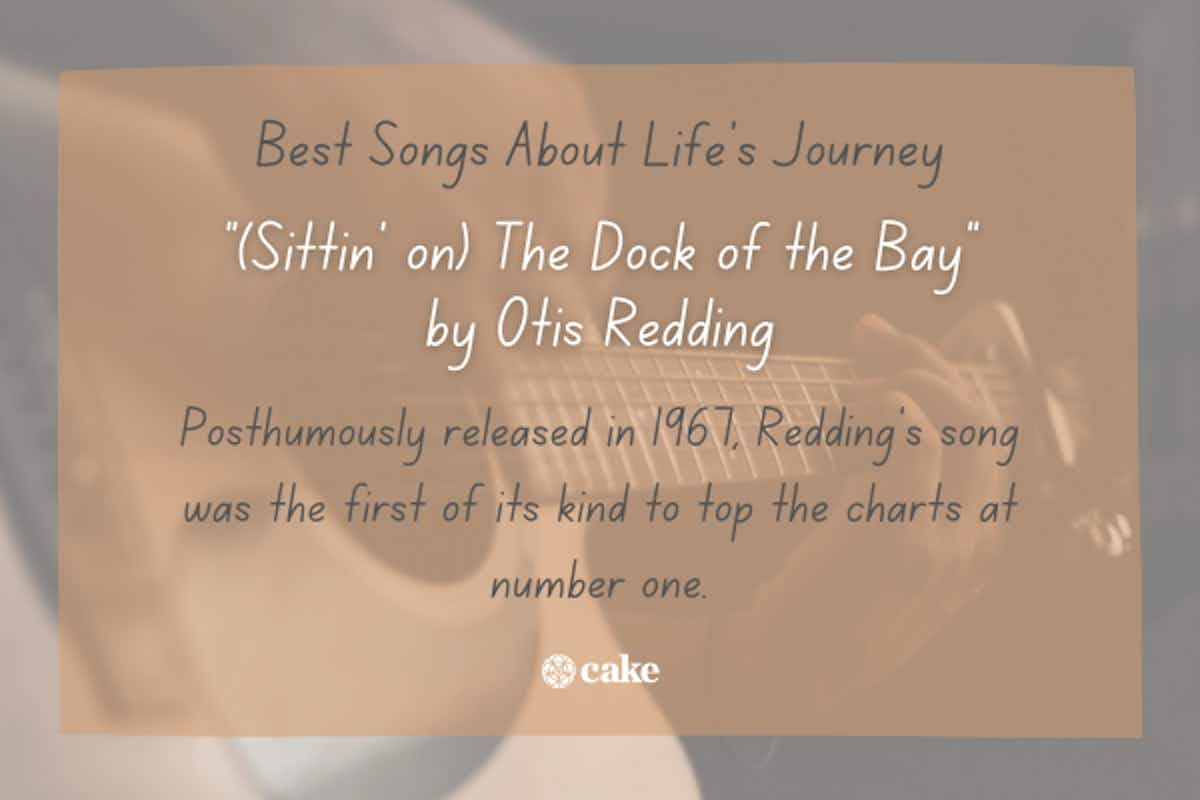
Below are a few artists singing about the reflections and revelations made after taking journeys of the mind. Through their experiences, you’ll glean how these experiences lead to either affirmations or resolutions.
1. “One” by U2
While the meaning of the song is ambiguous, it’s nonetheless about relationships, whether they are political, social, or familial. The singer reveals that what is vital in life revolves around us all supporting one another and living life to the fullest .
2. “(Sittin’ on) The Dock of the Bay” by Otis Redding
Posthumously released in 1967, Redding’s song was the first of its kind to top the charts at number one. For six weeks after vocal cord surgery, he was forced to sit outside his temporary home—a boathouse in Sausalito—recovering and reflecting on the life that brought him there.
3. “Harvest Moon” by Neil Young
The full moon has been significant for Young’s decision-making, meaning that he would often decide to join projects guided by its presence. His long career now includes numerous environmental advocacy roles.
4. “Yesterday” by The Beatles
One man’s journey comes to a standstill in “Yesterday” as the subject of the song chooses to live in the past rather than move on after a breakup. He needs time to mourn a significant loss.
5. “Husavik” by Molly Sandén and Will Ferrel
This Icelandic-English song is about a partner who realizes that her journey no longer includes following her love interest—it’s at home. No longer will she give up her heart to follow the dreams of another, but she needs him to see that it’s his home, too.
Experiences and dreams mandate one’s path in life. No matter what happens, hope is the underlying vehicle for change.
6. “Náttúra” by Björk
“Náttúra” has two meanings. The first is about environmental preservation, while the second is about convincing others to adopt the same mindset. This change in behavior is what Icelandic artist Björk hopes to achieve through protesting pollution while promoting Icelandic heritage.
7. “Redemption Song” by Bob Marley & The Wailers
Bob Marley dedicated his life to the Rastafari movement, relief for the socially deprived, and living a life that was true to himself and his beliefs. For these reasons, Marley is an icon in the African diaspora fighting for rights and truth. That makes this one of the top albums to listen to before you die .
8. “Season of Wither” by Aerosmith
You’ll come to this song at different times in your life, and with a different take on its meaning each time. But, because it’s almost so foreboding by nature, you won’t be able to help but choose the worst parts of your life on which to reflect.
9. “Sweet Sixteen” by Billy Idol
When love turns to obsession, there’s no other song that competes. Idol’s interpretation of one man’s lifelong plight to retrieve a lost love highlights how passion turns into addiction. That compulsion is now the famous Coral Castle located in Miami-Dade County, Florida.
10. “A Change is Gonna Come” by Sam Cooke
Civil rights, the search for equality, and desegregation are fluid thoughts within this song. Although Cooke may not have been alive to see the changes, his song resonates with communities on the paths toward better tomorrows. It’s truly an inspirational song .
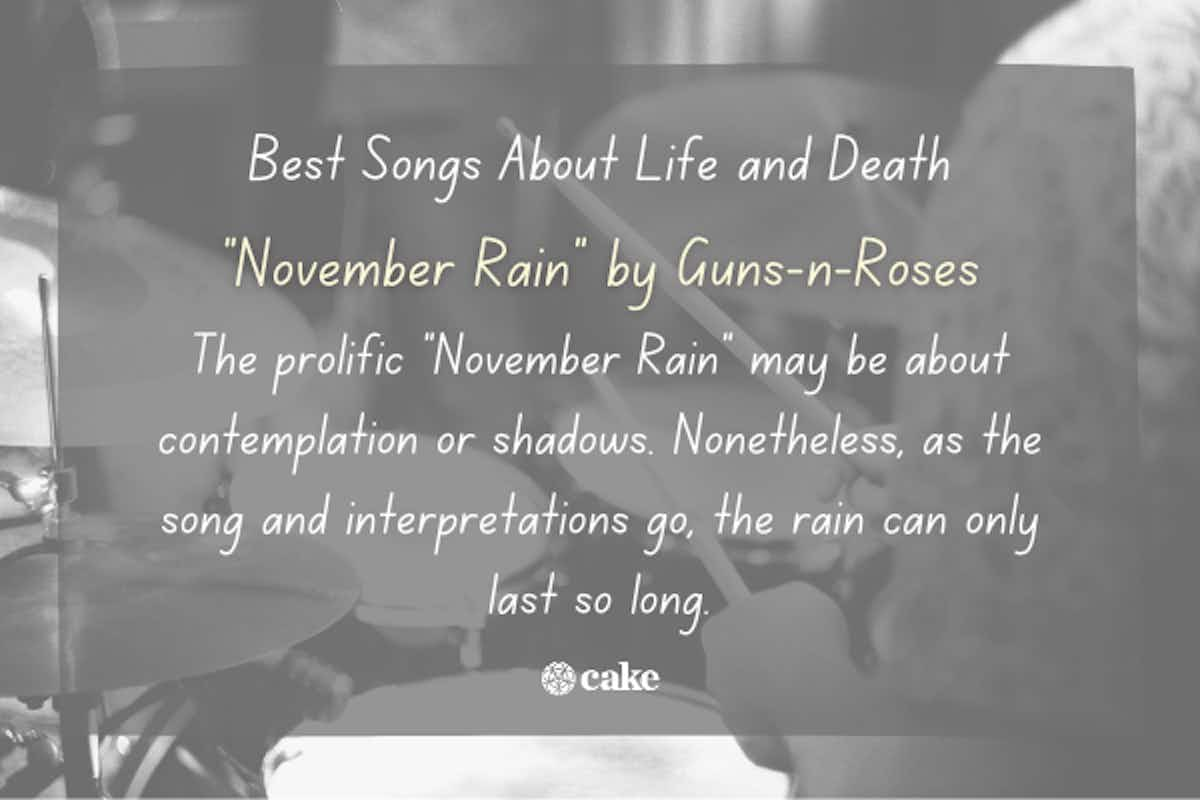
Both in fictional and non-fictional references, songs about life and death take hold. Below you’ll discover ones that match truth and circumstance against the backdrop of stories told with creative license.
11. “Who Wants to Live Forever” by Queen
Queen was commissioned to write and perform this beautiful song for the original Highlander film starring Christopher Lambert. In it, Lambert’s character must say goodbye to his true love, knowing he’ll outlive any lover now or in the future.
12. “Buffalo Soldier” by Bob Marley & The Wailers
The Buffalo Soldiers were African Americans fighting against Native Americans during the Indian Wars from 1866 to the 1890s. Marley’s song reveals the protest and subjugation of people being forced to kill and create a subjugated people.
13. “Lithium” by Nirvana
Lithium is a drug used by doctors to help prevent the risk of suicide. The song is about a man who finds god amid suicidal thoughts. Tragically, Nirvana’s lead singer committed suicide not many years later.
14. “November Rain” by Guns-n-Roses
The prolific “November Rain” may be about contemplation or shadows. Nonetheless, as the song and interpretations go, the rain can only last so long.
15. “Ebony Eyes” by The Everly Brothers
In the fictional song, “Ebony Eyes,” the story unfolds with a marriage prevented by a plane crash, flight 1203. While the song was banned from the UK radio for being too upsetting, it reached 8 th in the pop charts here in the US.
Because life is categorized by individual experiences, songs that can resonate with your personal experiences will be diverse. Considering that, each of the artists below has a unique way of conveying life with meaning.
16. “Yellow” by Coldplay
Commitment and sacrifice are inherent in the lyrics. That devotion has less to do with love and more to do with humanity as a whole.
17. “Good Times” by All Time Low
Creative exploration of one’s life isn’t without the “bare-knuckle” recognition of a recent past. It’s also an appreciation of how one’s past helps them find the nerve to move forward into a life unknown.
18. “I Lived” by OneRepublic
Gut-tethered, honest lyrics pay homage to a fan with cystic fibrosis. The words conjure an ambition to live past one’s limitations and create a life worth living.
19. “Float On” by Modest Mouse
The song reflects on the idea that no matter how much pain or strife comes at you, there’s an absolute truth to living. No matter how heavy the events seem right now, things will eventually get better.
20. “Running with the Wolves” by Courtney Jenaé and Adrian Grahn
This super short tune on the “Eurovision” soundtrack has a distinct theme of wolves and pack running. The underlying theme rests on finding a space where you belong among people that accept you for who you are.
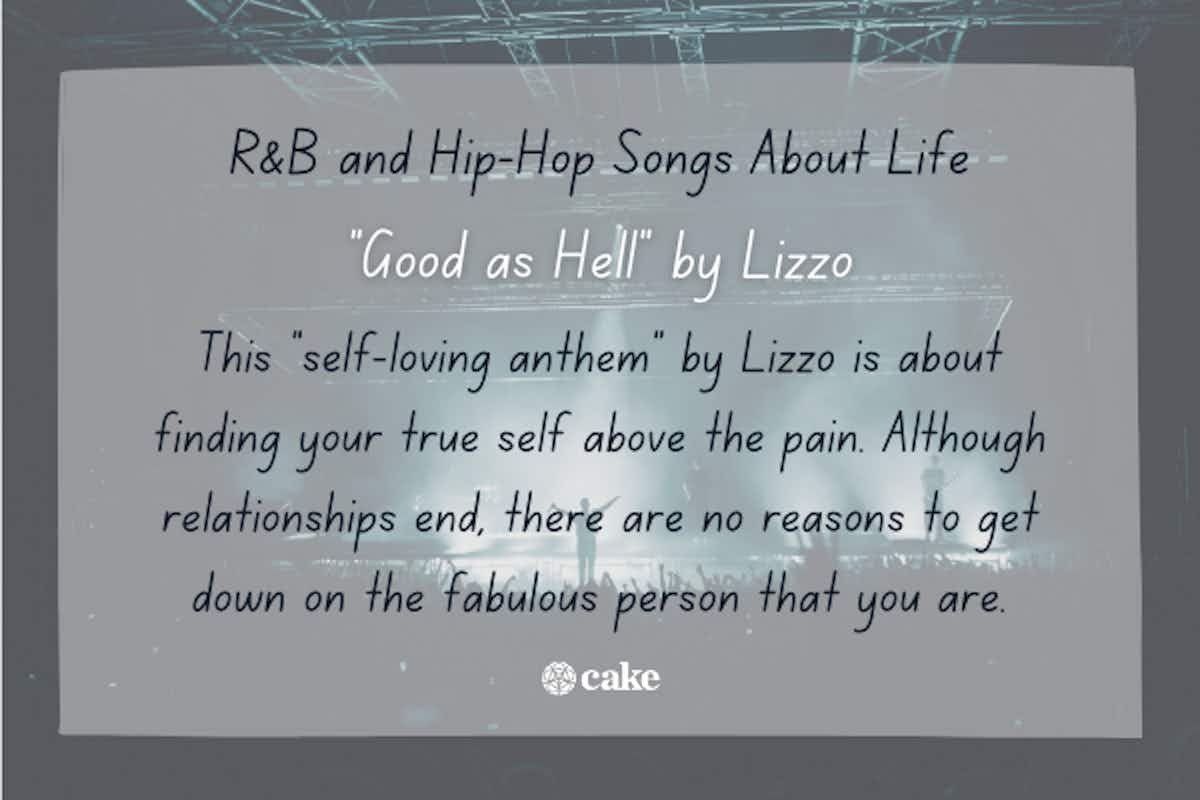
The few songs below are about resolution and strength. Sometimes in the journey of the mind that brings you there.
21. “Good as Hell” by Lizzo
This “self-loving anthem” by Lizzo is about finding your true self above the pain. Although relationships end, there are no reasons to get down on the fabulous person that you are.
22. “7 Years” by Lukas Graham
This piano-led song leads the listener down a path of remembrance. In it, you’ll discover that achieving great things requires that you bring your whole self along the way.
23. “Just Fine” by Mary J. Blige
Blige sings that no matter what is happening in life, or how wild it seems, as long as you’re positive and doing everything you want to do, everything will be just fine.
24. “Soldier of Love” by Sade
A trumpet and snare drum engage the listener from the onset. Then the lyrics invite you into a world where the singer is an expert on love. She knows her journey is to remain steadfast in the goal of achieving all things related to life with respect.
25. “Not Afraid” by Eminem
If you’re looking for a king of life anthem, take a listen to Eminem’s “Not Afraid.” You’ll come to realize that it’s less about life’s little transgressions and more about being bigger than them.
The country songs below speak to the reflective journey. Everything you experience makes you who you are today.
26. “Life Changes” by Thomas Rhett
Rhett makes a case for being open to the circumstances as they come. That thinking has led him to find a wife, have three daughters, and enjoy a budding career. All of this has been the result of being open to love as it became available.
27. “The House That Built Me” by Miranda Lambert
Lambert’s song recognizes that returning home can help you remember who you are and also help with the healing process on this short road of life.
28. “Letter to Me” by Brad Paisley
Paisley's song reflects on the idea of writing a letter to your younger self. He also understands that fatherhood can give you a second chance to make things right.
29. “Fifteen” by Taylor Swift
First loves are going to happen with or without a happy ending. Swift's song doesn't just come from that angle, though. She also begins with the idea that you can't take everything so seriously in life.
30. “Springsteen” by Eric Church
Some people merely exist in our lives fleetingly or because their presence was triggered by a circumstance. That said, they still have value, because without them, you wouldn’t be the person you are today.
This selection of songs about life's struggles includes success, home life, relationships, and becoming who you're meant to be.
31. "On Top of the World" by Imagine Dragons
"On Top of the World" is a personal, reflective song for the Imagine Dragons members due to the many years it took to find success. Some of the members even struggled through difficulties like divorce and depression, which only add to the depth of the song.
32. "Fighter" by Christina Aguilera
Aguilera wrote "Fighter" in response to a chaotic childhood as a means for catharsis. Rather than dwell on the journey, she instead found transcendence out of the pain, making her stronger.
33. "Go the Distance" by Roger Bart
"Go the Distance" was written for the Walt Disney animation Hercules. Sung by Roger Bart, it's the overview of the hero's journey to restore his godhood.
34. "Titanium" by Sia, David Guetta
Words, "bullets," a haunted love, sticks, and stones are no match for Sia as she reminds the unnamed person that he can't and won't get to her no matter what he tries.
Sia is known for her electro and indie-pop style, with this song being no exception.
35. "(I Keep on) Rising Up" by Mike Doughty
Attraction to the wrong person is undoubtedly a struggle for many. In this song, Mike Doughty reminds his ex he’ll keep getting back up no matter what she throws at him to keep him down.
36. "Reason to Believe" by Karen Dalton
This 1966 acoustic song from Karen Dalton is about the doubt one partner can cause in the other. The constant gaslighting and lying do something to them, but it's never healthy or good.
This one has the rawest, most bluesy vibe of the songs listed here.
We’ve chosen songs about life’s lessons, calling to relationships, climbing toward success, and overcoming adversity.
37. "Survivor" Destiny's Child
Beyoncé, from the iconic Destiny's Child, wrote "Survivor" in response to the critics giving terrible press to the group after it went through multiple members in under a year.
She embraces the criticism as a tool to create what would be the group's defining moment.
38. "I Am Moana (Song of the Ancestors)" by Auli'I Cravalho and Rachel House
Written for the eponymous movie, “Moana,” the song heralds the ancestry of a young girl on a mission.
She discovers that her internal strength stems from generations of great people who are her ancestors.
39. "Firework" by Katy Perry
Katy Perry based the inspiration for “Firework” on a Jack Kerouac book and her husband at the time, but it’s become a kind of epitaph for how she’d like to go out.
Overall, it’s an anthem for living, for being far from anything commonplace. Instead, it’s about being so amazing that people are in awe of you.
40. "What Doesn’t Kill you (Stronger)" by Kelly Clarkson
“Stronger” is about empowerment and overcoming adversity in relationships and life. Clarkson mentioned she wanted the music to be inspirational instead of telling a sad story.
41. "The Climb" by Miley Cyrus
In "The Climb," you may find resonance if you feel like life has been a series of mountain climbing moments, and you’ve constantly had to overcome struggles just to keep moving.
Notably, the lyrics remind the listener that there will always be another even after they reach one mountaintop.
42. "Perfect Strangers" by Jonas Blue ft. JP Cooper
Here’s an exciting song from British performers Jonas Blue and JP Cooper about not overthinking love. It’s about going with the flow, being open to the possibilities, and enjoying a shared space with someone while you have it.
Check out the section below for songs about embracing and living life fully.
43. "Hall of Fame" by The Script, Will.i.am
In short, the theme of “Hall of Fame” is to follow your heart and leave the drama of fame behind. That includes money.
More than that, it’s about being present in your life — no matter what occupation, dream, or desire.
44. "Closer to Fine" by The Indigo Girls
“Closer to Fine” has some great advice about being okay in life’s disarray. One can walk in the unknown, live in constant seeking, and not find the definitive answer in any one specific location.
Sometimes the journey of finding and looking for answers is sufficient for life and living. At least you know you’re trying to get there — wherever “there” is.
45. "Wake Up" by Arcade Fire
“Wake Up,” like most songs from Arcade Fire, is full of typical abstract ideas, metaphors, and more significant meanings.
Ultimately, the song travels from innocence to acknowledging mortality.
46. "We Are Young" by Fun.
Everyone has a moment in time they relive over and over again with their friends. “Do you remember that one time…”
It happens when you’re young, carefree (or too carefree), but you live in that moment like it’s the most vital moment — until the next one comes along.
47. "The Nights" by Avicii
Avicii wrote “The Nights” in honor of his dad, who said, "One day you'll leave this world behind. So, live a life you will remember." He encouraged his son to travel, experience life, and find adventures away from home and far-off places.
In retrospect, the advice was bittersweet, given the singer died before his time.
Note the gentleness of the lyrics in each of the songs below where, except for one piece, the music is mellow.
48. "Float On" by Modest Mouse
In contrast to this band's more somber music, Modest Mouse’s “Float On” is a song about reassurance.
Bad things happen, as they always do, but things will always get better. It’s not always easy to find this perspective, but it’s generally a reasonable condition of bad events to eventually find oneself on the other side.
49. "Blackbird" by The Beatles
Paul McCartney wrote “Blackbird” in response to the race riots of the 60s in the US. His ambition was to give people hope in a dark time of fighting for civil rights.
Still, the singing works for a funeral because it’s about leaving, flying away into the night, and arising into a specific moment or space in time. The music is uncomplicated, too. It’s simply McCartney’s voice accompanied by an acoustic guitar.
50. "Good Old Days" by Macklemore, Kesha
You’ve probably heard some people say how even the tough days are the days you look back on.
They’re the ones that are incredibly difficult to get through while they’re happening, but time and memory heal the wounds, leaving you with something better than the pain.
51. "Do You Realize" by The Flaming Lips
The truth is that everyone will die, and that’s what the songwriter wants you to know. But more than that, he wants to live.
To live for today, tell people you love them, and just be present in everything you do — know the time you have on Earth is finite, but you can do nothing except be grateful for the time you have.
52. "Sing a Song for You" by Tim Buckley
Tim Buckley’s song is devotional at its core. Layered atop is a longing for someone, but, more so, it’s about being so utterly enamored with a love that encompasses everything you are.
They’re your breath, your life, and your reason for living.
Celebrating Remarkable Journeys
It’s not easy to find fitting songs to celebrate someone because of all the complex histories and journeys they’ve lived throughout life. But hopefully, you’ve found several here that you.
Categories:
- Funeral & Memorial Songs
- Songs About Grief
You may also like

75+ Popular Inspirational Songs to Keep You Going

80+ Songs About Friendship & Memories

30+ Popular Songs About Finding the Meaning of Life

60+ Moving Songs to Listen to When You’re Sad

The Ukrainian borderland has long been a place where cultures merge and interchange. Now it is again a place of combat.
Through relentless loss, it is being transformed, possibly forever, into a treacherous and abandoned gray zone.
What was once a shared way of life, and faith, is dwindling.
Getting even daily essentials to the few who remain is a dangerous struggle.
Between the Offensives: Images From a Journey in Ukraine’s Borderland
Photographs by David Guttenfelder
Written by Peter Robins
David Guttenfelder traveled along Ukraine’s northeastern border twice in the months before Russian troops again poured through.
Leer en español
The invaders had not returned. Not yet. But along about 600 miles of Ukraine’s northeastern border territory that The New York Times visited late last year and again in the early spring, the war has never left.
Much of this area, in the Kharkiv and Sumy regions, was farmland once. Now a farmhouse hosted a counter-saboteur unit — made up of anti-Putin Russians, to avoid sending Ukrainian troops into Russia — preparing before dawn for a cross-border raid.
The fields are far too exposed to Russian fire for anyone to try a harvest. Instead, they are sown with “dragons’ teeth,” concrete antitank barriers typically bound together with cables and threaded with razor wire.

In 2022, Russian troops rolled over this area and almost to the doorstep of major cities like Kharkiv and Sumy. Then, before the end of that year, Ukrainian forces pushed them back across the border.
Russian troops began a new offensive in the Kharkiv region last month. But these villages, within 10 miles of the border, were always in range of artillery fire.
Sirens cannot provide enough warning time for a bombardment from this close, and air defenses cannot repel it. Residents rely on deliveries of humanitarian aid, and the long, cold wait for supplies takes place under near daily shelling.
Bombing and drone attacks were already intensifying before the new ground offensive.
And Ukraine’s military was already transforming the landscape: new mazes of trenches and bunkers, more closed-off zones and vast fields and forests of land mines. At checkpoints, nervous soldiers flew drones to scan the approaching roads.
Soon, said the mayor of one village that lies within range of Russian artillery, there will be nothing to photograph but stray dogs and ruins.
The civilian government has struggled to provide supplies and basic needs or to persuade residents to evacuate fully. Schools teach remotely or inside underground bunkers.
The war is bringing stark change to an area where families often have members in both Russia and Ukraine and where a common faith and culture spread across the border. Even now, a border crossing has remained open for civilians in the Sumy region.
In the village of Richky, about seven miles from the Russian border in the Sumy region, Father Bohdan Oprysko, an Orthodox priest, said that after an increase in Russian attacks, very few people could attend services. Now, “It’s only on holidays, like Easter, that the church is full,” he said.
His two sons moved to Poland with their families before the full-scale war started in February 2022. He and his wife have resisted their urging to move abroad as well.
“It’s my hometown,” he said. “How can I go somewhere else?”
In some towns and villages, only a few people remained, largely women and older people with nowhere to go. Vovchansk, which became a battlefield again in May after Russian forces came over the border in the Kharkiv region, had about 2,000 residents by December, down from its prewar population of about 17,000. It had visibly deteriorated by the spring.
The scars of invasion and bombardment had rendered some reclaimed settlements uninhabitable.
Russia’s new push in Kharkiv began at perhaps Ukraine’s most vulnerable moment since the beginning of the full-scale war — its forces stretched, its store of weapons and ammunition depleted after months of delay by its most important supplier, the United States.
Now, more American aid is coming and Ukraine’s Parliament has changed military recruitment rules to try to recruit more troops. But Russia appears to be intensifying the pressure.
As they have argued recently for more leeway to fire American-made weapons into Russian territory, Ukrainian officials have pointed to further gathering of troops, including just across from the Sumy region.
Ukraine’s borderlands may be about to become more dangerous still.
Yurii Shyvala , Dzvinka Pinchuk and Oleksandr Chubko contributed reporting.
- Share full article
Advertisement

Johnny Depp turns 61- inside his private world, love affairs and journey to fatherhood
The pirates of the caribbean star is a father-of-two.
Known for his eccentric charm and iconic roles, Johnny Depp has captivated audiences since the 80’s with his magnetism.
Amidst a life of controversy both on- and off-screen, the devoted father of two and Academy-Award nominee has carved out an enduring career that most actors can only dream of, working with the likes of Tim Burton and Wes Craven, and playing beloved characters like Jack Sparrow and Edward Scissorhands.
As the Hollywood giant turns 61, HELLO! reflects on his fascinating life.
Johnny’s challenging childhood
Johnny was born in Kentucky in 1963 to John Christopher Depp and Betty Sue Depp, the youngest of four kids. Betty was a waitress and John a civil engineer, and the family moved around a lot until they eventually laid down roots in Florida in 1970.
Speaking to the jury during his legal battle against ex-wife Amber Heard , the actor spoke out for the first time about the alleged physical, verbal and psychological abuse his family suffered at the hands of their mother: “She had the ability to be as cruel as anyone could be, with all of us…she could become quite violent, and she was quite violent.”
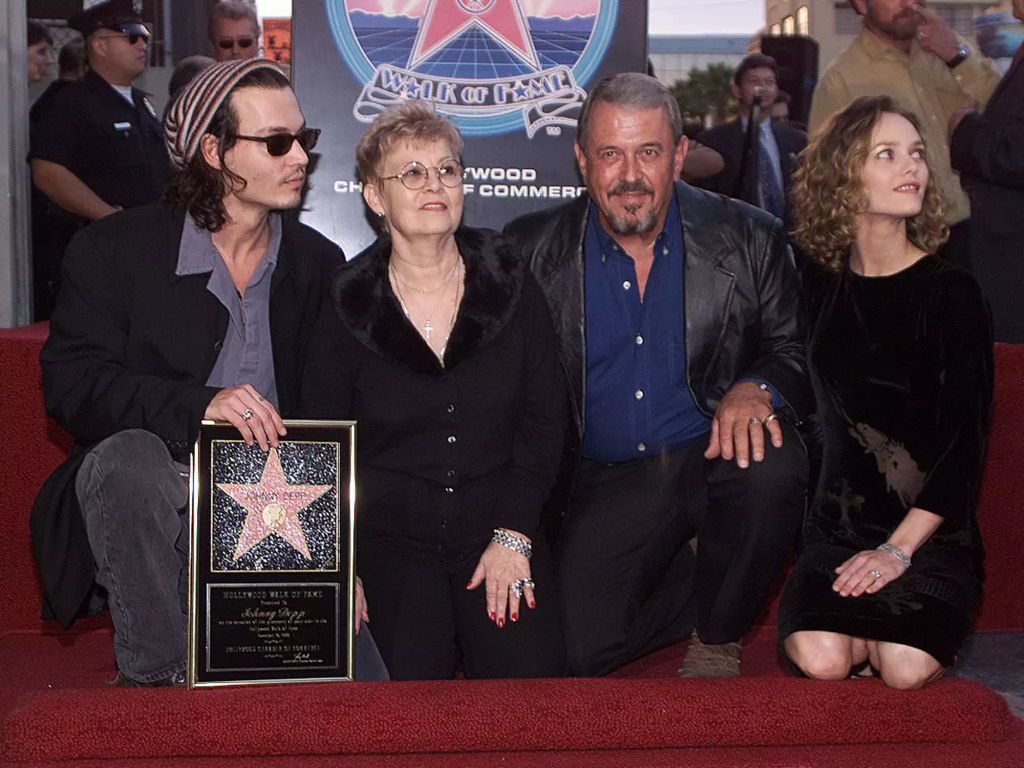
You may also like
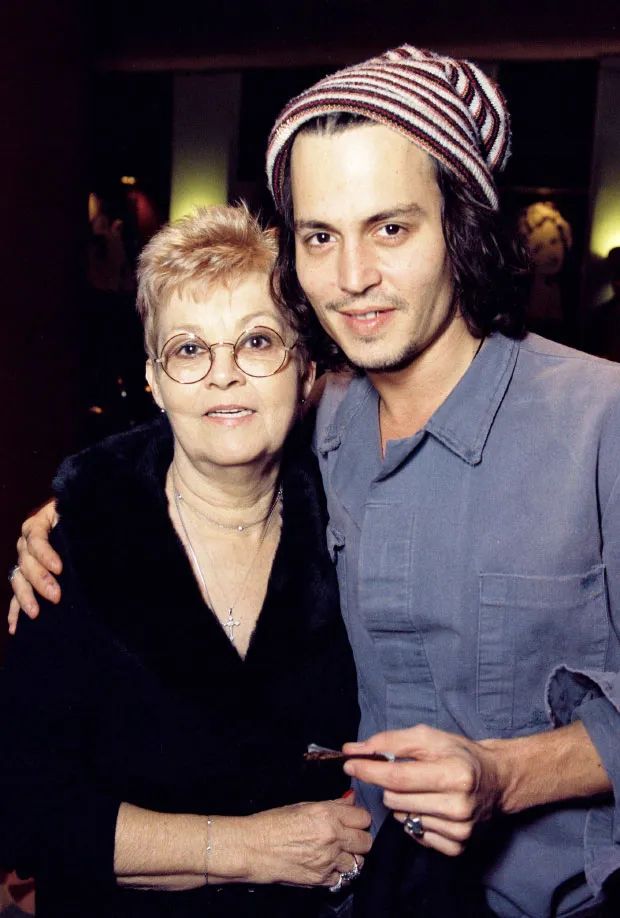
From Florida to Hollywood
Johnny’s career took off after starring in the iconic horror film A Nightmare on Elm Street, and other roles in Crybaby and ‘21 Jump Street’ closely followed. He reached teen idol status after three years starring on the cop show, and reprised his role in a hilarious turn on the 2012 reboot alongside Channing Tatum .
Perhaps his most beloved role is that of the perpetually-drunk and mischievous Jack Sparrow in the Pirates of the Caribbean movies. For this role he was nominated for an Oscar, Golden Globe and BAFTA, and won a SAG Award for Best Actor.

Inside his tumultuous love life
The ‘21 Jump Street’ actor had multiple high profile relationships in the late 80’s and 90’s; he was briefly engaged to Dirty Dancing star Jennifer Grey , and to ‘Twin Peaks’ actress Sherilyn Fenn, and dated supermodel Kate Moss for three years before they called it quits in 1997.
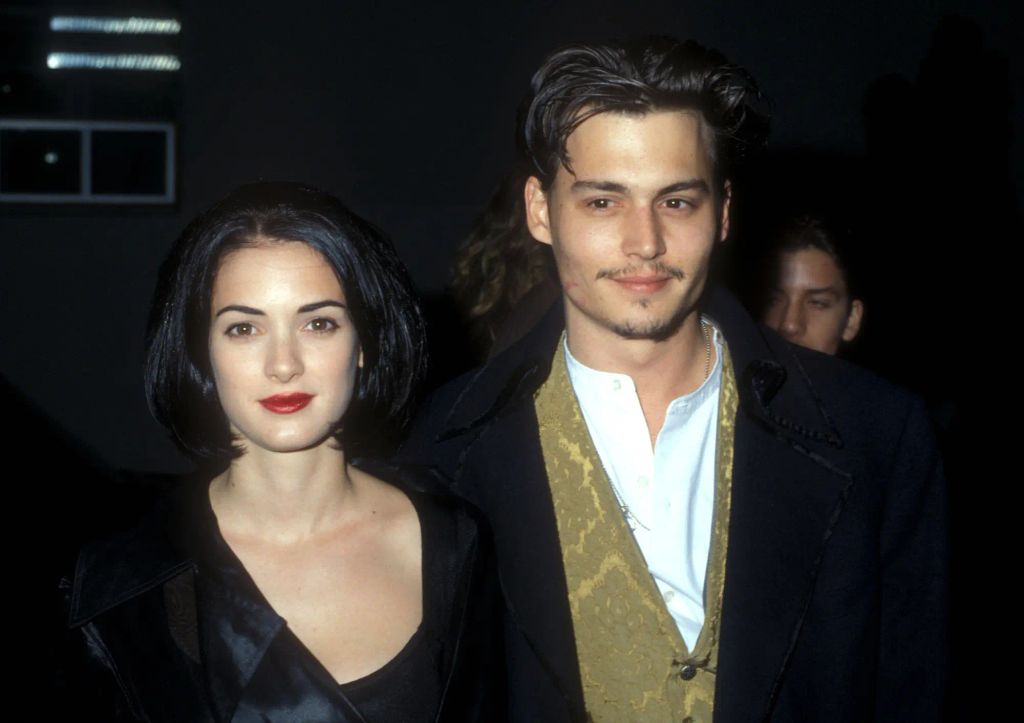
Johnny began dating his Edward Scissorhands co-star Winona Ryder in 1989 and got engaged after just five months together, controversially when Winona was only 17 and Johnny was 26. The couple broke up four years later, but she wrote a character statement for him during his legal battle, according to Business Insider .
“I truly and honestly only know him as a really good man - an incredibly loving, extremely caring guy who was so very protective of me and the people that he loves, and I felt so very, very safe with him,” she wrote.
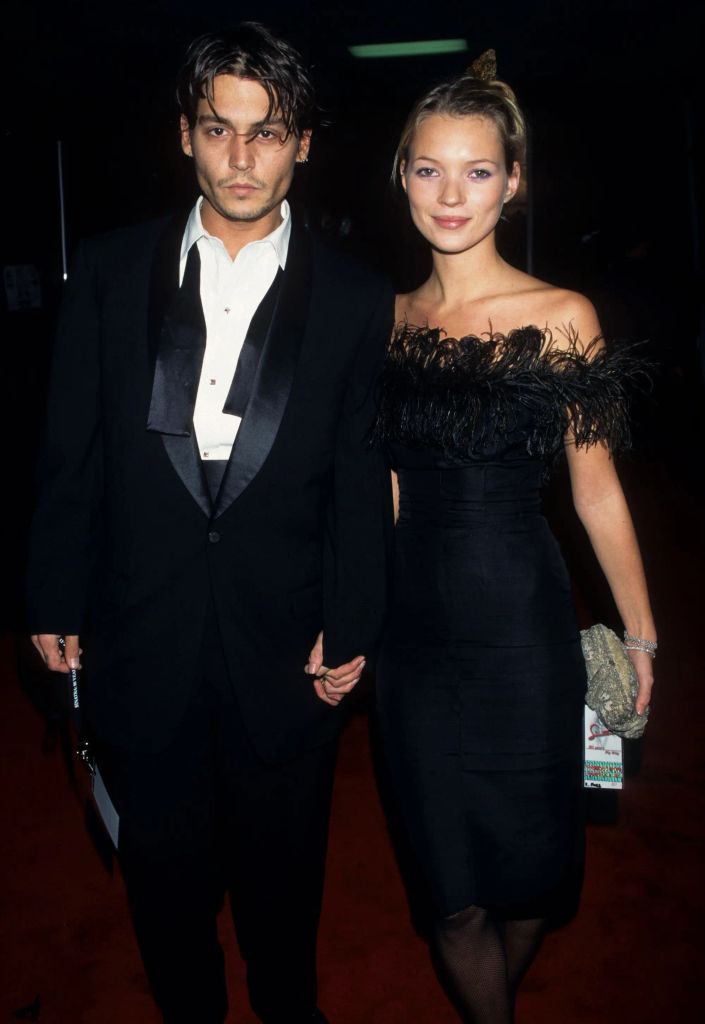
The joys of fatherhood
Johnny met actress and model Vanessa Paradis in 1998, and quickly fell in love with the glamorous French woman. They were partners from 1998 until their split in 2012, after years of cheating rumors dogged their relationship. Despite their breakup, Vanessa has also come out to defend Johnny during his trial, maintaining that he has always been “a kind, attentive, generous and non-violent person and father,” according to Business Insider .

Johnny’s daughter, Lily-Rose Depp, was born just a year after her parents met, and is an actress in her own right. She also models and became the face of Chanel at just 16-years-old. She has starred in Yoga Hosers alongside Johnny, The King with rumoured Beau Timothée Chalamet , and more recently (and controversially) in ‘ The Idol ’.

The HBO show which follows Jocelyn (Lily-Rose) as a rising pop-star who has a breakdown and becomes entangled with a club owner and cult leader, played by singer The Weeknd , drew heavy criticism for gratuitous sexual and violent scenes and director Sam Levinson’s “creepy” behavior. Johnny has shown support for his daughter during the backlash.

Johnny and Vanessa’s second child, John ‘Jack’ Christopher III , was born in 2002 in France and is much more private than his older sister. Jack stays out of the limelight but loves to play music- expand this more.
The Pirates actor spoke warmly of his son in an interview with Inquirer.net , saying that he “has always been a very talented draftsman. He draws super well. He also plays music very well.”
He further told Rolling Stone magazine in 2018 that he was over the moon when he learned Jack had started a band, stating: "That's my kid!"
Johnny also has a tattoo dedicated to his son. It shows a sparrow flying over the ocean with the sun in the background, with the name Jack tattooed underneath. The sparrow tattoo is similar to the one that his Pirates of the Caribbean character Jack Sparrow has.
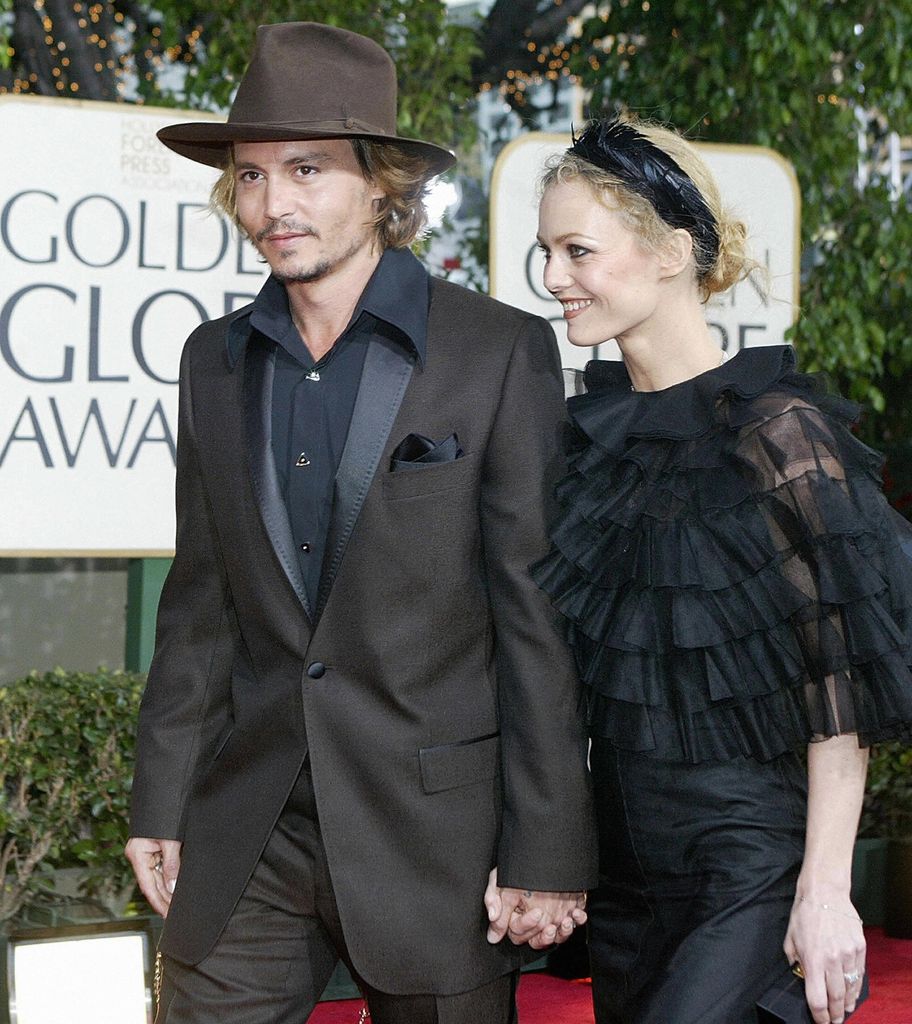
The siblings are incredibly close; Lily-Rose posted a heart-warming Instagram tribute to her brother on his birthday in 2020: “My little baby Jackie is 18…my baby bro my heart and soul happy birthday I love you SO MUCH!”. Jack briefly stepped into the spotlight in 2015 to support his sister at Paris Fashion Week.
Johnny cares a lot for his two children. Speaking in 2018 to GQ magazine in the wake of Amber Heard's abuse allegations he said: "I’m sure it wasn’t easy for my 14-year-old boy to go to school, you know what I mean? With people going, ‘Hey, look at this magazine, man. What, your dad beats up chicks or something?’
"Why did he have to go through that? Why did my daughter have to go through that?" he asked, clearly upset. During Johnny's trial in 2022, Jack remained out of the spotlight , as for the most part did Lily-Rose.
Lily-Rose spoke out in defense of her father’s legal battle at a Cannes Film Festival press conference in 2023, saying “It's always a little sad and disheartening to say mean false things said about someone you care about…it wasn’t reflective at all of my experience.”
Johnny Depp vs Amber Heard
The wasn’t a corner of the internet that hadn’t heard about the legal battle between Johnny and ex-wife Amber Heard in 2022. The controversy created an important conversation around domestic abuse and the general public quickly took sides.
The pair met in 2009 on the set of their film The Rum Diary, were dating by 2012 and engaged in 2014. They married in 2015, but Amber filed for divorce just a year later, citing alleged abuse which Johnny vehemently denied.
Then, in 2017, she came out in The Washington Post with a piece about how she was treated after her divorce, revealing, “I felt as though I was on trial in the court of public opinion – and my life and livelihood depended on myriad judgments far beyond my control.”

Johnny promptly sued her for defamation, a legal battle which revealed the inner workings of their tumultuous marriage and dragged all of their skeletons from the closet. Both sides alleged physical and psychological abuse, but ultimately the jury sided with Johnny and awarded him US $10.4 million in damages.
He shared a post on Instagram about his win, saying “six years later, the jury gave me my life back. I am truly humbled.”
Sign up to HELLO Daily! for the best royal, celebrity and lifestyle coverage
By entering your details, you are agreeing to HELLO! Magazine User Data Protection Policy . You can unsubscribe at any time. For more information, please click here .
- Celebrity Families
- Johnny Depp
- Celebrity Dads
- Celebrity Birthdays
More Celebrity News

Will Smith reflects on 'eternal impact' of Jackie Chan in helping 'raise' son Jaden in 70th birthday tribute

'He literally broke my heart into a million pieces' Chiara King on how heartbreak led to her success
In partnership with Pandora

Sean 'Diddy' Combs' son King shows off lavish 26th birthday celebrations one week after home raids
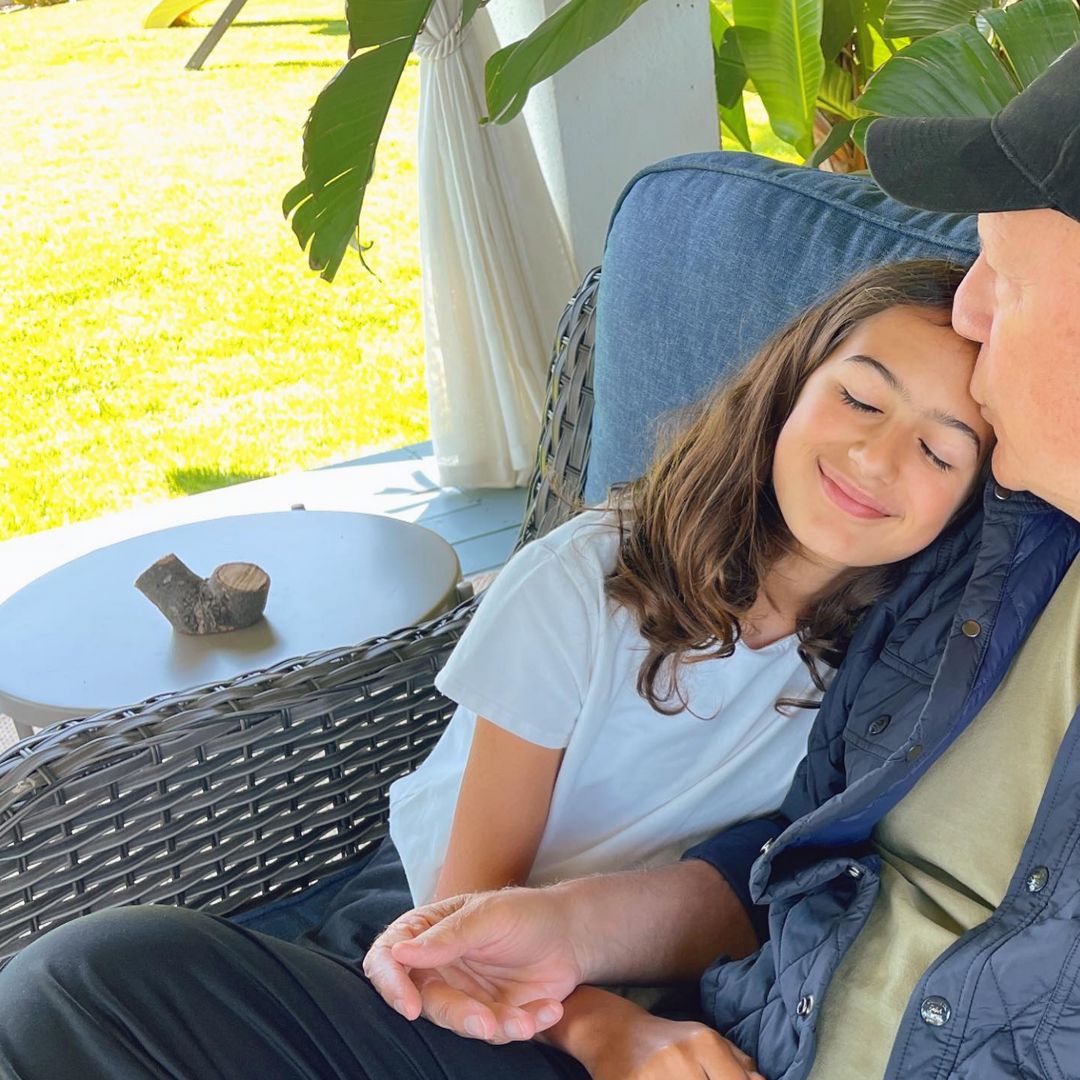
Bruce Willis' wife Emma Heming shares rare videos of daughter Mabel in honor of 12th birthday: 'Keep shining'
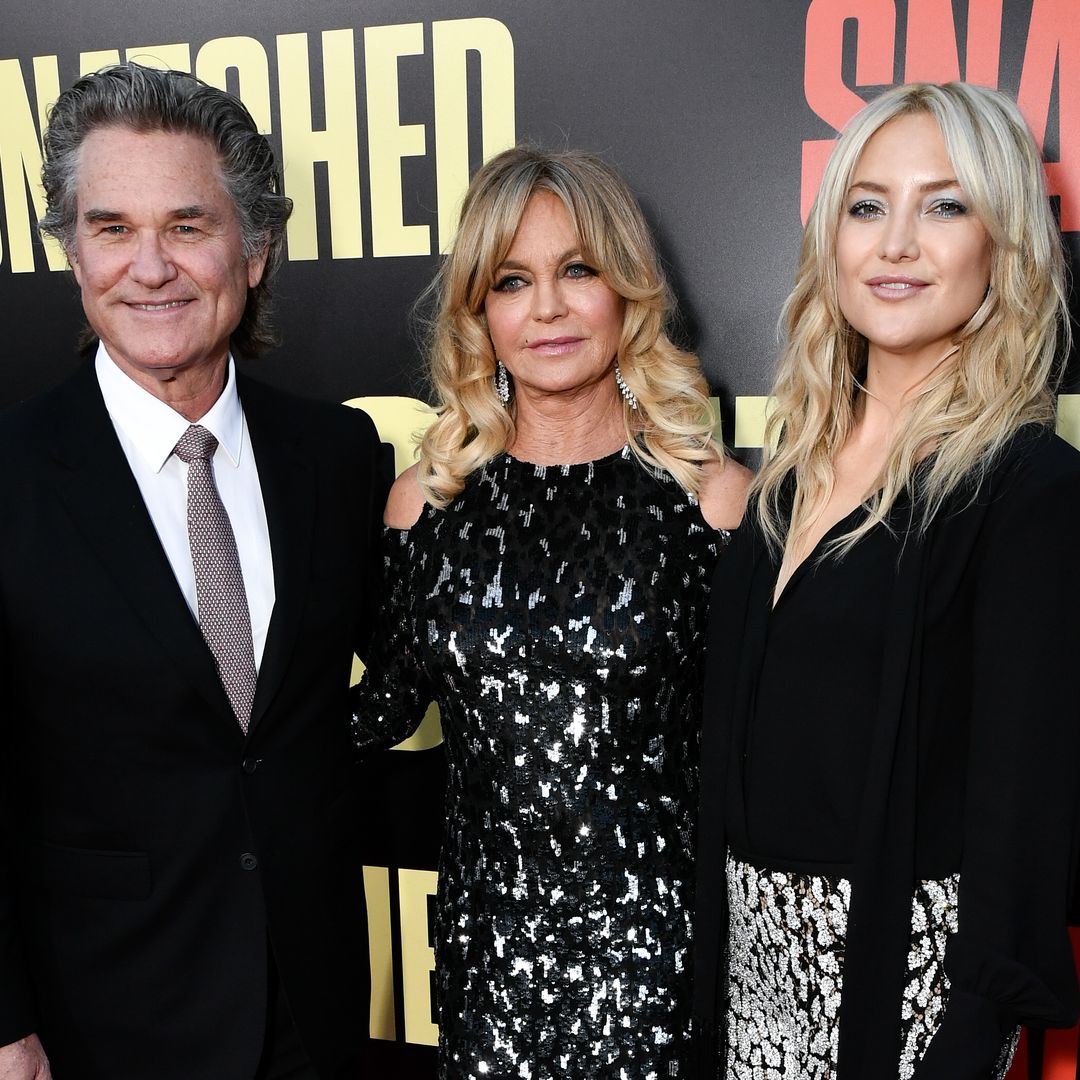
Kate Hudson shares sweet throwback with 'Pa' Kurt Russell in tribute for 73rd birthday: 'We love you'

George Clooney's sentimental 'tradition' for twins with Amal Clooney inspired by their love story
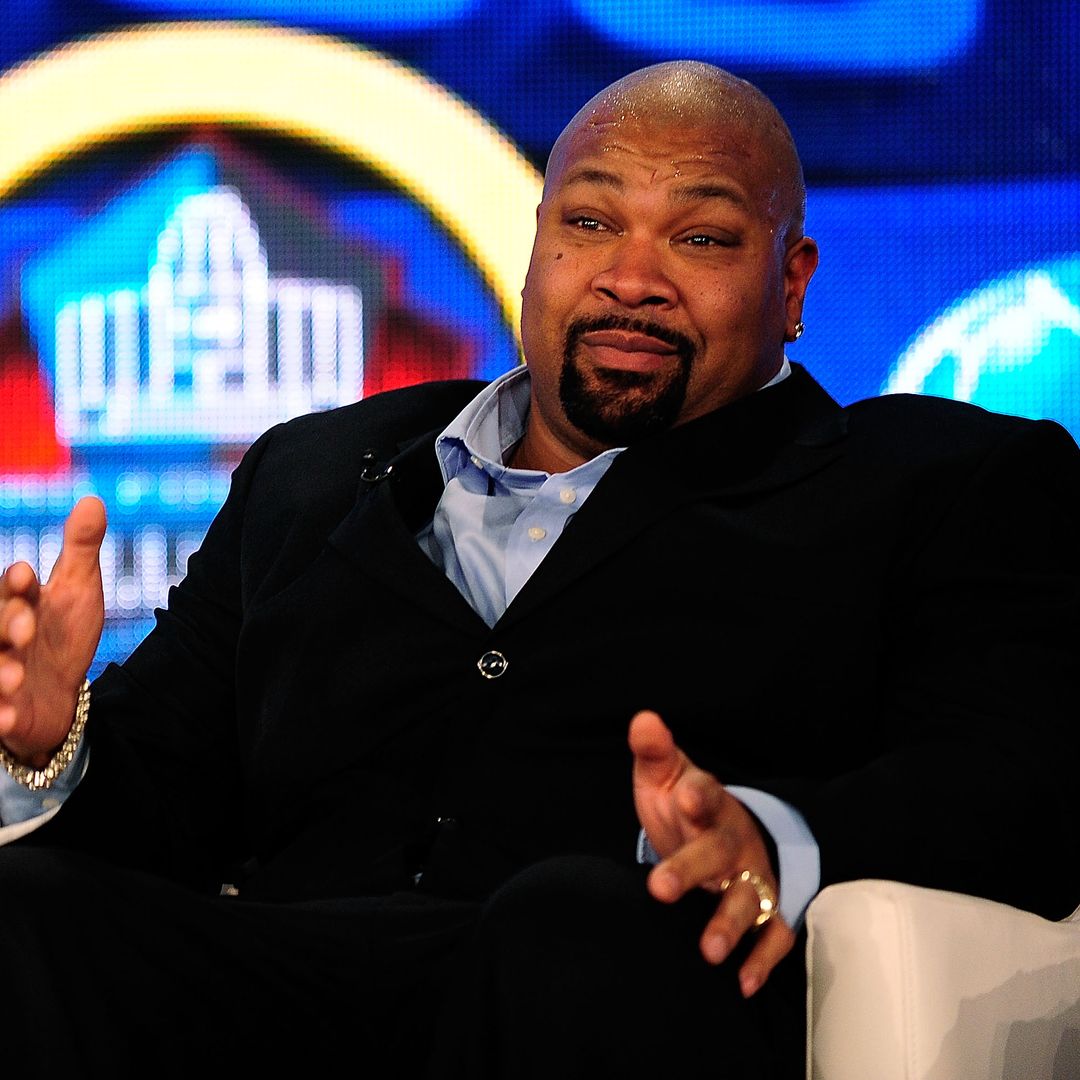
Legendary NFL player Larry Allen's daughter breaks silence on his sudden death at 52 during family vacation
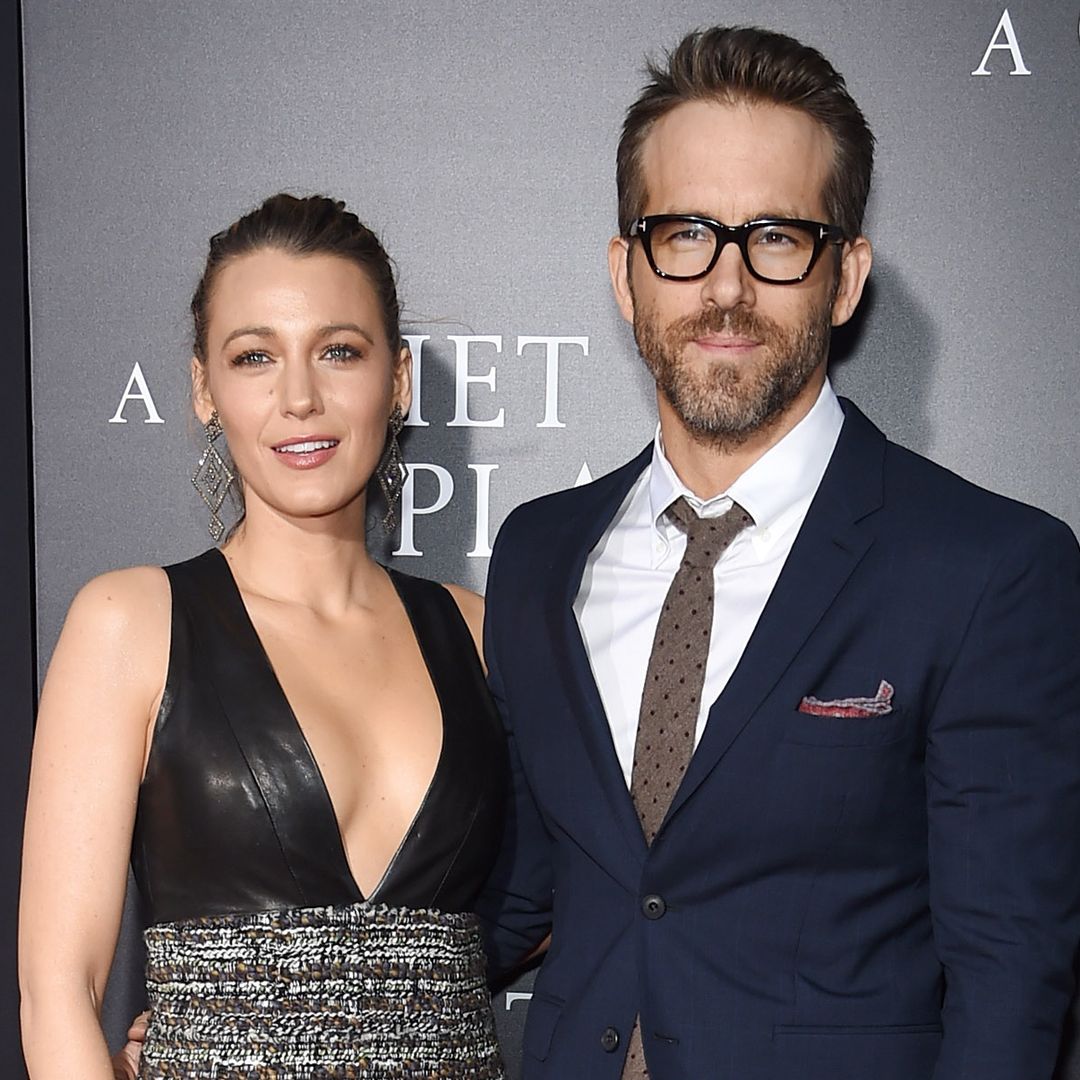
Ryan Reynolds makes candid confession about parenting four kids with Blake Lively
Tori spelling and ex dean mcdermott come together to celebrate son's 7th birthday with rare photos, jennifer lopez, marc anthony's twins max and emme are officially 16 see their best photos, christina hall's teen daughter taylor looks so tall in celebratory family photos with dad tarek el moussa and stepmom heather, larry birkhead gets 'trolled' by daughter dannielynn in sweet birthday pics, honors anna nicole smith's late son daniel.
Wendell Pierce Says a White Apartment Owner Denied His Housing Application: ‘Racism and Bigots Are Real’ and Some ‘Will Do Anything to Destroy Life’s Journey for Black Folks’
By Zack Sharf
Digital News Director
- Trump Lashes Out at Jeff Zucker as ‘Human Scum,’ Recalls Getting Denied $6 Million an Episode for Hosting ‘The Apprentice’ 3 days ago
- Dakota Fanning Reveals the Birthday Gift Tom Cruise Gives Her Every Year Since 2005’s ‘War of the Worlds’: ‘He Sends Me Shoes’ 3 days ago
- Michael B. Jordan Says ‘We’re Still Working’ on ‘I Am Legend 2’ Script and ‘Getting That Up to Par,’ but He’s ‘Really Excited’ to Work With Will Smith 3 days ago

Wendell Pierce revealed on X that an apartment owner recently denied his request for an apartment in Harlem, N.Y. despite his rock-solid income from various film and television roles over the last year and change. Pierce alleged that his application was rejected due to racism.
Related Stories
Summer movie meltdown math: years of box office data reveal discouraging trends, nicki minaj detained in amsterdam for alleged drug possession, claims 'sabotage', popular on variety.
Pierce, best known for his portrayal of Detective Bunk Moreland in HBO’s “The Wire,” is playing Perry White in James Gunn’s new DC Universe, starting with the 2025 theatrical release of “Superman” (formerly “Superman: Legacy”). Gunn has been filming the comic book movie in Atlanta.
The day after Pierce told his story about being rejected for an apartment, he shared a story from The Wall Street Journal on social media that covered an appeals court blocking an Atlanta-based investment firm from running a grant program for Black women.
“This is an act of institutionalized racism by the courts not seen in years,” Pierce wrote. “A stealth act of bigotry in the shadows.”
He elaborated on the topic in an interview with The Daily Beast : “It makes me sick motherfucker how far you will go to destroy our ability to live our lives in peace and prosperity. Attacked in schools, attacked by police, attacked for expecting to live the stated values of this country, and attacked when successful in business. We hold these truths to be self evident, that all men are created equal. For generations we have embraced that lie as the violence against our community proves otherwise. It’s getting harder to stay in denial, America.”
Read Pierce’s full post on the matter below.
For those of you who don’t understand my righteous anger; I’m on 2 TV series, ELSBETH and RAISING KANAN. I’m filming SUPERMAN. Two years ago, I finished the fourth season of JACK RYAN. Last year I finished a run on Broadway in DEATH OF A SALESMAN. Even with my proof of… — Wendell Pierce (@WendellPierce) June 4, 2024
More from Variety
‘gilded age’ star morgan spector joins jason bateman, jude law netflix limited series ‘black rabbit’, netflix, roku accelerate streaming momentum in sports rights deals, netflix renews ‘the ultimatum’ and spinoff ‘queer love’ — and announces three new reality series, ‘emily in paris’ season 5 role auctioned off in cannes, but netflix denies renewal, how generative ai has entered concept art creation — and why it’s a slippery slope, ‘minecraft’ animated series in the works at netflix featuring new characters, more from our brands, see taylor swift debut ‘the bolter,’ ‘crazier’ live at edinburgh, scotland show, patek philippe is not happy sylvester stallone flipped that $5.4 million grand master chime, mlbpa seeks to export union power with oneteam joint venture, the best loofahs and body scrubbers, according to dermatologists, stuck in a dead-end relationship with love is blind try showtime’s couples therapy, verify it's you, please log in.
Jelly Roll and Wife Bunnie Xo ‘So Excited and Scared’ About Their IVF Journey
The country music singer and his wife are hoping to add to their ‘perfect family’ in the next two years.

Jelly Roll and his wife Bunnie Xo are taking steps to expand their family one more time. In the Tuesday, June 4, episode of the “Bussin’ With the Boys” podcast , Jelly Roll, 39, shared the personal news that he and his wife are having discussions about having a child together.
“My wife and I are talking about having a baby and it really made me realize, at almost 40, I was like, ‘That means I gotta live til at least 60. I gotta see this kid into college,’” the “Need a Favor” singer shared while also discussing the motivation behind his weight-loss journey. “I thought that every problem I ever had in life would be solved if I ever found any kind of success and stability. And then I started to get success and stability and still none of those problems are solved.”
The country artist continued, “My plan was never to be 60. It was to be, like, 55. But now I’m like, ‘Well, I’d like to see my 60s.’ You know what I mean? And that really lit it up.”
In a separate social media post, Bunnie Xo, 44, added to the conversation and confirmed she has been meeting with IVF doctors and “exploring all our options to add to our family.”
“We had planned on doing this privately, but decided our IVF journey needed to be shared because we’ve always been so open,” she wrote via Instagram . “And w/ all the odds stacked against us, it’s already been hard & we have only just begun. J & I are so excited & scared all at the same time.”

While Jelly Roll is already dad to Bailee Ann, 16 and Noah Buddy, 7, from previous relationships, the idea of having his own child with Bunnie Xo is now a possibility.
“We genuinely never thought we’d want to add to our family but something changed this year,” Bunnie Xo explained. “We both just want a piece of us together to add to our already perfect family with Bailee & Noah.”
Jelly Roll and Bunnie Xo’s love story began in 2015 when they met at a concert. The couple got engaged in 2016 and got married the same day at a Las Vegas chapel.
“Flowers, posts, love letters, etc is a constant in our relationship,” the singer shared via Instagram when celebrating Valentine’s Day in February. “But I will never miss an opportunity to show this beautiful woman off.”

7 Steps to Create a Roadmap for Your Life
How to effectively navigate any major life change..
Posted March 30, 2022 | Reviewed by Ekua Hagan
- The archetype for life is the journey. The roadmap helps chart the trip through change and transition.
- A roadmap helps a person visualize their life—where they have been and where they want to go.
- Learning how to navigate change and transition will help one gain control of life's circumstances.
Since the archetype for life is the journey, a roadmap will help you plan your life moving forward much as you would prepare for a trip. Charting your trip tells you where you’ve been so far, where you intend to go, what obstacles you may face, and the places you keep returning to over and over again.
Our journeys are both inner and outer. The events of the outer journey, the cumulative transitions of a lifetime, will be somewhat similar for all of us who share the human experience. Our personal inner journey is a much more private affair. The roadmap is a reliable context within which to place your very own experiences and transitions.
The nature of life is change and all of us will make many changes and go through numerous transitions as we live life. Nothing stays the same and neither do we. So much colors who we are and who we are to become. Knowingly or not, we move into new and different phases that connect us socially and emotionally to others who are going through the same phase.
But beyond the normal changes we will encounter, there will be those changes and transitions we did not expect, did not prepare for, did not want to happen. How do we cope with encounters and transitions that are difficult, challenging, and often overwhelming?
One way is to learn to be prepared for whatever comes your way. How do you do that? Well, experience will be a great teacher. Once something has happened to you, it will no longer be an unknown. You will have learned something from it. But, it’s a lot easier if you have the tools to handle change and transition so you’re not surprised, so you’ll know what to do.
Here are seven essential steps to help you navigate through any change/transition you may encounter during the course of your life.
Have a realistic expectation. Before you embark on your next big change/transition, map your trip as best you can, knowing that things don’t always work out as you plan or hope they will. Know that things can go smoothly, or there may be delays, detours, and roadblocks. Be realistic about the timetable. Again, things may happen quickly or there may be delays, sudden stops, and sometimes re-routing before you reach your destination.
Review what you’ve learned about change . Each of your trips to a new place in your life has hopefully taught you something. It’s these cumulative events and your responses to them that help you navigate whatever happens to you moving forward. What you’ve learned and how to respond will help you make the best possible choices and decisions.
The exception to that, of course, is an event that places you in imminent danger, such as a life-threatening illness, unexpected personal crisis, or natural disaster, where you have no choice but to take immediate action. In that case, once the necessary actions have been taken and the dust finally settles, you can then go back and review, in order to figure out what the change/transition meant and what to do next.
Create a Life Timetable. This timetable should reflect major life transitions. What events did you initiate on your own? In other words, what inner events caused you to make a change? What happenings were foisted upon you by life circumstances? In other words, what events happened to you from the outside; those events you had little control over? What were your “triumphs?" What were your losses? Pay attention to the main emotions for each of these changes/transitions. How did you react to whatever happened to you?
Do you view each major event in your life in a positive light—you got something out of it? Or, do you fear change because you believe the things that have happened to you have impacted you negatively?
Define your Life Themes. This goes well beyond charting the chronological order of events, the basic facts of your life. Themes are generally easily recognizable—they are recurring and repetitive. Positively, life themes help you define who you are and alert you to your purpose and passion. Developing insight into how you process life and what is most important to you can help you gain more personal control so that you can skillfully steer the course in the direction you want to go.

Get in touch with your Life Lessons. We all have them. Each of us has our own unique things to experience and lessons to be learned. Not one size fits all. Our lessons come from every single facet of our lives—our background, family, culture, religion, social group, education . Those influencers help us define who we are from birth. Some of us are fortunate enough to have been given life skills early on so that finding our way through life is made easier, while others struggle to find their way. But there is always the opportunity at any point in life to learn and receive guidance from those around you.
Where you choose to take yourself in life and who you choose to associate with will inevitably influence you greatly. Paying close attention to how you respond to life will help you become acutely aware of the life lessons that await you.
Go beyond limiting beliefs. Do you really know what you believe? We often assume we know what we believe to be true—but that’s often not the case. What we think is true is frequently colored by others’ opinions and influenced by those we admire and trust. As much as they may care about us, they may not always know what’s in our best interest. And too, often the actions we take and the choices and decisions we make are based on ideas and beliefs that no longer serve us, if they ever did. So going beyond limiting beliefs may pave the way for changing how you make transitions moving forward. Push through to beliefs that bolster your confidence and support your endeavors.
Accept the unknown. There’s so much we don’t know as we go through life. With as much planning as we’ll do to ensure our desired outcome, there will always be those times when all the planning in the world will not get us the result we want. Who knows why? But it happens. Consider the unknown your friend in life. When you accept what you can’t control, what you can’t do anything about, it becomes far easier to accept what does come and make it work for you.
As Rilke said so well, “Be patient toward all that is unsolved in your heart and try to love the questions themselves, like locked rooms and like books that are now written in a very foreign tongue. Do not seek the answers, which cannot be given you because you would not be able to live them. And the point is, to live everything. Live the questions now. Perhaps you will then gradually, without noticing it, live along some distant day into the answer.”

Abigail Brenner, M.D . , is a psychiatrist in private practice. She is the author of Transitions: How Women Embrace Change and Celebrate Life and other books.
- Find a Therapist
- Find a Treatment Center
- Find a Psychiatrist
- Find a Support Group
- Find Online Therapy
- United States
- Brooklyn, NY
- Chicago, IL
- Houston, TX
- Los Angeles, CA
- New York, NY
- Portland, OR
- San Diego, CA
- San Francisco, CA
- Seattle, WA
- Washington, DC
- Asperger's
- Bipolar Disorder
- Chronic Pain
- Eating Disorders
- Passive Aggression
- Personality
- Goal Setting
- Positive Psychology
- Stopping Smoking
- Low Sexual Desire
- Relationships
- Child Development
- Self Tests NEW
- Therapy Center
- Diagnosis Dictionary
- Types of Therapy

At any moment, someone’s aggravating behavior or our own bad luck can set us off on an emotional spiral that threatens to derail our entire day. Here’s how we can face our triggers with less reactivity so that we can get on with our lives.
- Emotional Intelligence
- Gaslighting
- Affective Forecasting
- Neuroscience
Screen Rant
Frieren cosplay brings anime's new most iconic elf to life with forest photo shoot.

Your changes have been saved
Email Is sent
Please verify your email address.
You’ve reached your account maximum for followed topics.
"We Were Too Early": One Piece Finally Explains A Key Pirate King Mystery
Akira toriyama's last quote before dragon ball's end is still powerful decades later, tower of god announces release date for anticipated season 2 of the anime.
- Forest photoshoot breathes new life into Frieren cosplay, highlighting model amidst natural beauty.
- Photographer bbditto showcases excellent contrast with outdoor setting, enhancing Frieren's presence.
- Frieren cosplay remains popular post-anime, with outdoor shoots bringing character to life and standing out.
The main character of Frieren: Beyond Journey's End , the powerful elf mage Frieren, is the subject of plenty of cosplay photography. The latest, uploaded online onto Reddit, does an admirable job of livening up the costume and prop by placing the model in an outdoor environment. The natural lighting brings out the best in the elf's features, if she were to appear in the flesh.
Photographs of the cosplay were uploaded to r/cosplay , under the account "bbditto", who identifies as the photographer of the images. While the costume and prop the model uses don't appear hand-made, the two have nonetheless put a simple and effective spin on the material with their choice of environment.
Either way, bbditto's excellent photos show that Frieren shows no sign of losing popularity in the cosplay community , who are intent on portraying the elf as she would in reality.
Frieren Comes to Life in Forest Photoshoot
Simple touches make excellent contrast that enhances cosplay.
Given the Frieren anime's popularity , it's expected that cosplay providers are supplying outfits and props for others to use, as seems to be the case for bbditto's photos, which include the elf's staff, built to a quality that looks shop-made. Even then, the fact of the matter is that, after just one season of the anime, Frieren has become the subject of regular cosplay . But in bbditto's case, the photographer shakes things up with the simple and effective change of just shooting outdoors amid greenery . Given that plenty of cosplays use darkened interiors for convenience or to control the lighting, this helps the live Frieren stand out more.
With Frieren's predominately white color scheme, the green background allows the model to pop out plenty for the camera, all the more so in the wider shot posted online. The forest imagery is also simply more interesting to look at with its shadows, trees, and white illumination. It just goes to show that when certain things are uniform, like outfit quality, what the photographer can affect does make all the difference. In another post , bbditto states that the photoshoot was part of a "duo", with the photographer herself editing her own cosplay of the Frieren character Fern for future release.
Bringing Frieren outside also helps give the impression of the character being more alive, as opposed to just showing off a costume in an enclosed space. Madhouse's adaptation has turned the series into a modern household name, and cosplays by bbditto and others show how popular the series will continue to be, even if a second season remains a distant dream for now. Until then, however, the ubiquity of dressing as the ageless elf will be the next best thing for many fans of Frieren: Beyond Journey's End.
Frieren: Beyond Journey's End
Frieren: Beyond Journey's End is an animated adventure-drama series based on the manga series created by Kanehito Yamada and Tsukasa Abe. Following her parties' victory against an all-powerful demon king that threatened to destroy their world, Frieren, an elf, attempts to find her place in a new world with an undetermined future fifty years later.

IMAGES
VIDEO
COMMENTS
15. "Learn to trust the journey, even when you do not understand it.". - Lolly Daskal. 16. "Life is a journey that have a lot of different paths, but any path you choose, use it as your destiny.". - Unknown. 17. "The beautiful journey of today can only begin when we learn to let go of yesterday.". - Steve Maraboli.
Meaningful Life is a Journey Quotes. "If you can't fly, then run. If you can't run, then walk. If you can't walk, then crawl. But by all means, keep moving.". - Martin Luther King, Jr. "Whatever you do, or dream you can, begin it. Boldness has genius and power and magic in it.". - Johann Wolfgang von Goethe.
24. "The journey becomes the destination when we embrace the moments in between." -Samya Chauhan. 25. "The journey of life is surprisingly beautiful if you take time to look around.". - Unknown. 26. "Our life's journey of self-discovery is not a straight-line rise from one level of enlightenment to another.
Life is not a project, but a journey to be enjoyed.". - Catherine Pulsifer. "The journey between what you once were and who you are now becoming is where the dance of life really takes place ...
Ask why before you ask how. Intention is required to create your compass. Action deflates fear - always. Recycle. Don't fix what's not broken. Reuse what's worked before. Trust your ...
31. "Life is really simple, but men insist on making it complicated." — Confucius. 32. "Life is a succession of lessons which must be lived to be understood." — Helen Keller. 33. "Your work is ...
29. "Life is a journey filled with unexpected miracles" - Unknown. 30. "Travel only with thy equals or thy betters; if there are none, travel alone.". - Buddha. 31. "Life is a journey that has a lot different paths, but any path you choose use it as your destiny.".
Taking the steps to find your life purpose. Finding your life purpose is a lifelong journey. It's OK to take it one step at a time. It's normal to pause and reevaluate long-term goals regularly ...
Finding meaning in life is a journey that could start with something as simple as a pen and paper, deep reflection, and one of our tools mentioned above. Or your journey could start by stepping out the door and connecting with a neighbor, making a newfound friend, or starting a hobby you have wanted to explore but never got around to.
Life Journey Quotes. Life is a journey. One that has twists and turns, highs and lows. With hopefully more of the good times though. The following compilation of goal quotes, while discussing life as a journey in itself - predominantly relates to the journey from setting a goal to achieving it - whatever that may mean for you.Because while setting a goal is exciting and lively, the harder ...
Rothschild - gia tộc giàu có bậc nhất thế giới phá vỡ lời nguyền "Không ai giàu ba họ". Nhiều năm trước, khi xuất bản một cuốn sách về lịch sử Do Thái, lúc duyệt bản in cuối, tôi thấy sốc khi đọc đoạn mô tả về gia tộc Rothschild...
Create your life handbook. Your life handbook is your life-long personal manual to live your best life - from your mission statement, your values, your long-term goals, short-term goals, personal strengths, blind spots to address, plans, among others. Create your book first then build on from there. Set your goals. After you design your ideal ...
26) "I tramp a perpetual journey."―. Walt Whitman. 27) "The real voyage of discovery consists not in seeking new landscapes, but in having new eyes.". - Marcel Proust. 28) "It's not the years in your life that count. It's the life in your years.". - Abraham Lincoln. 29) "Life is about waking up.
The first aspect of personal growth is focused on re-framing our struggles. What I mean by this is, the next time we face a problem, the best way to overcome it is to see it differently. For ...
21. "However difficult life may seem, there is always something you can do and succeed at." —Stephen Hawking. 22. "A human mind is a wandering mind, and a wandering mind is an unhappy mind ...
Life, a journey on time's endless stream, A dream, where past and future gleam. In the flow of years, moments shine bright, Light in the river's dynamic flight. 3. Mountain Ascent. Life's journey, an ascent of a mountain high, Sky-reaching peaks, under the open sky. Each step, an effort, a climb toward the peak, Seeking the summit, the ...
Develop Mental Toughness. Strengthen Your Willpower. Focus on Intrinsic Motivations. Set Achievable Goals. Nurture Traits Linked to High Potential. Cultivate Strong Social Support. Avoid Burnout. Success is often defined as the ability to reach your goals in life, whatever those goals may be.
3. Naturalism. Recall that naturalism is the view that a physical life is central to life's meaning, that even if there is no spiritual realm, a substantially meaningful life is possible. Like supernaturalism, contemporary naturalism admits of two distinguishable variants, moderate and extreme (Metz 2019).
A journey is a common metaphor for life as it reminds us that the destination is not our only goal. Like with any journey, there are times when the roads are straight and times when they are winding. This metaphor example helps us remember that there will be ups and downs and potholes along the way—times when life will feel easy and times ...
The journey is a deliberate effort to move beyond ourselves. We venture into unfamiliar territory to seek challenge and change, to find new answers and dimensions. Journeys free us from the bounds ...
The Message. 18-21 Your life is a journey you must travel with a deep consciousness of God. It cost God plenty to get you out of that dead-end, empty-headed life you grew up in. He paid with Christ's sacred blood, you know. He died like an unblemished, sacrificial lamb. And this was no afterthought. Even though it has only lately—at the end ...
She knows her journey is to remain steadfast in the goal of achieving all things related to life with respect. 25. "Not Afraid" by Eminem. If you're looking for a king of life anthem, take a listen to Eminem's "Not Afraid." You'll come to realize that it's less about life's little transgressions and more about being bigger ...
June 6, 2024 8:00 am ET. Listen to article. (2 minutes) Mountaineer George Mallory famously declared he would scale Everest "because it's there"—and in 1924 he died trying. Now, a decade ...
What was once a shared way of life, and faith, is dwindling. Getting even daily essentials to the few who remain is a dangerous struggle. Between the Offensives: Images From a Journey in Ukraine ...
Both sides alleged physical and psychological abuse, but ultimately the jury sided with Johnny and awarded him US $10.4 million in damages. He shared a post on Instagram about his win, saying ...
How to Apply This Principle to Invoke a More Joyful Life. Taking that lens and expanding the scope, imagine the potential power of applying that principle to one's life (i.e. training the brain ...
Wendell Pierce Says a White Apartment Owner Denied His Housing Application: 'Racism and Bigots Are Real' and Some 'Will Do Anything to Destroy Life's Journey for Black Folks'
Mike Vulpo. Jelly Roll and his wife Bunnie Xo are taking steps to expand their family one more time. In the Tuesday, June 4, episode of the "Bussin' With the Boys" podcast, Jelly Roll, 39 ...
The archetype for life is the journey. The roadmap helps chart the trip through change and transition. A roadmap helps a person visualize their life—where they have been and where they want to go.
Frieren: Beyond Journey's End is an animated adventure-drama series based on the manga series created by Kanehito Yamada and Tsukasa Abe. Following her parties' victory against an all-powerful demon king that threatened to destroy their world, Frieren, an elf, attempts to find her place in a new world with an undetermined future fifty years later.